December
Legume Legend
12/20/2017 Source: Office of Communication Services, CTAHR  Amjad Ahmad (TPSS) recently received funding of $40,000 from
the HDOA for a new legume project, “Evaluating Mechanical
Harvest and Agronomical Treatments to Improve Legume Crops Growth and Yield in Hawaii.”
Amjad plans to continue working on issues and questions that arose from his
previous, and promising, chickpea project. He also aims to produce value-added
products from chickpeas and has added two additional legume crops to his
research. He hopes his project will support local growers, the sustainability movement,
and food security in Hawai‘i...and looking at the success of his work so far, it already is! Amjad Ahmad (TPSS) recently received funding of $40,000 from
the HDOA for a new legume project, “Evaluating Mechanical
Harvest and Agronomical Treatments to Improve Legume Crops Growth and Yield in Hawaii.”
Amjad plans to continue working on issues and questions that arose from his
previous, and promising, chickpea project. He also aims to produce value-added
products from chickpeas and has added two additional legume crops to his
research. He hopes his project will support local growers, the sustainability movement,
and food security in Hawai‘i...and looking at the success of his work so far, it already is!
|
From CTAHR to Japan
12/20/2017 Source: Office of Communication Services, CTAHR  MBBE grad student Rob Oda has been awarded the
highly competitive Crown Prince Akihito Scholarship,
which he will use to study Raman spectroscopy in Japan for a year. A research assistant at the Hawaii
Center for AIDS, Rob has research interests in HIV and its association with
neurocognitive disorders. He has worked on projects
incorporating Raman spectroscopy, a technique to identify molecules by their
structural “fingerprint,” with JABSOM/MBBE affiliate faculty Bruce Shiramizu. Congratulations, Rob! MBBE grad student Rob Oda has been awarded the
highly competitive Crown Prince Akihito Scholarship,
which he will use to study Raman spectroscopy in Japan for a year. A research assistant at the Hawaii
Center for AIDS, Rob has research interests in HIV and its association with
neurocognitive disorders. He has worked on projects
incorporating Raman spectroscopy, a technique to identify molecules by their
structural “fingerprint,” with JABSOM/MBBE affiliate faculty Bruce Shiramizu. Congratulations, Rob!
|
Ahupua‘a in the Backyard
12/20/2017 Source: Office of Communication Services, CTAHR 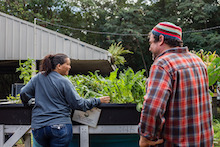 Community coordinator Ilima Ho-Lastimosa is featured in a UH
News video about the Ola HAWAI‘I Specialized Research Center, a
multidisciplinary group that’s been granted $23M over the next five years
to address disparities in health experienced by native Hawaiians and other
disadvantaged populations. Ilima and Ted Radovich (both TPSS)
are co-PIs on one of the six pilot projects of the Center, “Backyard Aquaponics:
Promoting Healthy Eating among Native Hawaiian Families.” Along with PI Jane Chung-Do of UH’s Office of Public Health
Studies, they are working to help families in the Waimanalo homestead lands to establish home aquaponics
systems, allowing them access to healthy foods like fish and vegetables. Community coordinator Ilima Ho-Lastimosa is featured in a UH
News video about the Ola HAWAI‘I Specialized Research Center, a
multidisciplinary group that’s been granted $23M over the next five years
to address disparities in health experienced by native Hawaiians and other
disadvantaged populations. Ilima and Ted Radovich (both TPSS)
are co-PIs on one of the six pilot projects of the Center, “Backyard Aquaponics:
Promoting Healthy Eating among Native Hawaiian Families.” Along with PI Jane Chung-Do of UH’s Office of Public Health
Studies, they are working to help families in the Waimanalo homestead lands to establish home aquaponics
systems, allowing them access to healthy foods like fish and vegetables.
|
A Door Into the Holidays
12/20/2017 Source: Office of Communication Services, CTAHR  To get into the Christmas spirit, Komohana Research and Extension
Center held a holiday door-decorating contest. Judges were Wayne Nishijima,
retired plant pathologist and Associate Dean of Extension; Bernie Kratky,
retired horticulturist; and Francis Zee, retired curator of the USDA Tropical Fruit
and Nut Germplasm Repository in Hilo. The winners of the “Most Creative Door” were
Alyssa Cho (TPSS, right) and her graduate students Colin Hart (left) and
Russell Galenti (middle), for a “Komohana Kristmas List” door featuring self-harvesting
mac nut trees, a rat lungworm antidote, forever-blooming anthuriums, and many
more must-haves! Winners of the “Most UH Spirit Door” were Hawaiian Homelands agent
Kiersten Akahoshi, Sharon Motomura (TPSS), and UHH student Matt Miyahara, while
the winners of the “Most Resourceful” door were Joanne Imamura (TPSS) and assistant
professor of plant breeding James Keach. What an a-door-able tradition! To get into the Christmas spirit, Komohana Research and Extension
Center held a holiday door-decorating contest. Judges were Wayne Nishijima,
retired plant pathologist and Associate Dean of Extension; Bernie Kratky,
retired horticulturist; and Francis Zee, retired curator of the USDA Tropical Fruit
and Nut Germplasm Repository in Hilo. The winners of the “Most Creative Door” were
Alyssa Cho (TPSS, right) and her graduate students Colin Hart (left) and
Russell Galenti (middle), for a “Komohana Kristmas List” door featuring self-harvesting
mac nut trees, a rat lungworm antidote, forever-blooming anthuriums, and many
more must-haves! Winners of the “Most UH Spirit Door” were Hawaiian Homelands agent
Kiersten Akahoshi, Sharon Motomura (TPSS), and UHH student Matt Miyahara, while
the winners of the “Most Resourceful” door were Joanne Imamura (TPSS) and assistant
professor of plant breeding James Keach. What an a-door-able tradition!
|
Never OK!
12/14/2017 Source: Office of Communication Services, CTAHR 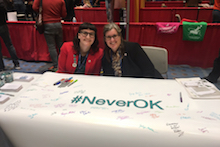 In an article for Entomology Today, Helen Spafford (PEPS) and
co-author Michelle Duennes warn that bullying and other types of harassment are
#NeverOK in the sciences, or elsewhere. At the annual meeting of the Entomological Society of America
(ESA), this year held in Denver, Colorado, Helen and her colleague
collected signatures on a big banner and gave out buttons to raise awareness of
the problem, which exists in the sciences and specifically in entomology as
well as in other spheres where it has been more publicized, such as politics
and entertainment. The two hoped to open a discussion about this important
issue, and conference-goers responded positively. Now this article brings that
conversation to a larger audience. In an article for Entomology Today, Helen Spafford (PEPS) and
co-author Michelle Duennes warn that bullying and other types of harassment are
#NeverOK in the sciences, or elsewhere. At the annual meeting of the Entomological Society of America
(ESA), this year held in Denver, Colorado, Helen and her colleague
collected signatures on a big banner and gave out buttons to raise awareness of
the problem, which exists in the sciences and specifically in entomology as
well as in other spheres where it has been more publicized, such as politics
and entertainment. The two hoped to open a discussion about this important
issue, and conference-goers responded positively. Now this article brings that
conversation to a larger audience.
|
Diet for Health
12/14/2017 Source: Office of Communication Services, CTAHR  Kristina Salazar (HNFAS) has been
awarded the Carey D. Miller Memorial Scholarship for the 2017–2018 school year in
the amount of $4000 by the Academy of Nutrition and Dietetics Foundation. Kristina
is pursuing joint degrees: a BS in nutrition and dietetics and a BA in American
Studies; she’s a member of the Academy of Nutrition and Dietetics, the world’s largest
organization of food and nutrition professionals, as well as CTAHR’s FSHN
Council. She also works as a student research assistant at
the UH Cancer Center, collaborating with registered dietitians in research and
the creation of nutrition and lifestyle materials. Kristina Salazar (HNFAS) has been
awarded the Carey D. Miller Memorial Scholarship for the 2017–2018 school year in
the amount of $4000 by the Academy of Nutrition and Dietetics Foundation. Kristina
is pursuing joint degrees: a BS in nutrition and dietetics and a BA in American
Studies; she’s a member of the Academy of Nutrition and Dietetics, the world’s largest
organization of food and nutrition professionals, as well as CTAHR’s FSHN
Council. She also works as a student research assistant at
the UH Cancer Center, collaborating with registered dietitians in research and
the creation of nutrition and lifestyle materials.
|
On the Fast Track
12/14/2017 Source: Office of Communication Services, CTAHR 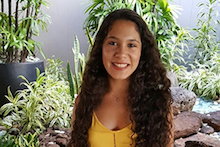 Samantha Alvarado (NREM) is a recipient of the Mason Kekoa
Memorial Scholarship for graduates of Mililani or Lahainaluna High School
entering the UH System, as well as CTAHR’s Kenneth G. and Susan
A. Cassman Scholarship for 2017–2018 and the CTAHR Achievement Scholarship for
2016–2017. Now she’s on track to finish her BS degree a year early! She plans
to work as a land manager and educator and is grateful for the opportunities
provided to her. Samantha Alvarado (NREM) is a recipient of the Mason Kekoa
Memorial Scholarship for graduates of Mililani or Lahainaluna High School
entering the UH System, as well as CTAHR’s Kenneth G. and Susan
A. Cassman Scholarship for 2017–2018 and the CTAHR Achievement Scholarship for
2016–2017. Now she’s on track to finish her BS degree a year early! She plans
to work as a land manager and educator and is grateful for the opportunities
provided to her.
|
What to Do About Deforestation
12/14/2017 Source: Office of Communication Services, CTAHR  NREM PhD student Sita Ekaputri recently
received a field scholarship as part of the Global Comparative Study on REDD+ work, assessing the performance of sub-national
REDD+ and sustainable private-sector initiatives. REDD+ stands for Reducing Emissions from Deforestation and forest
Degradation. Sita is one of about eight
students from various universities who will
be doing fieldwork in Brazil, Peru, and Indonesia. The study is undertaken by
the Center for International Forestry Research (CIFOR). Since 2009, CIFOR has been examining how REDD+ initiatives at
22 sites in six countries have been designed and implemented, with a focus on whether
they deliver a broad set of social and environmental indicators, from carbon effectiveness,
cost efficiency, and equity among stakeholders to poverty reduction, tenure and
rights clarification, and biodiversity protection. Working with selected PhD students,
CIFOR aims to return to some of these sites in 2018 to improve understanding of
local REDD+ impacts. Sita, originally from Indonesia,
will focus her research on the Berau Forest Carbon Program, located in East
Kalimantan in Indonesian Borneo. NREM PhD student Sita Ekaputri recently
received a field scholarship as part of the Global Comparative Study on REDD+ work, assessing the performance of sub-national
REDD+ and sustainable private-sector initiatives. REDD+ stands for Reducing Emissions from Deforestation and forest
Degradation. Sita is one of about eight
students from various universities who will
be doing fieldwork in Brazil, Peru, and Indonesia. The study is undertaken by
the Center for International Forestry Research (CIFOR). Since 2009, CIFOR has been examining how REDD+ initiatives at
22 sites in six countries have been designed and implemented, with a focus on whether
they deliver a broad set of social and environmental indicators, from carbon effectiveness,
cost efficiency, and equity among stakeholders to poverty reduction, tenure and
rights clarification, and biodiversity protection. Working with selected PhD students,
CIFOR aims to return to some of these sites in 2018 to improve understanding of
local REDD+ impacts. Sita, originally from Indonesia,
will focus her research on the Berau Forest Carbon Program, located in East
Kalimantan in Indonesian Borneo.
|
A Credit to Her Mentors
12/14/2017 Source: Office of Communication Services, CTAHR 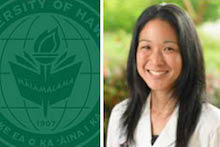 CTAHR Notes caught up with ANSC alumna Lena Asano, who
recently graduated from UH Hilo’s Daniel K. Inouye College of Pharmacy and now
is working in a doctor’s office in Hilo. When she applied, she was told her resume
was “impressive,” though, modestly, she credits the “selfless mentorship” of
mentors Harry Ako and Clyde Tamaru (both MBBE, retired) for that. She feels “beyond
blessed” to serve her hometown while caring for her family and is grateful
for the ways CTAHR and her CTAHR mentors helped give her a solid foundation academically
and professionally. Lena worked in Harry’s lab for four years as an undergraduate
research assistant; she says this work, and the work she did with Clyde,
allowed her to be awarded the best scholarship offered by the College of Pharmacy.
She enthuses, “Dr. Tamaru and Dr. Ako are ridiculously wonderful people. They are
both Givers. I want to be like them!” Particularly, she adds, “Dr. Ako is a mentor
in every sense. He teaches, coaches, corrects, opened doors to incredible opportunities,
and continues to offer support even 15 years after I graduated! Dr. Ako is
responsible for teaching me how to ‘think.’ My parents taught me to work hard and
keep a clean heart while I’m at it, but Dr. Ako can take credit for any problem-solving
skills that I may have.” What a great tribute! And it sounds like Lena is
pretty impressive, too! CTAHR Notes caught up with ANSC alumna Lena Asano, who
recently graduated from UH Hilo’s Daniel K. Inouye College of Pharmacy and now
is working in a doctor’s office in Hilo. When she applied, she was told her resume
was “impressive,” though, modestly, she credits the “selfless mentorship” of
mentors Harry Ako and Clyde Tamaru (both MBBE, retired) for that. She feels “beyond
blessed” to serve her hometown while caring for her family and is grateful
for the ways CTAHR and her CTAHR mentors helped give her a solid foundation academically
and professionally. Lena worked in Harry’s lab for four years as an undergraduate
research assistant; she says this work, and the work she did with Clyde,
allowed her to be awarded the best scholarship offered by the College of Pharmacy.
She enthuses, “Dr. Tamaru and Dr. Ako are ridiculously wonderful people. They are
both Givers. I want to be like them!” Particularly, she adds, “Dr. Ako is a mentor
in every sense. He teaches, coaches, corrects, opened doors to incredible opportunities,
and continues to offer support even 15 years after I graduated! Dr. Ako is
responsible for teaching me how to ‘think.’ My parents taught me to work hard and
keep a clean heart while I’m at it, but Dr. Ako can take credit for any problem-solving
skills that I may have.” What a great tribute! And it sounds like Lena is
pretty impressive, too!
|
The Branch Is in Good Hands
12/14/2017 Source: Office of Communication Services, CTAHR 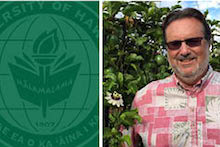 CTAHR alumnus Dr. John McHugh has been appointed to the
position of Pesticides Branch manager of HDOA, where he will oversee the program
compliance office, chemical analysis section, registration and education
section, case preparation section, and statewide enforcement offices of the
branch. He received his BS degree in General Tropical Agriculture and his MS
degree in Horticulture from CTAHR and has also taught at the college. Says
Scott Enright, chair of the Hawaii Board of Agriculture, “The department is
truly fortunate to have his experience, expertise and dedication in helping to
move agriculture forward in our state.” CTAHR alumnus Dr. John McHugh has been appointed to the
position of Pesticides Branch manager of HDOA, where he will oversee the program
compliance office, chemical analysis section, registration and education
section, case preparation section, and statewide enforcement offices of the
branch. He received his BS degree in General Tropical Agriculture and his MS
degree in Horticulture from CTAHR and has also taught at the college. Says
Scott Enright, chair of the Hawaii Board of Agriculture, “The department is
truly fortunate to have his experience, expertise and dedication in helping to
move agriculture forward in our state.”
|
Kalo in NatGeo
12/14/2017 Source: Office of Communication Services, CTAHR 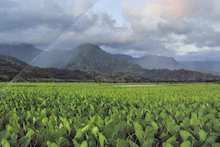 Noa
Lincoln and Susan Miyasaka (both TPSS) are mentioned in this month’s National
Geographic magazine in connection with the college’s efforts to breed taro
resistant to taro leaf blight. The unfortunate fact that many native Hawaiian
varieties are especially susceptible to this fungal disease is one reason why
yields of kalo have been halved in recent decades, the article explains, and
one reason why these breeding efforts are so critical. Noa
Lincoln and Susan Miyasaka (both TPSS) are mentioned in this month’s National
Geographic magazine in connection with the college’s efforts to breed taro
resistant to taro leaf blight. The unfortunate fact that many native Hawaiian
varieties are especially susceptible to this fungal disease is one reason why
yields of kalo have been halved in recent decades, the article explains, and
one reason why these breeding efforts are so critical.
|
Nalo Kalikimaka!
12/14/2017 Source: Office of Communication Services, CTAHR  Ted Radovich and Ilima Ho-Lastimosa (both
TPSS) represented CTAHR’s holiday spirit in fine style at the Waimanalo
Christmas Parade, driving in a “certified-organic” tractor loaded with gifts
and cheerful candy-tossers that reminded onlookers of how long CTAHR’s been making
life better for the community.
|
Living the Aloha Spirit!
12/14/2017 Source: Office of Communication Services, CTAHR 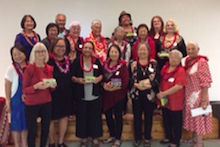 The Hilo Association for Family and Community Education (FCE)
held their annual Installation and Recognition Banquet on Thursday, December 7.
Their advisor Joan Chong (FCS) helped to install officers of 11 clubs comprising over
120 volunteer members. The mission of Hawaii FCE is to live the aloha spirit to
strengthen individuals, families, and communities through continuing education,
developing leadership, and community action. Hilo FCE has been a strong voice in
caring for and promoting a healthier and better life for individuals, families,
and communities. They deserve applause for their educational programs and projects
to meet the needs of Hawai‘i’s families and communities. The Hilo Association for Family and Community Education (FCE)
held their annual Installation and Recognition Banquet on Thursday, December 7.
Their advisor Joan Chong (FCS) helped to install officers of 11 clubs comprising over
120 volunteer members. The mission of Hawaii FCE is to live the aloha spirit to
strengthen individuals, families, and communities through continuing education,
developing leadership, and community action. Hilo FCE has been a strong voice in
caring for and promoting a healthier and better life for individuals, families,
and communities. They deserve applause for their educational programs and projects
to meet the needs of Hawai‘i’s families and communities.
|
Help for the Palms
12/14/2017 Source: Office of Communication Services, CTAHR 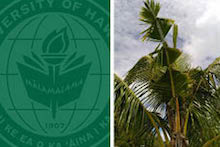 Zhiqiang Cheng and Michael Melzer (both PEPS) organized a symposium
on palm pests at the 16th Pacific Entomology Conference, held on December 5–7 at
the Hilton Waikiki Beach Hotel. Ten speakers from CTAHR, HDOA, University of California
Extension Services, and Tokyo University of Agriculture and Technology participated
in this symposium, discussing important palm pests such as coconut rhinoceros beetle
(CRB) and South American palm weevil. Zhiqiang and Michael, along with Daniel Jenkins
(MBBE) and two PEPS graduate students, Bradley Reil and Megan Manley, presented
their research on various aspects of CRB. Zhiqiang was also invited to present his
research on Ficus pests at the Forest Health Symposium in the conference. Zhiqiang Cheng and Michael Melzer (both PEPS) organized a symposium
on palm pests at the 16th Pacific Entomology Conference, held on December 5–7 at
the Hilton Waikiki Beach Hotel. Ten speakers from CTAHR, HDOA, University of California
Extension Services, and Tokyo University of Agriculture and Technology participated
in this symposium, discussing important palm pests such as coconut rhinoceros beetle
(CRB) and South American palm weevil. Zhiqiang and Michael, along with Daniel Jenkins
(MBBE) and two PEPS graduate students, Bradley Reil and Megan Manley, presented
their research on various aspects of CRB. Zhiqiang was also invited to present his
research on Ficus pests at the Forest Health Symposium in the conference.
|
Ideas for the Future
12/14/2017 Source: Office of Communication Services, CTAHR 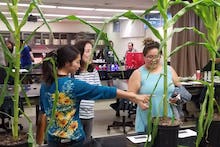 In collaboration with the UH Transfer Coordination Center,
the Academic and Student Affairs Office coordinated its second CTAHR Open House
on Friday, December 8. There were 19 counselors from community colleges in the UH
system, including counselors from the outer islands, in addition to three CTAHR
student ambassadors. The event, a condensed version of the CTAHR Open House in July,
gave community college counselors a preview of what CTAHR has to offer students
in their institutions should they choose to transfer. The morning started off with
refreshments and introductions, followed by a brief overview of all the undergraduate
CTAHR programs. Counselors and ambassadors then visited with Catherine Chan (NREM)
to learn about NREM, got to see the biosensors created in the Jenkins Lab (Biological
Engineering), visited the snails and opihi in the Bingham Lab (Molecular Biosciences
and Biotechnology), and were given a showcase of displays and demos from the Tropical
Agriculture and the Environment program. The day ended with a visit the Insect Museum
on the 6th floor of Gilmore Hall. The counselors enjoyed their brief but informative
visit to CTAHR! In collaboration with the UH Transfer Coordination Center,
the Academic and Student Affairs Office coordinated its second CTAHR Open House
on Friday, December 8. There were 19 counselors from community colleges in the UH
system, including counselors from the outer islands, in addition to three CTAHR
student ambassadors. The event, a condensed version of the CTAHR Open House in July,
gave community college counselors a preview of what CTAHR has to offer students
in their institutions should they choose to transfer. The morning started off with
refreshments and introductions, followed by a brief overview of all the undergraduate
CTAHR programs. Counselors and ambassadors then visited with Catherine Chan (NREM)
to learn about NREM, got to see the biosensors created in the Jenkins Lab (Biological
Engineering), visited the snails and opihi in the Bingham Lab (Molecular Biosciences
and Biotechnology), and were given a showcase of displays and demos from the Tropical
Agriculture and the Environment program. The day ended with a visit the Insect Museum
on the 6th floor of Gilmore Hall. The counselors enjoyed their brief but informative
visit to CTAHR!
|
Convocation Fall 2017
12/14/2017 Source: Office of Communication Services, CTAHR  Nearly 200 CTAHR
students, their families and friends, and faculty and staff attended CTAHR’s
Fall 2017 Convocation. The celebration, co-emceed by Irene Morrow
and Maile Sing, began with congratulatory remarks
from Interim Associate Dean Ania Wieczorek, Dean Nicholas Comerford, and
UH Alumni Association Vice President Paul Yokota. Fall 2017 student marshals Ana Delostrico (FSHN), Anna
Tetsutani (FSHN), and Megan Manley (PEPS) were then recognized for their academic achievements, leadership,
and service. Graduating students in CTAHR-affiliated student organizations were
acknowledged, as were three graduating members of Phi Upsilon Omicron, one of
CTAHR’s honor societies. Then 28 graduates were individually recognized,
followed by refreshments and a chance to mingle and capture memories in the
photo booth. Congratulations and good luck to the graduating students! A big
mahalo goes to all those who supported the graduating students, including
Commuter Services for providing parking passes for the graduates, Office of
Admissions for use of the photo booth backdrop, CTAHR AAF for their support,
Steven and Karen Sato for funding purchase of the lei, CTAHR scholarship
recipients for volunteering, and ASAO for the CTAHR memorabilia and organizing
the event! Nearly 200 CTAHR
students, their families and friends, and faculty and staff attended CTAHR’s
Fall 2017 Convocation. The celebration, co-emceed by Irene Morrow
and Maile Sing, began with congratulatory remarks
from Interim Associate Dean Ania Wieczorek, Dean Nicholas Comerford, and
UH Alumni Association Vice President Paul Yokota. Fall 2017 student marshals Ana Delostrico (FSHN), Anna
Tetsutani (FSHN), and Megan Manley (PEPS) were then recognized for their academic achievements, leadership,
and service. Graduating students in CTAHR-affiliated student organizations were
acknowledged, as were three graduating members of Phi Upsilon Omicron, one of
CTAHR’s honor societies. Then 28 graduates were individually recognized,
followed by refreshments and a chance to mingle and capture memories in the
photo booth. Congratulations and good luck to the graduating students! A big
mahalo goes to all those who supported the graduating students, including
Commuter Services for providing parking passes for the graduates, Office of
Admissions for use of the photo booth backdrop, CTAHR AAF for their support,
Steven and Karen Sato for funding purchase of the lei, CTAHR scholarship
recipients for volunteering, and ASAO for the CTAHR memorabilia and organizing
the event!
|
Diversity Is a Winner
12/7/2017 Source: Office of Communication Services, CTAHR 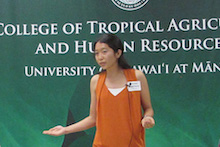 TPSS
grad student Aimee Uyehara, mentored by Mike Muszynski, won the national prize for
the Syngenta scholarship for her essay on diversity in agriculture. She originally
won the regional contest, which netted her a $1000 prize and put her in the running
for the national contest, and then for that she won an additional $6000! As she
wrote in her essay, discussing the diverse members of the lab in which she
works, “No one said working with diversity was easy.” However, “Our different
experiences and personalities contribute to the overall strength of the lab. It
is exciting to discover something new together, knowing that our work
contributes to larger agricultural improvement. This is the picture I have for
diversity in agriculture.” Great job, Aimee! TPSS
grad student Aimee Uyehara, mentored by Mike Muszynski, won the national prize for
the Syngenta scholarship for her essay on diversity in agriculture. She originally
won the regional contest, which netted her a $1000 prize and put her in the running
for the national contest, and then for that she won an additional $6000! As she
wrote in her essay, discussing the diverse members of the lab in which she
works, “No one said working with diversity was easy.” However, “Our different
experiences and personalities contribute to the overall strength of the lab. It
is exciting to discover something new together, knowing that our work
contributes to larger agricultural improvement. This is the picture I have for
diversity in agriculture.” Great job, Aimee!
|
Poinsettias on Point
12/7/2017 Source: Office of Communication Services, CTAHR 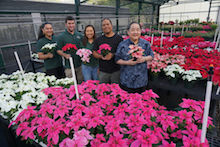 CTAHR’s annual Poinsettia Sale, historically organized by the
college’s undergraduate Horticulture Society, has been a holiday tradition for
over 30 years. In 2016, the TPSS Graduate Student Organization (GSO), in
collaboration with the Horticulture Society, revived the original practice of
students growing the poinsettias themselves rather than purchasing them from
local nurseries. Dummen Orange and Suntory Flowers provided unrooted cuttings
of several different poinsettia cultivars and a new poinsettia hybrid, the
‘Princettia’ series. Unlike traditional poinsettias, ‘Princettia’ plants come
in very bright pink shades and pure white. This was so successful that this
year the GSO expanded production to 400 plants. Funds from the sale help to
support student participation in educational activities. Last year’s funds
helped students attend the annual conference of the American Society for
Horticultural Science. CTAHR’s annual Poinsettia Sale, historically organized by the
college’s undergraduate Horticulture Society, has been a holiday tradition for
over 30 years. In 2016, the TPSS Graduate Student Organization (GSO), in
collaboration with the Horticulture Society, revived the original practice of
students growing the poinsettias themselves rather than purchasing them from
local nurseries. Dummen Orange and Suntory Flowers provided unrooted cuttings
of several different poinsettia cultivars and a new poinsettia hybrid, the
‘Princettia’ series. Unlike traditional poinsettias, ‘Princettia’ plants come
in very bright pink shades and pure white. This was so successful that this
year the GSO expanded production to 400 plants. Funds from the sale help to
support student participation in educational activities. Last year’s funds
helped students attend the annual conference of the American Society for
Horticultural Science.
|
Learning From the Start
12/7/2017 Source: Office of Communication Services, CTAHR  The Center on the Family has released their Hawai‘i Early
Learning Needs Assessment, which provides good and bad news for early childhood
care and learning: Hawai‘i has some excellent and innovative programs for
keiki, but more are needed—there’s a major shortage of early childhood care.
One reason for this may be that many care providers struggle to make a living
wage while trying to keep costs affordable for their clients. An article in the
Star-Advertiser and a UH News story discuss its findings. You can find the summary report here and the comprehensive version here. The Center on the Family has released their Hawai‘i Early
Learning Needs Assessment, which provides good and bad news for early childhood
care and learning: Hawai‘i has some excellent and innovative programs for
keiki, but more are needed—there’s a major shortage of early childhood care.
One reason for this may be that many care providers struggle to make a living
wage while trying to keep costs affordable for their clients. An article in the
Star-Advertiser and a UH News story discuss its findings. You can find the summary report here and the comprehensive version here.
|
November
Distinctive!
11/29/2017 Source: Office of Communication Services, CTAHR  Ju-Young Kang (FCS)
was recently awarded the Paper of Distinction award for the consumer behavior track
during the 2017 annual conference of the International Textile and Apparel Association
(ITAA), for her paper entitled “Social-Local-Mobile Consumers’ Fashion Lifestyle
and Omnichannel Shopping.” Omnichannel shopping, for those who haven’t heard
the term before, is retailing that offers the options and ease of online
shopping within brick-and-mortar stores, while “social-local-mobile” combines
social media, location-based marketing, and mobile apps. This is Ju-Young’s second
Paper of Distinction award since she’s been at CTAHR—she previously won this award
in 2014. ITAA is the biggest professional conference in the textile, apparel, and
merchandising disciplines in the U.S. They’ve got an eye for fashion…and they
also know good scholarship when they see it! Ju-Young Kang (FCS)
was recently awarded the Paper of Distinction award for the consumer behavior track
during the 2017 annual conference of the International Textile and Apparel Association
(ITAA), for her paper entitled “Social-Local-Mobile Consumers’ Fashion Lifestyle
and Omnichannel Shopping.” Omnichannel shopping, for those who haven’t heard
the term before, is retailing that offers the options and ease of online
shopping within brick-and-mortar stores, while “social-local-mobile” combines
social media, location-based marketing, and mobile apps. This is Ju-Young’s second
Paper of Distinction award since she’s been at CTAHR—she previously won this award
in 2014. ITAA is the biggest professional conference in the textile, apparel, and
merchandising disciplines in the U.S. They’ve got an eye for fashion…and they
also know good scholarship when they see it!
|
Herds of Glory
11/29/2017 Source: Office of Communication Services, CTAHR 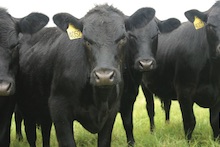 The Hawaii Tribune-Herald recently published a laudatory
article about the Mealani Research Station’s highly rated cattle and the
techniques that produce and nurture them: meticulous breeding, intensive
grazing rotation, humane handling practices, and careful attention to each
animal in the herd. This work and knowledge are paying off: some Mealani Angus
cattle are among the top 1% in the country! Check out the recent Impact story
about them as well. The Hawaii Tribune-Herald recently published a laudatory
article about the Mealani Research Station’s highly rated cattle and the
techniques that produce and nurture them: meticulous breeding, intensive
grazing rotation, humane handling practices, and careful attention to each
animal in the herd. This work and knowledge are paying off: some Mealani Angus
cattle are among the top 1% in the country! Check out the recent Impact story
about them as well.
|
Lynn Against the Lungworm
11/22/2017 Source: Office of Communication Services, CTAHR  Lynn Nakamura-Tengan is featured in a recent
article about rat lungworm in Hawaii Business News. She concedes that the
recent outbreak of the disease will have an economic impact on local farmers
but emphasizes that there are things that individual growers as well as
consumers can do to minimize the danger. Consumers need to follow simple rules
of food safety such as washing produce—even produce that will be peeled, such
as bananas and pineapples, since contaminants on the outer surface of the skin
can reach the inner fruit when the peel is opened. Growers should create and
write down detailed safety plans, including increased inspection for pests in
the fields, and be able to reassure buyers that all necessary precautions are
being taken. Lynn Nakamura-Tengan is featured in a recent
article about rat lungworm in Hawaii Business News. She concedes that the
recent outbreak of the disease will have an economic impact on local farmers
but emphasizes that there are things that individual growers as well as
consumers can do to minimize the danger. Consumers need to follow simple rules
of food safety such as washing produce—even produce that will be peeled, such
as bananas and pineapples, since contaminants on the outer surface of the skin
can reach the inner fruit when the peel is opened. Growers should create and
write down detailed safety plans, including increased inspection for pests in
the fields, and be able to reassure buyers that all necessary precautions are
being taken.
|
UnbeLEAFable!
11/22/2017 Source: Office of Communication Services, CTAHR  Andrea Kawabata and Jen Burt
(both TPSS) hosted an educational booth at the Kona Coffee Cultural Festival’s Hoolaulea
to meet farmers and visitors and talk about...what else? Coffee! Attendees were
able to play the UnbeLEAFable Coffee Pests game, where they learned to identify
different types of coffee leaf pests—those that are found in Hawai‘i and those that
are not. They also learned how to take precautions to prevent the spread and transport
of these pests, and farmers were provided laminated placards to use in identifying
coffee insects and diseases in their fields. These placards, a collaborative effort
with HDOA, can be downloaded here. Andrea Kawabata and Jen Burt
(both TPSS) hosted an educational booth at the Kona Coffee Cultural Festival’s Hoolaulea
to meet farmers and visitors and talk about...what else? Coffee! Attendees were
able to play the UnbeLEAFable Coffee Pests game, where they learned to identify
different types of coffee leaf pests—those that are found in Hawai‘i and those that
are not. They also learned how to take precautions to prevent the spread and transport
of these pests, and farmers were provided laminated placards to use in identifying
coffee insects and diseases in their fields. These placards, a collaborative effort
with HDOA, can be downloaded here.
|
Grow Safe, Eat Safe
11/22/2017 Source: Office of Communication Services, CTAHR 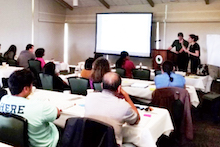 O‘ahu Extension
conducted a grower training in early November that covered food safety practices
and the Produce Safety Rule (PSR). Certified trainers included Extension agents
Josh Silva, Jensen Uyeda, and Jari Sugano (Oahu CES); Lynn Nakamura-Tengan and Kylie
Wong (Maui CES); Luisa Castro (HDOA); and Anny Bruch (HFUU). The PSR is one of several
rules of the Food Safety Modernization Act (FSMA), a set of federal requirements
aiming to prevent foodborne contamination and maximize farm food safety nationwide.
Approximately 600 farms in Hawai‘i will need to comply with this rule, which includes
completing a certified food safety training like this one. By successfully completing
this all-day training, 31 farmers and ag professionals from Kaua‘i, O‘ahu, and Hawai‘i
islands fulfilled this educational requirement. Food safety topics included hygiene
and sanitation, agricultural water, postharvest handling, and animal management.
With new food safety techniques and perspective, farmer attendees can evaluate and
incorporate food safety practices in their operations, producing safe fruits and
vegetables for Hawai‘i consumers. If you are or know of a farmer who needs to attend
this type of training, keep your eyes and ears open for a training scheduled for
Kona in early February. O‘ahu Extension
conducted a grower training in early November that covered food safety practices
and the Produce Safety Rule (PSR). Certified trainers included Extension agents
Josh Silva, Jensen Uyeda, and Jari Sugano (Oahu CES); Lynn Nakamura-Tengan and Kylie
Wong (Maui CES); Luisa Castro (HDOA); and Anny Bruch (HFUU). The PSR is one of several
rules of the Food Safety Modernization Act (FSMA), a set of federal requirements
aiming to prevent foodborne contamination and maximize farm food safety nationwide.
Approximately 600 farms in Hawai‘i will need to comply with this rule, which includes
completing a certified food safety training like this one. By successfully completing
this all-day training, 31 farmers and ag professionals from Kaua‘i, O‘ahu, and Hawai‘i
islands fulfilled this educational requirement. Food safety topics included hygiene
and sanitation, agricultural water, postharvest handling, and animal management.
With new food safety techniques and perspective, farmer attendees can evaluate and
incorporate food safety practices in their operations, producing safe fruits and
vegetables for Hawai‘i consumers. If you are or know of a farmer who needs to attend
this type of training, keep your eyes and ears open for a training scheduled for
Kona in early February.
|
Well-Being in Adversity
11/22/2017 Source: Office of Communication Services, CTAHR 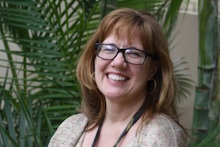 Loriena Yancura (FCS)
is on the executive board of the team that just published a research brief on the
health and well-being of children in low-income rural families.
The brief highlights findings related to family influences on rural child health
and well-being, derived from cross-sectional data included in the USDA Hatch-funded
project “Rural Families Speak about Health (RFSH).” Over a three-year period,
440 rural mothers across 13 states,
including mothers from Waipahu
and Waimanalo, provided data about their experiences in the areas of finances, mental
and physical well-being, health insurance, and family traditions. Findings suggest that food
insecurity, poverty, family routines and rituals, parental mental health, and
co-parent relationship quality are major concerns that affect the health and
well-being of children living in rural, low-income families. Families that are
able to maintain stability in the face of the adversities that poverty presents
provide better environments for children’s health and well-being. The executive board guides
all aspects of the research, from theoretical considerations through
measurement, data collection, and dissemination through research and Extension
channels. Loriena Yancura (FCS)
is on the executive board of the team that just published a research brief on the
health and well-being of children in low-income rural families.
The brief highlights findings related to family influences on rural child health
and well-being, derived from cross-sectional data included in the USDA Hatch-funded
project “Rural Families Speak about Health (RFSH).” Over a three-year period,
440 rural mothers across 13 states,
including mothers from Waipahu
and Waimanalo, provided data about their experiences in the areas of finances, mental
and physical well-being, health insurance, and family traditions. Findings suggest that food
insecurity, poverty, family routines and rituals, parental mental health, and
co-parent relationship quality are major concerns that affect the health and
well-being of children living in rural, low-income families. Families that are
able to maintain stability in the face of the adversities that poverty presents
provide better environments for children’s health and well-being. The executive board guides
all aspects of the research, from theoretical considerations through
measurement, data collection, and dissemination through research and Extension
channels.
|
Cattle to Octopus
11/15/2017 Source: Office of Communication Services, CTAHR  Twenty CTAHR students and staff, including Dean Comerford, enjoyed CTAHR’s 14th Annual Meaningful Experience in Kona. They visited Mealani Research Station, where farm manager Marla Fergerstrom and other staff
led the students on a tour. They learned about tea cultivation and picked their
own tea leaves, then learned about Mealani’s award-winning cattle operation.
The group hiked to the top of the flume system and floated down through the 110-year-old underground
ditch system, learning about sugar plantation history, how the flume was built,
and the area’s natural resources. The day concluded with team-building activities.
The next day, the group woke early to tour NELHA and the many research and commercial
facilities using the deep sea water. Students stopped at the massive Ocean Thermal
Energy Conversion unit, which uses temperature differentials to generate power, then toured an octopus farm—the trip highlight for many was playing
with and feeding these gentle and mischievous creatures! Then they headed for a tour of the UCC Coffee Farm, where they harvested
coffee berries and saw how the beans are roasted and fermented. Thanks go to Marla and the Mealani staff for hosting
the visit to their facilities, as well as to SAPFB and ASAO for supporting the students,
and to the students who made this experience meaningful for the
entire group! Twenty CTAHR students and staff, including Dean Comerford, enjoyed CTAHR’s 14th Annual Meaningful Experience in Kona. They visited Mealani Research Station, where farm manager Marla Fergerstrom and other staff
led the students on a tour. They learned about tea cultivation and picked their
own tea leaves, then learned about Mealani’s award-winning cattle operation.
The group hiked to the top of the flume system and floated down through the 110-year-old underground
ditch system, learning about sugar plantation history, how the flume was built,
and the area’s natural resources. The day concluded with team-building activities.
The next day, the group woke early to tour NELHA and the many research and commercial
facilities using the deep sea water. Students stopped at the massive Ocean Thermal
Energy Conversion unit, which uses temperature differentials to generate power, then toured an octopus farm—the trip highlight for many was playing
with and feeding these gentle and mischievous creatures! Then they headed for a tour of the UCC Coffee Farm, where they harvested
coffee berries and saw how the beans are roasted and fermented. Thanks go to Marla and the Mealani staff for hosting
the visit to their facilities, as well as to SAPFB and ASAO for supporting the students,
and to the students who made this experience meaningful for the
entire group!
|
Stoked, Soggy, and Soil Savvy
11/15/2017 Source: Office of Communication Services, CTAHR 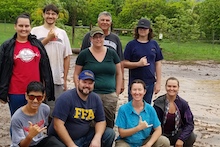 The Kaua‘i
High School land-judging team had a great time at the county Conservation Awareness
Program (CAP) contest last week, getting hands-on soils experience and showing their
enthusiasm even in the wet weather. Facilitated by CTAHR junior Extension agent
Emilie Kirk, who cooperated with their local FFA teacher, NRCS, and East Kaua‘i
SWCD staff, the students assessed and scored the soil and landscape at three sites
in the Koloa area for potential homesites or agricultural use. All their diligent
study and practice are really paying off as the team prepares to compete in the
annual statewide Land Judging Contest in Maui later this month! Land-judging competitions
are held all over the US and are an engaging way for high school students to learn
about soil science and agronomy. The winning team from the statewide competition
will have the chance to compete at the national level next spring in Oklahoma. Good
luck, Kaua‘i High! The Kaua‘i
High School land-judging team had a great time at the county Conservation Awareness
Program (CAP) contest last week, getting hands-on soils experience and showing their
enthusiasm even in the wet weather. Facilitated by CTAHR junior Extension agent
Emilie Kirk, who cooperated with their local FFA teacher, NRCS, and East Kaua‘i
SWCD staff, the students assessed and scored the soil and landscape at three sites
in the Koloa area for potential homesites or agricultural use. All their diligent
study and practice are really paying off as the team prepares to compete in the
annual statewide Land Judging Contest in Maui later this month! Land-judging competitions
are held all over the US and are an engaging way for high school students to learn
about soil science and agronomy. The winning team from the statewide competition
will have the chance to compete at the national level next spring in Oklahoma. Good
luck, Kaua‘i High!
|
Strategically Sound
11/15/2017 Source: Office of Communication Services, CTAHR  CTAHR faculty are involved with four of the eight
research projects selected for the inaugural UHM Strategic Investment Initiative,
multi-disciplinary projects that focus on challenges facing Hawai‘i and the
world. Melissa
Price (NREM) is involved with Engaging Sustainability and Resilience of Island
Ecosystems, Stewardship and Indigenous Sciences, while Mehana Vaughn, Carl Evensen (both NREM), and
Noa Lincoln (TPSS) are involved with Ku‘oko‘a: Sustaining Abundant ‘Aina and
Resilient Leadership. Carl Evensen is also a contributor to SMART
Ala Wai, and Melissa Price is also involved with the Symphony of the Hawaiian Birds. The Islands will definitely be a better place once all these forward-thinking projects come to fruition. Congratulations! CTAHR faculty are involved with four of the eight
research projects selected for the inaugural UHM Strategic Investment Initiative,
multi-disciplinary projects that focus on challenges facing Hawai‘i and the
world. Melissa
Price (NREM) is involved with Engaging Sustainability and Resilience of Island
Ecosystems, Stewardship and Indigenous Sciences, while Mehana Vaughn, Carl Evensen (both NREM), and
Noa Lincoln (TPSS) are involved with Ku‘oko‘a: Sustaining Abundant ‘Aina and
Resilient Leadership. Carl Evensen is also a contributor to SMART
Ala Wai, and Melissa Price is also involved with the Symphony of the Hawaiian Birds. The Islands will definitely be a better place once all these forward-thinking projects come to fruition. Congratulations!
|
The Perennial Solution
11/15/2017 Source: Office of Communication Services, CTAHR 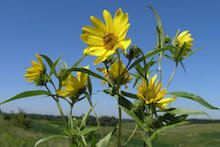 Michael Kantar (TPSS) is lead author of a recent article in
the Annual Review of Plant Biology that discusses the ecological benefits of
perennial crops. It explains that although today’s farming practices produce high
yields, they can also contribute to ecosystem problems such as soil erosion,
greenhouse gas emissions, and water pollution. One way to offset some of these
problems is by growing more perennial and fewer annual crops, since perennials
have a longer growing season and deeper root systems. They thus require less
fertilizer, help prevent runoff, can be more drought tolerant than annuals, and
need less tillage.
Michael was interviewed about his work with perennial grain and oilseed crops,
like these perennial sunflowers, in “Plant, reap, repeat — and now rethink” in
Knowable Magazine. Michael Kantar (TPSS) is lead author of a recent article in
the Annual Review of Plant Biology that discusses the ecological benefits of
perennial crops. It explains that although today’s farming practices produce high
yields, they can also contribute to ecosystem problems such as soil erosion,
greenhouse gas emissions, and water pollution. One way to offset some of these
problems is by growing more perennial and fewer annual crops, since perennials
have a longer growing season and deeper root systems. They thus require less
fertilizer, help prevent runoff, can be more drought tolerant than annuals, and
need less tillage.
Michael was interviewed about his work with perennial grain and oilseed crops,
like these perennial sunflowers, in “Plant, reap, repeat — and now rethink” in
Knowable Magazine.
|
Encounters in Forestry
11/15/2017 Source: Office of Communication Services, CTAHR  Travis Idol, Kim Carlson, and
Adel Youkhana (all NREM) recently hosted and gave presentations to forestry
studies students and faculty from Japan’s Iwate University. The group is
visiting Hawai‘i through Kapi‘olani Community College’s Paul S. Honda
International Center to learn about forestry studies and projects, agriculture,
community development, and Hawaiian culture. Travis Idol, Kim Carlson, and
Adel Youkhana (all NREM) recently hosted and gave presentations to forestry
studies students and faculty from Japan’s Iwate University. The group is
visiting Hawai‘i through Kapi‘olani Community College’s Paul S. Honda
International Center to learn about forestry studies and projects, agriculture,
community development, and Hawaiian culture.
|
Hapa Fashion
11/15/2017 Source: Office of Communication Services, CTAHR 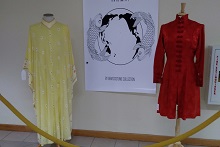 Come check out 100 Years of East Meets West in Hawaii, the
exhibition set up by the Costume Museum Management class (FDM 460) in the
Bridge Gallery in Hamilton Library. It’s there till December 4, and it’s well
worth a trip—it not only showcases vintage and fashion-forward garments chosen
by the students from the Costume Collection to honor the theme and create a
cohesive exhibit; each garment is also individually styled to showcase that
inimitable blend of western and Asian cultures that is so uniquely Hawai‘i. Come check out 100 Years of East Meets West in Hawaii, the
exhibition set up by the Costume Museum Management class (FDM 460) in the
Bridge Gallery in Hamilton Library. It’s there till December 4, and it’s well
worth a trip—it not only showcases vintage and fashion-forward garments chosen
by the students from the Costume Collection to honor the theme and create a
cohesive exhibit; each garment is also individually styled to showcase that
inimitable blend of western and Asian cultures that is so uniquely Hawai‘i.
|
Brainstorming for the Future
11/8/2017 Source: Office of Communication Services, CTAHR  How many PhDs, MSs, and others does it take to plan for the future
of CTAHR in Hawai‘i Island? That sounds like the start of a joke, but it’s serious
business! Approximately 20 CTAHR faculty and staff devoted an entire day on October
31 to brainstorming how to improve aging infrastructure and increase funding. Assistance
was provided from facilitator M’Randa Sandlin (TPSS, left), Dean Nick Comerford
(2nd from left), and Interim Associate Dean of Extension Kelvin Sewake (third from
left). Other participants shown here (clockwise from left) include J.B. Friday (NREM),
James Keach (TPSS), Julia Zee (HNFAS), Joan Chong (FCS), and Randy Hamasaki (PEPS).
If two heads are better than one, then imagine what twenty heads can accomplish! How many PhDs, MSs, and others does it take to plan for the future
of CTAHR in Hawai‘i Island? That sounds like the start of a joke, but it’s serious
business! Approximately 20 CTAHR faculty and staff devoted an entire day on October
31 to brainstorming how to improve aging infrastructure and increase funding. Assistance
was provided from facilitator M’Randa Sandlin (TPSS, left), Dean Nick Comerford
(2nd from left), and Interim Associate Dean of Extension Kelvin Sewake (third from
left). Other participants shown here (clockwise from left) include J.B. Friday (NREM),
James Keach (TPSS), Julia Zee (HNFAS), Joan Chong (FCS), and Randy Hamasaki (PEPS).
If two heads are better than one, then imagine what twenty heads can accomplish!
|
Got ‘Ulu?
11/8/2017 Source: Office of Communication Services, CTAHR 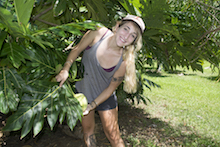 Grad student Blaire Langston (NREM) was interviewed on HPR
and Bytemarks Cafe
to discuss the citizen-science project on ‘ulu phenology she is working on with Noa Lincoln
(TPSS) in which members of the community are invited to adopt a breadfruit tree
and observe and record its lifecycle changes. She explains that this project will
help those who want to start growing breadfruit on a larger scale to know where
are good areas for it and when they should expect their trees to fruit. Grad student Blaire Langston (NREM) was interviewed on HPR
and Bytemarks Cafe
to discuss the citizen-science project on ‘ulu phenology she is working on with Noa Lincoln
(TPSS) in which members of the community are invited to adopt a breadfruit tree
and observe and record its lifecycle changes. She explains that this project will
help those who want to start growing breadfruit on a larger scale to know where
are good areas for it and when they should expect their trees to fruit.
|
Ag Theft
11/8/2017 Source: Office of Communication Services, CTAHR  Agricultural theft of orchard crop commodities is a continuous
issue that affects Big Island growers, creating hardship and difficulty in achieving
sustainability. Last Friday at the Kona Extension Office, associate Extension agent
Andrea Kawabata co-hosted a community meeting on agricultural theft with the executive
director of the Hawaii Tropical Fruit Growers, Ken Love.
A number of concerned farmers and agricultural associations gathered for
the meeting to identify issues and to discuss solutions with US, State and county
representatives. Guest
speakers included Sen. Mike Gabbard, Rep. Richard Creagan, prosecuting
attorney Mitch Roth and investigator Shane Muramaru, and community police officers.
This meeting was sponsored by CTAHR, the Hawaii Tropical Fruit Growers, Hawaii Organic
Farmers Association, the Kona Chapter of Hawaii Farmers Union United, and the Hawai‘i
County prosecuting attorney. Agricultural theft of orchard crop commodities is a continuous
issue that affects Big Island growers, creating hardship and difficulty in achieving
sustainability. Last Friday at the Kona Extension Office, associate Extension agent
Andrea Kawabata co-hosted a community meeting on agricultural theft with the executive
director of the Hawaii Tropical Fruit Growers, Ken Love.
A number of concerned farmers and agricultural associations gathered for
the meeting to identify issues and to discuss solutions with US, State and county
representatives. Guest
speakers included Sen. Mike Gabbard, Rep. Richard Creagan, prosecuting
attorney Mitch Roth and investigator Shane Muramaru, and community police officers.
This meeting was sponsored by CTAHR, the Hawaii Tropical Fruit Growers, Hawaii Organic
Farmers Association, the Kona Chapter of Hawaii Farmers Union United, and the Hawai‘i
County prosecuting attorney.
|
Sunny Days
11/8/2017 Source: Office of Communication Services, CTAHR  The beginning farmer-training program GoFarm is mentioned in
a recent Star-Advertiser story about the acres of sunflowers that DuPont Pioneer
is opening to the public for tours for the next two weeks. DuPont is partnering
with GoFarm to raise awareness about eating local—the company’s lands also include
some 400 acres planted in vegetables. Daniel Carroll, a program coach and coordinator
for GoFarm’s North Shore operation, is pictured cutting sunflowers grown by a program
participant. The beginning farmer-training program GoFarm is mentioned in
a recent Star-Advertiser story about the acres of sunflowers that DuPont Pioneer
is opening to the public for tours for the next two weeks. DuPont is partnering
with GoFarm to raise awareness about eating local—the company’s lands also include
some 400 acres planted in vegetables. Daniel Carroll, a program coach and coordinator
for GoFarm’s North Shore operation, is pictured cutting sunflowers grown by a program
participant.
|
A Cut Above
11/8/2017 Source: Office of Communication Services, CTAHR 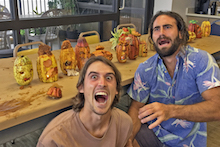 Pumpkin carving is passé! For Halloween, Colin Hart (left) taught
attendees of the 1st Annual Cacao-Pod Carving Contest at Komohana Research &
Extension Center how to remove seeds and pulp from cacao pods and then carve them
into expressive and menacing faces. Russell Galenti (right) won the contest for
Most Scary. Both Colin and Russell are TPSS graduate students of Alyssa Cho. It
was a fun though fearsome event, hopefully the first of many! Pumpkin carving is passé! For Halloween, Colin Hart (left) taught
attendees of the 1st Annual Cacao-Pod Carving Contest at Komohana Research &
Extension Center how to remove seeds and pulp from cacao pods and then carve them
into expressive and menacing faces. Russell Galenti (right) won the contest for
Most Scary. Both Colin and Russell are TPSS graduate students of Alyssa Cho. It
was a fun though fearsome event, hopefully the first of many!
|
Roots Research
11/8/2017 Source: Office of Communication Services, CTAHR  Susan Miyasaka’s (TPSS) project “Improving Sustainability of
Sweet Potato through Virus-tested, Tissue-culture Technology” has been granted preliminary approval for funding of almost $8000
from the Department of Research and Development to test tissue-cultured sweetpotato
plants for resistance to a virus that is harming yields on the Hamakua Coast. This project, for which agents
on neighbor islands are co-PIs , will
“conduct farm trials comparing yields of sweet potatoes grown from a commercial
source of cuttings with those of virus-tested, tissue-cultured planting materials,
and graft plant material to multiply existing sweet potato viruses to reach detection
levels.” The resolution still the needs the vote of the full council, but it’s a
project well worth supporting! Susan Miyasaka’s (TPSS) project “Improving Sustainability of
Sweet Potato through Virus-tested, Tissue-culture Technology” has been granted preliminary approval for funding of almost $8000
from the Department of Research and Development to test tissue-cultured sweetpotato
plants for resistance to a virus that is harming yields on the Hamakua Coast. This project, for which agents
on neighbor islands are co-PIs , will
“conduct farm trials comparing yields of sweet potatoes grown from a commercial
source of cuttings with those of virus-tested, tissue-cultured planting materials,
and graft plant material to multiply existing sweet potato viruses to reach detection
levels.” The resolution still the needs the vote of the full council, but it’s a
project well worth supporting!
|
Bee on Screen
11/8/2017 Source: Office of Communication Services, CTAHR 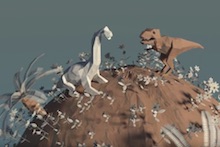 A video team headed by Ethel Villalobos (PEPS) just won two
awards from the Entomological Society of America. “The Life History of Bees”
introduces the viewer to a variety of bee species and their life cycles;
although the emphasis is on honeybees, the video includes natural history
information about wild bees in the tropics and temperate regions. “The Odd
Couples” addresses the ancient relationship between flowering plants and
pollinators. “The Life History of Bees” won first place in the P-IE Pollinator
Video Competition, and “The Odd Couples” won second place—the Stinger Award—in
the ESA’s 2017 Annual Conference video competition. These videos are the result
of a group effort from graduate students, researchers, and a video editor/graphic
designer. They collaborated in the script writing, voice talent, video and
photography, and 2D and 3D animation. And the films are beautiful, informative,
and fun to watch—check them out! A video team headed by Ethel Villalobos (PEPS) just won two
awards from the Entomological Society of America. “The Life History of Bees”
introduces the viewer to a variety of bee species and their life cycles;
although the emphasis is on honeybees, the video includes natural history
information about wild bees in the tropics and temperate regions. “The Odd
Couples” addresses the ancient relationship between flowering plants and
pollinators. “The Life History of Bees” won first place in the P-IE Pollinator
Video Competition, and “The Odd Couples” won second place—the Stinger Award—in
the ESA’s 2017 Annual Conference video competition. These videos are the result
of a group effort from graduate students, researchers, and a video editor/graphic
designer. They collaborated in the script writing, voice talent, video and
photography, and 2D and 3D animation. And the films are beautiful, informative,
and fun to watch—check them out!
|
At the Meeting
11/2/2017 Source: Office of Communication Services, CTAHR 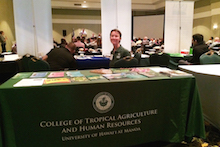 CTAHR was an integral part of the
information-giving and the networking when the Hawaii Farm Bureau held its annual
meeting in Lihu‘e on October 23. Featured at the meeting was a keynote speech by
Dean Nicholas Comerford, in which he introduced himself and his leadership philosophy
for CTAHR to the farming community. Also in attendance were Associate Dean for Extension
Kelvin Sewake, Kaua‘i County Administrator Russell Messing, Associate Specialist
Ted Radovich (TPSS), and Jr. Extension Agent Emilie Kirk (pictured here, staffing
the CTAHR information table). Helping the HFB is just another way CTAHR helps
local farmers, and in return its members support the college—win-win! CTAHR was an integral part of the
information-giving and the networking when the Hawaii Farm Bureau held its annual
meeting in Lihu‘e on October 23. Featured at the meeting was a keynote speech by
Dean Nicholas Comerford, in which he introduced himself and his leadership philosophy
for CTAHR to the farming community. Also in attendance were Associate Dean for Extension
Kelvin Sewake, Kaua‘i County Administrator Russell Messing, Associate Specialist
Ted Radovich (TPSS), and Jr. Extension Agent Emilie Kirk (pictured here, staffing
the CTAHR information table). Helping the HFB is just another way CTAHR helps
local farmers, and in return its members support the college—win-win!
|
Farming With Vision
11/2/2017 Source: Office of Communication Services, CTAHR 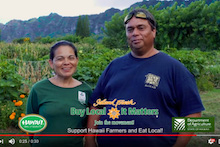 GoFarm Hawai‘i participants Leonard Hall and Priscilla
Carbajal appear in HDOA’s newest Buy Local, It Matters TV spot, explaining why
they farm. As first-generation growers, they are motivated by their care for
the land and the people and their hope for a healthier, happier, more
sustainable future for everyone in the Islands. Good luck to them! GoFarm Hawai‘i participants Leonard Hall and Priscilla
Carbajal appear in HDOA’s newest Buy Local, It Matters TV spot, explaining why
they farm. As first-generation growers, they are motivated by their care for
the land and the people and their hope for a healthier, happier, more
sustainable future for everyone in the Islands. Good luck to them!
|
Where Have All the Insects Gone?
11/2/2017 Source: Office of Communication Services, CTAHR  Helen Spafford (PEPS) is quoted in an article in Entomology Today on a large and
worrying decline in insects recently reported in a German study. Though not
connected with the study, Helen was asked to comment because she had
co-authored the Entomological Society of America’s 2017 position paper on
endangered insect species and arthropod biodiversity. She agrees that the study
should concern scientists and others, and that we need to act: “This study has
sounded the alarm…. We need to wake up.” Helen Spafford (PEPS) is quoted in an article in Entomology Today on a large and
worrying decline in insects recently reported in a German study. Though not
connected with the study, Helen was asked to comment because she had
co-authored the Entomological Society of America’s 2017 position paper on
endangered insect species and arthropod biodiversity. She agrees that the study
should concern scientists and others, and that we need to act: “This study has
sounded the alarm…. We need to wake up.”
|
New Faces: Pomai Weigert
11/2/2017 Source: Office of Communication Services, CTAHR  Welcome to Pomai Weigert, GoFarm Hawai‘i’s new agbusiness consultant!
Pomai will be consulting with program participants, including beginning farmer-training
students and agribusinesses statewide. She has extensive experience in marketing,
community relations, agritourism, value-added production, and social media. She
has served as a consultant to the Hawaii AgriTourism Association and as marketing
and community relations director for Ali‘i Kula Lavender Farm. She was recently
named one of the “5 Women Rocking the Food Scene in Hawaii” in Forbes magazine.
We’re glad you’re here, Pomai! Welcome to Pomai Weigert, GoFarm Hawai‘i’s new agbusiness consultant!
Pomai will be consulting with program participants, including beginning farmer-training
students and agribusinesses statewide. She has extensive experience in marketing,
community relations, agritourism, value-added production, and social media. She
has served as a consultant to the Hawaii AgriTourism Association and as marketing
and community relations director for Ali‘i Kula Lavender Farm. She was recently
named one of the “5 Women Rocking the Food Scene in Hawaii” in Forbes magazine.
We’re glad you’re here, Pomai!
|
He Likes Beef
11/2/2017 Source: Office of Communication Services, CTAHR  Former CTAHR Outstanding Alumnus and KTA Super Stores
Executive VP Derek Kurisu is featured in the new video “Where Local Beef Comes
From,” produced by the Hawaii Cattlemen's Council and the Hawaii Beef Industry
Council and funded partially by the HDOA. He explains that buying locally
grass-finished beef for his stores is a win-win situation: the customers love
it, and he’s assured of product in case a disaster hits the Islands’ shipping
system. Most importantly, he gets to support the local producers, part of his
community and ‘ohana. Former CTAHR Outstanding Alumnus and KTA Super Stores
Executive VP Derek Kurisu is featured in the new video “Where Local Beef Comes
From,” produced by the Hawaii Cattlemen's Council and the Hawaii Beef Industry
Council and funded partially by the HDOA. He explains that buying locally
grass-finished beef for his stores is a win-win situation: the customers love
it, and he’s assured of product in case a disaster hits the Islands’ shipping
system. Most importantly, he gets to support the local producers, part of his
community and ‘ohana.
|
Student Spotlight
11/2/2017 Source: Office of Communication Services, CTAHR 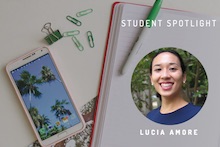 CTAHR dietetics alumna Lucia Amore is featured as one of the
students spotlighted at the new UHM Admissions website. She celebrates the way
the scholarships she earned allowed her to gain an education and maintain a
high GPA without a high financial burden. During her time at CTAHR, Lucia was
also a member of the FSHN Council, a student marshal, and a winner at the 2017
Student Research Symposium—a worthy ambassador for the college! CTAHR dietetics alumna Lucia Amore is featured as one of the
students spotlighted at the new UHM Admissions website. She celebrates the way
the scholarships she earned allowed her to gain an education and maintain a
high GPA without a high financial burden. During her time at CTAHR, Lucia was
also a member of the FSHN Council, a student marshal, and a winner at the 2017
Student Research Symposium—a worthy ambassador for the college!
|
Pumped-Up Pumpkins
11/2/2017 Source: Office of Communication Services, CTAHR 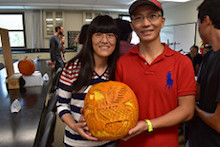 PEPS held
its annual highly anticipated pumpkin-carving contest on Halloween, awarding
certificates for the top three carving teams. Befittingly, there were a few
insect-related entries, including a coconut rhinoceros beetle and a bat—an
insectivore—but the winning work of vegetable art depicted another kind of
creature entirely: a phoenix. The elaborate and beautifully executed piece was
carved by Allen
Yang and Meng Mao (pictured), along with Kirsten Poff, who can all be
justifiably proud of their great squash-slicing skills! Thanks go to CTAHR supporter Aloun
Farms, which supplied the pumpkins for the event. PEPS held
its annual highly anticipated pumpkin-carving contest on Halloween, awarding
certificates for the top three carving teams. Befittingly, there were a few
insect-related entries, including a coconut rhinoceros beetle and a bat—an
insectivore—but the winning work of vegetable art depicted another kind of
creature entirely: a phoenix. The elaborate and beautifully executed piece was
carved by Allen
Yang and Meng Mao (pictured), along with Kirsten Poff, who can all be
justifiably proud of their great squash-slicing skills! Thanks go to CTAHR supporter Aloun
Farms, which supplied the pumpkins for the event.
|
Long-Term Termites
11/2/2017 Source: Office of Communication Services, CTAHR  MS grad student in Entomology Maria Aihara-Sasaki, the
coordinator for the Termite Project, was interviewed for the most recent UH
Alumni magazine about the persistence of termites in the Islands. Maria, who
also has her undergraduate degree from PEPS, says she’s been working on
termites at UH for more than 16 years, and while pest control is getting
better, the insects seem to evolve to meet the challenge: “Unfortunately, I
don’t think termites will be eradicated anytime soon.” But even controlling
them better is a positive development, and that’s what Maria’s helping
with! MS grad student in Entomology Maria Aihara-Sasaki, the
coordinator for the Termite Project, was interviewed for the most recent UH
Alumni magazine about the persistence of termites in the Islands. Maria, who
also has her undergraduate degree from PEPS, says she’s been working on
termites at UH for more than 16 years, and while pest control is getting
better, the insects seem to evolve to meet the challenge: “Unfortunately, I
don’t think termites will be eradicated anytime soon.” But even controlling
them better is a positive development, and that’s what Maria’s helping
with!
|
Elder Affairs in Good Hands
11/2/2017 Source: Office of Communication Services, CTAHR  Sarah Yuan (COF) has been re-appointed to the State’s Policy
Advisory Board for Elder Affairs (PABEA) for a second four-year term. PABEA’s main
role is to advise the director of the Executive Office on Aging on policies, programs,
and other issues concerning the well-being of older adults in Hawai‘i. In the past
four years, she worked with the board members and other community groups to successfully
advocate for funding and legislation to meet the rising needs for long-term support
services, protect the safety and quality of life for frail seniors, and promote
healthy aging. The board is composed of 14 governor-appointed and 8 ex-officio members,
who are selected for “their ability to make contributions to the solution of problems
relating to aging.” The majority of appointed members are required to be seniors
themselves, so Sarah stands out as especially notable! She attended the Governor’s
Commissioning Ceremony on Thursday, October 26th, at Hawaii State Art Museum downtown,
pictured here with Governor David Ige (right) and associate judge Derrick Chan. Sarah Yuan (COF) has been re-appointed to the State’s Policy
Advisory Board for Elder Affairs (PABEA) for a second four-year term. PABEA’s main
role is to advise the director of the Executive Office on Aging on policies, programs,
and other issues concerning the well-being of older adults in Hawai‘i. In the past
four years, she worked with the board members and other community groups to successfully
advocate for funding and legislation to meet the rising needs for long-term support
services, protect the safety and quality of life for frail seniors, and promote
healthy aging. The board is composed of 14 governor-appointed and 8 ex-officio members,
who are selected for “their ability to make contributions to the solution of problems
relating to aging.” The majority of appointed members are required to be seniors
themselves, so Sarah stands out as especially notable! She attended the Governor’s
Commissioning Ceremony on Thursday, October 26th, at Hawaii State Art Museum downtown,
pictured here with Governor David Ige (right) and associate judge Derrick Chan.
|
Haut, Haut Chocolat!
11/2/2017 Source: Office of Communication Services, CTAHR 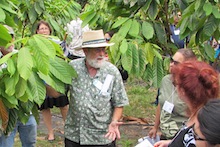 We
reported last week that Hawai‘i-grown cacao beans from Extension specialist Skip
Bittenbender’s (TPSS) Hawai‘i State Cacao Trial project had been have been ranked among the top 50
samples for the 2017 Cocoa of Excellence Program. This
week we’re glad to update that: they were selected as among the top three in the Asia, Pacific
and Australia category and as among the eighteen International Cocoa Award
winners chosen announced this week at the Salon du Chocolat in Paris!
Congratulations—and can we have some of that chocolate? We
reported last week that Hawai‘i-grown cacao beans from Extension specialist Skip
Bittenbender’s (TPSS) Hawai‘i State Cacao Trial project had been have been ranked among the top 50
samples for the 2017 Cocoa of Excellence Program. This
week we’re glad to update that: they were selected as among the top three in the Asia, Pacific
and Australia category and as among the eighteen International Cocoa Award
winners chosen announced this week at the Salon du Chocolat in Paris!
Congratulations—and can we have some of that chocolate?
|
Feel-Good Reading
11/2/2017 Source: Office of Communication Services, CTAHR  Looking for some news you can be proud of? Check out the two
latest CTAHR Impact Reports, now published on the Web in pdf. The
second-quarter report details several ways the college is working to mitigate
the effects of climate change: by fine-tuning agricultural methodologies to
reduce greenhouse-gas emissions, by empowering Pacific-area Extension staff and
faculty to help their clientele deal with a warming planet, by teaching
grade-school teachers how to teach climate change to their students, and by
partnering with an NGO that has a unique method of increasing soil and plant
resiliency against global warming: composting human waste! The third-quarter
report looks at the many different ways CTAHR faculty and staff are working
with animals, for their well-being and that of Hawai‘i’s people: by serving as
state veterinarians, by researching the unique and beneficial bond between
humans and dogs, by mentoring at-risk youth by teaching them to raise swine
using sustainable and local methods, and by using cutting-edge breeding
techniques to build an award-winning herd of cattle as well as compile
essential information and elite genetic stock for local ranchers. Looking for some news you can be proud of? Check out the two
latest CTAHR Impact Reports, now published on the Web in pdf. The
second-quarter report details several ways the college is working to mitigate
the effects of climate change: by fine-tuning agricultural methodologies to
reduce greenhouse-gas emissions, by empowering Pacific-area Extension staff and
faculty to help their clientele deal with a warming planet, by teaching
grade-school teachers how to teach climate change to their students, and by
partnering with an NGO that has a unique method of increasing soil and plant
resiliency against global warming: composting human waste! The third-quarter
report looks at the many different ways CTAHR faculty and staff are working
with animals, for their well-being and that of Hawai‘i’s people: by serving as
state veterinarians, by researching the unique and beneficial bond between
humans and dogs, by mentoring at-risk youth by teaching them to raise swine
using sustainable and local methods, and by using cutting-edge breeding
techniques to build an award-winning herd of cattle as well as compile
essential information and elite genetic stock for local ranchers.
|
Control Your Fermentation
11/2/2017 Source: Office of Communication Services, CTAHR  Skip Bittenbender (TPSS), Loren Gautz (MBBE), and
colleagues have published a new paper, “Microfermentation
of Cacao: The CTAHRBag System,” in the journal HortTechnology. The CTAHRBag system solves a
common problem on the way to making chocolate among small growers and
hobbyists, as well as scientists evaluating new varieties for quality and
yield: many fermentation methods are inconsistent, especially when used with
very small quantities. Their method uses clean, inexpensive, disposable
polyethylene bags for fermentation vessels and replaces sun drying with drying
in the laboratory for a flexible and reliable method appropriate on the small scale,
helpful for a growing segment of cacao and chocolate producers. Skip Bittenbender (TPSS), Loren Gautz (MBBE), and
colleagues have published a new paper, “Microfermentation
of Cacao: The CTAHRBag System,” in the journal HortTechnology. The CTAHRBag system solves a
common problem on the way to making chocolate among small growers and
hobbyists, as well as scientists evaluating new varieties for quality and
yield: many fermentation methods are inconsistent, especially when used with
very small quantities. Their method uses clean, inexpensive, disposable
polyethylene bags for fermentation vessels and replaces sun drying with drying
in the laboratory for a flexible and reliable method appropriate on the small scale,
helpful for a growing segment of cacao and chocolate producers.
|
October
They’re There at the College Fair
10/26/2017 Source: Office of Communication Services, CTAHR 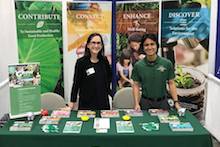 The ASAO is
continuing their fantastic recruitment efforts with tables at the College Fairs
being held on all the
islands this week. Here student advisor Irene Morrow and student ambassador Brent Shigano, a senior in
MBB (not a junior, as was previously reported), invite
highschoolers to find out more about the college’s many diverse offerings at
the Honolulu National College Fair (not the Kaua‘i College Fair, as was previously recorded; advisor Maile Sing provided outreach at the Kaua‘i College Fair). The ASAO is
continuing their fantastic recruitment efforts with tables at the College Fairs
being held on all the
islands this week. Here student advisor Irene Morrow and student ambassador Brent Shigano, a senior in
MBB (not a junior, as was previously reported), invite
highschoolers to find out more about the college’s many diverse offerings at
the Honolulu National College Fair (not the Kaua‘i College Fair, as was previously recorded; advisor Maile Sing provided outreach at the Kaua‘i College Fair).
|
Hilo Tastes Great!
10/25/2017 Source: Office of Communication Services, CTAHR  Members of the CTAHR ‘ohana contributed to the 20th
annual—and sold-out!—Taste of Hilo. Mike DuPonte was there to introduce
event-goers to the extra-‘ono taste of pork that is raised using Korean Natural
Farming methods—he says you can definitely taste the difference, and it’s delicious. These methods are also sustainable and locally focused, so it’s a
win-win. Mike also premiered a video, featuring Animal Sciences student Keala
Cowell, that describes the Ag in the Classroom project that the two, with 4-H
agent Becky Settlage, have inaugurated in four Big Island schools. Mike says
the video was so inspirational that one viewer immediately pledged $1200
towards the project! Members of the CTAHR ‘ohana contributed to the 20th
annual—and sold-out!—Taste of Hilo. Mike DuPonte was there to introduce
event-goers to the extra-‘ono taste of pork that is raised using Korean Natural
Farming methods—he says you can definitely taste the difference, and it’s delicious. These methods are also sustainable and locally focused, so it’s a
win-win. Mike also premiered a video, featuring Animal Sciences student Keala
Cowell, that describes the Ag in the Classroom project that the two, with 4-H
agent Becky Settlage, have inaugurated in four Big Island schools. Mike says
the video was so inspirational that one viewer immediately pledged $1200
towards the project!
|
Rock Stars
10/25/2017 Source: Office of Communication Services, CTAHR 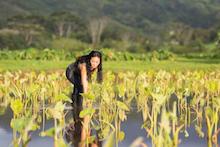 Two
CTAHR-associated women are featured in Forbes Magazine’s article “Five Women
Rocking the Food Scene in Hawaii.” Lyndsey
Haraguchi-Nakayama, a TPSS alumna, is the fifth generation to work at her
family’s taro farm, W.
T. Haraguchi Farm, and co-creator of the Hanalei Taro food
truck. She explains the importance of
history: “It is
important for people to learn the history, culture, preservation and efforts
that farming families do on a daily basis to bring sustainability to fruition.”
Lani Weigert, an alumna of the Ag Leadership program and a founder of the
successful agritourism venture Ali‘i Kula Lavender, is also mentioned in the
article, though it focuses more on her daughter and partner, Pomai. As the
article explains, the two created a concept, “sustainable aloha,” which guides
their work in their community through educational stewardship and nurturing the
planet for future generations. Two
CTAHR-associated women are featured in Forbes Magazine’s article “Five Women
Rocking the Food Scene in Hawaii.” Lyndsey
Haraguchi-Nakayama, a TPSS alumna, is the fifth generation to work at her
family’s taro farm, W.
T. Haraguchi Farm, and co-creator of the Hanalei Taro food
truck. She explains the importance of
history: “It is
important for people to learn the history, culture, preservation and efforts
that farming families do on a daily basis to bring sustainability to fruition.”
Lani Weigert, an alumna of the Ag Leadership program and a founder of the
successful agritourism venture Ali‘i Kula Lavender, is also mentioned in the
article, though it focuses more on her daughter and partner, Pomai. As the
article explains, the two created a concept, “sustainable aloha,” which guides
their work in their community through educational stewardship and nurturing the
planet for future generations.
|
Pest Control at the Next Level
10/25/2017 Source: Office of Communication Services, CTAHR 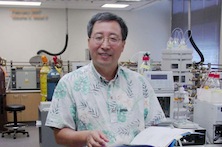 Qing Li (MBBE) was one of only three UH faculty
invited to present their innovative research at the exclusive UH Tech Showcase.
The innovators presented their cutting-edge ideas to an invitation-only
audience of investors and entrepreneurs. Qing explained how his research in monoterpenoids from select essential oils could be
used to develop insecticides for specific agricultural, storage and household
pests. UH Vice President for Research and Innovation Vassilis
L. Syrmos called the presenters’ work “examples of the world-class
research” that is done at UH! Qing Li (MBBE) was one of only three UH faculty
invited to present their innovative research at the exclusive UH Tech Showcase.
The innovators presented their cutting-edge ideas to an invitation-only
audience of investors and entrepreneurs. Qing explained how his research in monoterpenoids from select essential oils could be
used to develop insecticides for specific agricultural, storage and household
pests. UH Vice President for Research and Innovation Vassilis
L. Syrmos called the presenters’ work “examples of the world-class
research” that is done at UH!
|
Double the Honor
10/25/2017 Source: Office of Communication Services, CTAHR The two posters that Samir Khanal
co-authored and presented at the 15th International Water Association’s World
Conference on Anaerobic Digestion (IWA-AD) in Beijing were both awarded outstanding
poster! The conference, which was attended by over 1200 participants from around
the world, is an international forum discussing state-of-art anaerobic
bioprocesses, including wastewater treatment. These posters
comprised two of the only 20 awardees chosen from nearly 600 poster presentations.
One poster is entitled “Effects of hyperthermophilic temperature on biomethanation
efficiency and microbial community during hydrogenotrophic methanogenesis,” and
the other “Automated micro-aeration system for enhancing stability of anaerobic
digestion at high organic loading rate.” The award includes
a certificate and a cash prize—or is that two certificates and double the cash?
|
Food Is Good!
10/25/2017 Source: Office of Communication Services, CTAHR 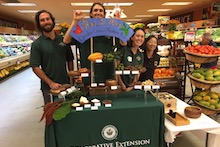 National
Food Day, which supports and promotes local food and farmers, healthy foods,
healthy eating, and safe food handling, was celebrated at KTA stores on the Big
Island and featured educational displays and samplings of locally grown and
produced food. Alyssa Cho (third from left) and her graduate students Colin
Hart and Russell Galanti, along with Joanne Imamura (all TPSS), demonstrated
how cacao and macadamia nuts are processed from raw fruit/nut crops into the
iconic chocolate-covered mac nut. Julia Zee (HNFAS) promoted local produce with GET (Grow,
Eat & Think) Local, as well as safe food handling and how to prevent rat
lungworm disease. Michael DuPonte (HNFAS) and members of the Hawaii Swine
Producers Cooperative served pork and Portuguese sausage…the sausage was so
good that KTA vice president and former CTAHR Outstanding Alumnus Derek Kurisu
signed a contract to distribute it on the spot! And East and West Hawai‘i
Master Gardeners provided gardening information and assisted with the giveaway
of free vegetable seedlings. What a great (food) day! National
Food Day, which supports and promotes local food and farmers, healthy foods,
healthy eating, and safe food handling, was celebrated at KTA stores on the Big
Island and featured educational displays and samplings of locally grown and
produced food. Alyssa Cho (third from left) and her graduate students Colin
Hart and Russell Galanti, along with Joanne Imamura (all TPSS), demonstrated
how cacao and macadamia nuts are processed from raw fruit/nut crops into the
iconic chocolate-covered mac nut. Julia Zee (HNFAS) promoted local produce with GET (Grow,
Eat & Think) Local, as well as safe food handling and how to prevent rat
lungworm disease. Michael DuPonte (HNFAS) and members of the Hawaii Swine
Producers Cooperative served pork and Portuguese sausage…the sausage was so
good that KTA vice president and former CTAHR Outstanding Alumnus Derek Kurisu
signed a contract to distribute it on the spot! And East and West Hawai‘i
Master Gardeners provided gardening information and assisted with the giveaway
of free vegetable seedlings. What a great (food) day!
|
Haut Chocolat
10/25/2017 Source: Office of Communication Services, CTAHR Hawai‘i-grown cacao beans from Skip Bittenbender’s (TPSS) Hawai‘i
State Cacao Trial project have been ranked, along with two other Hawai‘i samples,
among the top 50 samples out of 166, submitted from 40 countries, for the 2017 Cocoa
of Excellence Program. Skip’s student Dan O’Doherty submitted the fermented, dried
cacao beans from three locations of Skip’s trial on O‘ahu. These high-ranking
beans were nominated for an International Cocoa Award, and the
award winners will be announced at the end of October. The winner will
be celebrated on October 30 at the Salon du Chocolat in Paris!
|
Making an Impact!
10/25/2017 Source: Office of Communication Services, CTAHR Samir Khanal’s
(MBBE) co-authored article “Nitrogen Transformations in Aquaponic Systems: A Review”
was among the most recent top four most downloaded articles in the journal Aquacultural
Engineering. As the article explains, studies on nitrogen transformations and
nitrogen utilization efficiency in aquaponic systems have been very limited,
despite the critical importance of N in such systems, so this paper fills
an important gap.
Another
article Samir co-authored is “Anaerobic Digestion-Based Biorefinery for
Bioenergy and Biobased Products,” appears in the Journal of Industrial
Biotechnology’s list of High-Impact Articles.
|
Credit Where Accreditation Is Due
10/18/2017 Source: Office of Communication Services, CTAHR  Andy Reilly (FDM) has been appointed to the Board of Commissioners
for the Textile and Apparel Programs Accrediting Commission (TAPAC), effective January
2018. He will be responsible for reviewing accreditation reports and voting on accreditation.
The TAPAC plans, implements, evaluates
and monitors the accreditation of undergraduate textiles and apparel academic
programs, and Andy will be instrumental to this mission. At the International
Textile and Apparel Association meeting next month, members of the organization
will have an opportunity to find out more about the newly created accreditation
process. Andy Reilly (FDM) has been appointed to the Board of Commissioners
for the Textile and Apparel Programs Accrediting Commission (TAPAC), effective January
2018. He will be responsible for reviewing accreditation reports and voting on accreditation.
The TAPAC plans, implements, evaluates
and monitors the accreditation of undergraduate textiles and apparel academic
programs, and Andy will be instrumental to this mission. At the International
Textile and Apparel Association meeting next month, members of the organization
will have an opportunity to find out more about the newly created accreditation
process.
|
Not Just Dirt
10/18/2017 Source: Office of Communication Services, CTAHR 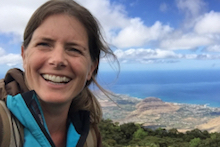 Susan Crow (NREM) was recently interviewed on HPR with
regard to soil and its capacity for mitigating global warming—if correctly
managed—following the publication of a pair of papers on the subject that she
co-authored. As she explains, it can store more carbon than plants and the atmosphere
combined, but it needs to remain undisturbed; other ways to manage soil
correctly include composting and using wood chips. Susan Crow (NREM) was recently interviewed on HPR with
regard to soil and its capacity for mitigating global warming—if correctly
managed—following the publication of a pair of papers on the subject that she
co-authored. As she explains, it can store more carbon than plants and the atmosphere
combined, but it needs to remain undisturbed; other ways to manage soil
correctly include composting and using wood chips.
|
Extension at Kiwannis
10/18/2017 Source: Office of Communication Services, CTAHR 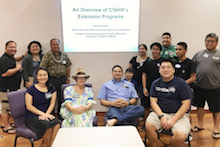 Associate Dean for Extension Kelvin Sewake was invited to speak
at the meeting of the Kiwanis Club of Kane‘ohe regarding CTAHR’s Extension programs
last week. Lisa Kitagawa-Akagi (seated), formerly with ASAO, is a member of the
club. Kelvin (wearing the lei) gave an overview of the history of land-grant universities
and of UH, explained the mission of CTAHR and the Cooperative Extension Service,
and described CTAHR’s many Extension programs being conducted across the state.
The members hadn’t realized the breadth of the college and were especially
curious about what the Human Resources side of the name was all about. Kelvin also
answered many other good questions about invasive species, agriculture in the classroom,
and the differences between the various UH agriculture programs. At the end, the
members all expressed their appreciation for his presentation! Associate Dean for Extension Kelvin Sewake was invited to speak
at the meeting of the Kiwanis Club of Kane‘ohe regarding CTAHR’s Extension programs
last week. Lisa Kitagawa-Akagi (seated), formerly with ASAO, is a member of the
club. Kelvin (wearing the lei) gave an overview of the history of land-grant universities
and of UH, explained the mission of CTAHR and the Cooperative Extension Service,
and described CTAHR’s many Extension programs being conducted across the state.
The members hadn’t realized the breadth of the college and were especially
curious about what the Human Resources side of the name was all about. Kelvin also
answered many other good questions about invasive species, agriculture in the classroom,
and the differences between the various UH agriculture programs. At the end, the
members all expressed their appreciation for his presentation!
|
Mark at Monsanto
10/18/2017 Source: Office of Communication Services, CTAHR 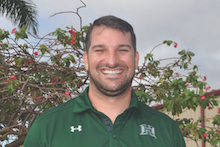 Alumnus Mark Dragich recently checked in about
his activities since graduating with an MS from TPSS in 2008. He’s now an
agricultural research associate at Monsanto, in the operations team of the company’s
breeding organization. He leads a team in field technology implementation and also works on field trials for fertilizer, water use, and other agronomy-related
topics to help maximize yields and minimize costs. As a grad student at CTAHR he worked in Janice Uchida’s
lab, studying the management of fungal diseases in basil and papaya.
He liked that, since he was dealing with real issues
that growers had, and his work had the potential to impact local producers positively.
What he does now is similar in that respect, he explains, but there’s much more
diversity in the projects. Working in industry is also much
more fast paced and requires much more responsibility than in grad school, so
it’s more challenging and exciting. He would like to thank all the faculty in the Plant Pathology grad
group and many in the Entomology group for their roles in fostering his development, especially Janice for setting high
standards and finding applied projects for him to work on, Chris Kadooka for teaching
the technical skills that he needed to succeed, Scot Nelson for having the most
“real life applicable” classes and for his mentoring, and current MS student Gerald
Crank for assisting with his experiments, even on the weekends! Alumnus Mark Dragich recently checked in about
his activities since graduating with an MS from TPSS in 2008. He’s now an
agricultural research associate at Monsanto, in the operations team of the company’s
breeding organization. He leads a team in field technology implementation and also works on field trials for fertilizer, water use, and other agronomy-related
topics to help maximize yields and minimize costs. As a grad student at CTAHR he worked in Janice Uchida’s
lab, studying the management of fungal diseases in basil and papaya.
He liked that, since he was dealing with real issues
that growers had, and his work had the potential to impact local producers positively.
What he does now is similar in that respect, he explains, but there’s much more
diversity in the projects. Working in industry is also much
more fast paced and requires much more responsibility than in grad school, so
it’s more challenging and exciting. He would like to thank all the faculty in the Plant Pathology grad
group and many in the Entomology group for their roles in fostering his development, especially Janice for setting high
standards and finding applied projects for him to work on, Chris Kadooka for teaching
the technical skills that he needed to succeed, Scot Nelson for having the most
“real life applicable” classes and for his mentoring, and current MS student Gerald
Crank for assisting with his experiments, even on the weekends!
|
The Ocean Inside
10/18/2017 Source: Office of Communication Services, CTAHR  Cliff Kapono, who received both his BS (MBB) and MS (MBBE)
from CTAHR and who is now a PhD candidate at UC San Diego, has been in the news
for the fascinating project he has created: the Surfer Biome Project. As he
travels around the world to surf, he takes samples from surfers’ bodies and
boards which are analyzed to see how intensive exposure to the ocean may alter
human microbiomes—and how their bodies change the biome of the particular area
of the ocean that they enter. As an article in the New York Times explains,
Cliff is looking for evidence that surfers are being exposed to genes for
antibiotic resistance in the ocean; he hasn’t found these yet, but he has
found evidence that surfers in the same area do have similar microbiomes associated
with their bodies, and he’s noticed that his own microbiome changes depending
on where he’s been surfing. Hawaii Business also has an article on this
fascinating project. Stay tuned for more information on this global quest! Cliff Kapono, who received both his BS (MBB) and MS (MBBE)
from CTAHR and who is now a PhD candidate at UC San Diego, has been in the news
for the fascinating project he has created: the Surfer Biome Project. As he
travels around the world to surf, he takes samples from surfers’ bodies and
boards which are analyzed to see how intensive exposure to the ocean may alter
human microbiomes—and how their bodies change the biome of the particular area
of the ocean that they enter. As an article in the New York Times explains,
Cliff is looking for evidence that surfers are being exposed to genes for
antibiotic resistance in the ocean; he hasn’t found these yet, but he has
found evidence that surfers in the same area do have similar microbiomes associated
with their bodies, and he’s noticed that his own microbiome changes depending
on where he’s been surfing. Hawaii Business also has an article on this
fascinating project. Stay tuned for more information on this global quest!
|
Congrats to Kylie
10/11/2017 Source: Office of Communication Services, CTAHR  Yay for Maui County junior
Extension agent Kylie Wong, who received a Roy A. Goff Memorial Scholarship in
support of her pursuit of an MS in Food Safety from Michigan State University!
Kylie’s Extension program focuses on farm food safety and sustainable
agriculture, particularly soil nutrient management, pest management, and
supporting Hawai‘i farmers in growing crops and producing value-added products. The Goff
Memorial Scholarship, in memory of county Extension agent and acting Extension director
Roy A. Goff, supports professional development of CTAHR Extension faculty and
staff and is managed by representatives of Epsilon Sigma Phi Extension
fraternity, Hawai‘i Extension Association of Family and Consumer Sciences,
Hawai‘i Association of Extension 4-H Agents, and Hawai‘i Association of County
Agricultural Agents. Yay for Maui County junior
Extension agent Kylie Wong, who received a Roy A. Goff Memorial Scholarship in
support of her pursuit of an MS in Food Safety from Michigan State University!
Kylie’s Extension program focuses on farm food safety and sustainable
agriculture, particularly soil nutrient management, pest management, and
supporting Hawai‘i farmers in growing crops and producing value-added products. The Goff
Memorial Scholarship, in memory of county Extension agent and acting Extension director
Roy A. Goff, supports professional development of CTAHR Extension faculty and
staff and is managed by representatives of Epsilon Sigma Phi Extension
fraternity, Hawai‘i Extension Association of Family and Consumer Sciences,
Hawai‘i Association of Extension 4-H Agents, and Hawai‘i Association of County
Agricultural Agents.
|
On His Own Turf
10/11/2017 Source: Office of Communication Services, CTAHR  The Landscape Industry Council of
Hawaii (LICH) annual conference is Hawai‘i’s premier green industry education event,
attended by approximately 250 landscape and turf professionals each
year. The 2017 LICH conference was held on
October 5 in Blaisdell Center. There Zhiqiang Cheng (PEPS) presented a seminar
on his latest research results on the management of several key landscape pests,
including coconut rhinoceros beetle, lobate lac scale, and Ficus stem
and leaf gall wasps, as well as his upcoming research
project on the control of frit fly, a common turfgrass pest affecting multiple
golf courses in Hawai‘i. Over 50 people, including landscapers, arborists,
HDOA staff, City and County of Honolulu staff, and CTAHR specialists and agent,
attended this seminar, for which Continuing Education Unit (CEU) credit was
offered. Students in Zhiqiang’s Turfgrass Pest Management class this semester
also attended the afternoon session of this conference as a part of their class
field trip. The Landscape Industry Council of
Hawaii (LICH) annual conference is Hawai‘i’s premier green industry education event,
attended by approximately 250 landscape and turf professionals each
year. The 2017 LICH conference was held on
October 5 in Blaisdell Center. There Zhiqiang Cheng (PEPS) presented a seminar
on his latest research results on the management of several key landscape pests,
including coconut rhinoceros beetle, lobate lac scale, and Ficus stem
and leaf gall wasps, as well as his upcoming research
project on the control of frit fly, a common turfgrass pest affecting multiple
golf courses in Hawai‘i. Over 50 people, including landscapers, arborists,
HDOA staff, City and County of Honolulu staff, and CTAHR specialists and agent,
attended this seminar, for which Continuing Education Unit (CEU) credit was
offered. Students in Zhiqiang’s Turfgrass Pest Management class this semester
also attended the afternoon session of this conference as a part of their class
field trip.
|
Yay for the Bay
10/11/2017 Source: Office of Communication Services, CTAHR  The students in NREM/PEPS
210 Introduction to Environmental Science have been busy this semester. A group
of students travelled to Kane‘ohe Bay early Saturday morning and collected invasive
seaweed and trash from the bay. Efforts from the students of NREM/PEPS 210 are impacting
the amount of seaweed in the section of the shore that the students clean. The patches
of invasive seaweed were smaller this year. The Waimanalo Research Station takes
the seaweed to compost and use in organic plots. Another group of NREM/PEPS 210
students spent their Saturday morning collecting trash from Manoa stream near the
Magoon Research facility. The students join Janice Uchida and Brent Sipes to give
their Saturday morning as a service learning project for their Environmental Science
class. The students in NREM/PEPS
210 Introduction to Environmental Science have been busy this semester. A group
of students travelled to Kane‘ohe Bay early Saturday morning and collected invasive
seaweed and trash from the bay. Efforts from the students of NREM/PEPS 210 are impacting
the amount of seaweed in the section of the shore that the students clean. The patches
of invasive seaweed were smaller this year. The Waimanalo Research Station takes
the seaweed to compost and use in organic plots. Another group of NREM/PEPS 210
students spent their Saturday morning collecting trash from Manoa stream near the
Magoon Research facility. The students join Janice Uchida and Brent Sipes to give
their Saturday morning as a service learning project for their Environmental Science
class.
|
Safe, Not Sorry
10/11/2017 Source: Office of Communication Services, CTAHR 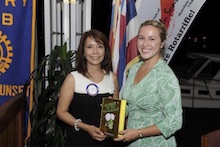 Aurora
Saulo (TPSS) addressed the Rotary Club of Honolulu on a topic that is a current
and ongoing community concern. The title of her presentation was “What’s All the
Fuss about Food Safety—Aren’t Our
Foods Safe?” She was invited to speak to the club by Emeritus professor and past
Club president Samir El-Swaify. Aurora discussed some fundamental issues about consumer
preferences; summarized the likely hazards faced in consumer handling of food commodities
and manufacturing of commercial products, especially in Hawai‘i’s tropical environment;
and responded to specific questions about the diverse varieties and sources of foodstuffs
and the rules and regulations designed to protect consumers. She then signed the
“book of the week” which the Club donates to Jefferson Elementary School toward
the enhancement of the school’s library. The Club members not only learned a lot,
but they were highly complimentary of Aurora’s factual presentation when it came
to particularly sensitive issues. Aurora
Saulo (TPSS) addressed the Rotary Club of Honolulu on a topic that is a current
and ongoing community concern. The title of her presentation was “What’s All the
Fuss about Food Safety—Aren’t Our
Foods Safe?” She was invited to speak to the club by Emeritus professor and past
Club president Samir El-Swaify. Aurora discussed some fundamental issues about consumer
preferences; summarized the likely hazards faced in consumer handling of food commodities
and manufacturing of commercial products, especially in Hawai‘i’s tropical environment;
and responded to specific questions about the diverse varieties and sources of foodstuffs
and the rules and regulations designed to protect consumers. She then signed the
“book of the week” which the Club donates to Jefferson Elementary School toward
the enhancement of the school’s library. The Club members not only learned a lot,
but they were highly complimentary of Aurora’s factual presentation when it came
to particularly sensitive issues.
|
To Kaua‘i via California and Southeast Asia
10/11/2017 Source: Office of Communication Services, CTAHR 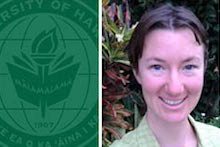 Welcome to Emilie Kirk, who has joined the UH Cooperative
Extension team in Kaua‘i County as junior Extension agent and Master Gardener
coordinator. She will provide Extension program leadership on edible crops, food safety and security, ag education and production,
and leadership development. Her stakeholders include commercial and subsistence
agricultural producers, urban and residential gardeners, and youth education programs.
Emilie has a BS in International Agricultural Development and an MS in Soils and
Biogeochemistry, both from UC-Davis. She also has specialized training in tropical
agriculture and permaculture design. As a grad student, Emilie worked with a
large interdisciplinary research team alongside academics, private industry, government
researchers, and land managers on a rice research project in the California Delta.
She has also worked with Australian researchers and the Lao government Agricultural
Extension service in southern Lao PDR as part of a research-for-development project
there, assessing impacts of on-farm research and Extension capacity-building
efforts as well as designing and delivering training workshops for junior Extension
staff. She is looking
forward to contributing to the many challenges facing agriculture on Kaua‘i. Get
in touch with her at 808-274-3478 or at erkirk@hawaii.edu. Welcome to Emilie Kirk, who has joined the UH Cooperative
Extension team in Kaua‘i County as junior Extension agent and Master Gardener
coordinator. She will provide Extension program leadership on edible crops, food safety and security, ag education and production,
and leadership development. Her stakeholders include commercial and subsistence
agricultural producers, urban and residential gardeners, and youth education programs.
Emilie has a BS in International Agricultural Development and an MS in Soils and
Biogeochemistry, both from UC-Davis. She also has specialized training in tropical
agriculture and permaculture design. As a grad student, Emilie worked with a
large interdisciplinary research team alongside academics, private industry, government
researchers, and land managers on a rice research project in the California Delta.
She has also worked with Australian researchers and the Lao government Agricultural
Extension service in southern Lao PDR as part of a research-for-development project
there, assessing impacts of on-farm research and Extension capacity-building
efforts as well as designing and delivering training workshops for junior Extension
staff. She is looking
forward to contributing to the many challenges facing agriculture on Kaua‘i. Get
in touch with her at 808-274-3478 or at erkirk@hawaii.edu.
|
The Golden AGHE
10/4/2017 Source: Office of Communication Services, CTAHR 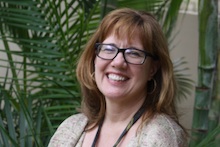 Loriena Yancura (FCS) was elected member-at-large
for the national board of the Association for Gerontology in Higher Education
(AGHE), a membership organization of colleges and universities that offer education,
training, and research programs in the field of aging. As member-at-large, Lori
joins the leadership team to help foster the commitment of higher education to the
field of aging through education, research, and public service. AGHE currently has
more than 160 institutional members throughout the United States, Canada, and abroad. Loriena Yancura (FCS) was elected member-at-large
for the national board of the Association for Gerontology in Higher Education
(AGHE), a membership organization of colleges and universities that offer education,
training, and research programs in the field of aging. As member-at-large, Lori
joins the leadership team to help foster the commitment of higher education to the
field of aging through education, research, and public service. AGHE currently has
more than 160 institutional members throughout the United States, Canada, and abroad.
|
Cleaning the Green
10/4/2017 Source: Office of Communication Services, CTAHR  Volunteers
gathered to help clean up the St. John Courtyard garden and then enjoy the free
pizza that followed while discussing how best to showcase this under-used and
overgrown oasis. The cleanup was a collaborative effort of the Horticulture Society,
Botany Department, Tropical Plant and Soil Sciences Department, Landscape Services
and UH Manoa Campus Arboretum. The volunteers did a great job--the Courtyard is
much improved, with more sunshine coming through the canopy, new plants growing
in pots, and much of the wildly proliferating undergrowth pruned away. Volunteers
gathered to help clean up the St. John Courtyard garden and then enjoy the free
pizza that followed while discussing how best to showcase this under-used and
overgrown oasis. The cleanup was a collaborative effort of the Horticulture Society,
Botany Department, Tropical Plant and Soil Sciences Department, Landscape Services
and UH Manoa Campus Arboretum. The volunteers did a great job--the Courtyard is
much improved, with more sunshine coming through the canopy, new plants growing
in pots, and much of the wildly proliferating undergrowth pruned away.
|
Extending Knowledge and Plants
10/4/2017 Source: Office of Communication Services, CTAHR  Sharon Motomura-Wages (TPSS) and
Kiersten Akahoshi (PEPS) organized a sweetpotato growers’ meeting in Hilo with over
20 attendees, approximately half of them commercial growers. The workshop featured
Christopher Clark and Arthur Villordon from Louisiana State University, who discussed
their program in Louisiana to produce virus-tested sweetpotato planting materials
for commercial growers. Then Hawai‘i County administrator Susan Miyasaka (TPSS)
talked about recent research results that demonstrated it was possible to
nearly double yield by using virus-tested ‘Okinawan’ planting materials rather
than those from a commercial source. Other speakers included Marisa Wall (USDA ARS
DKI PBARC) and Ishakh Pulakkatu-Thodi (PEPS). Virus-tested, tissue-cultured ‘Okinawan’
plants were distributed to growers who attended the meeting. Sharon Motomura-Wages (TPSS) and
Kiersten Akahoshi (PEPS) organized a sweetpotato growers’ meeting in Hilo with over
20 attendees, approximately half of them commercial growers. The workshop featured
Christopher Clark and Arthur Villordon from Louisiana State University, who discussed
their program in Louisiana to produce virus-tested sweetpotato planting materials
for commercial growers. Then Hawai‘i County administrator Susan Miyasaka (TPSS)
talked about recent research results that demonstrated it was possible to
nearly double yield by using virus-tested ‘Okinawan’ planting materials rather
than those from a commercial source. Other speakers included Marisa Wall (USDA ARS
DKI PBARC) and Ishakh Pulakkatu-Thodi (PEPS). Virus-tested, tissue-cultured ‘Okinawan’
plants were distributed to growers who attended the meeting.
|
Passion for Fashion Innovation
10/4/2017 Source: Office of Communication Services, CTAHR  Shu Hwa
Lin (FDM) shared cutting-edge fashion technology with fashion design students in UH Maui College’s Fashion Technology program during the recent International Symposium on Wearable Computers (ISWC) Conference. She volunteered
to conduct body scanning and demonstrated the use of shared public-domain software
to edit the fashion “avatars” created by the scans, digital figures that can be
used to help with fit when designing clothing. Students were excited to use the
3D printer in UHMC’s library to print 7-inch statues of their own scanned figures! Shu Hwa
Lin (FDM) shared cutting-edge fashion technology with fashion design students in UH Maui College’s Fashion Technology program during the recent International Symposium on Wearable Computers (ISWC) Conference. She volunteered
to conduct body scanning and demonstrated the use of shared public-domain software
to edit the fashion “avatars” created by the scans, digital figures that can be
used to help with fit when designing clothing. Students were excited to use the
3D printer in UHMC’s library to print 7-inch statues of their own scanned figures!
|
Cowpeas—Not Just for Cows!
10/4/2017 Source: Office of Communication Services, CTAHR 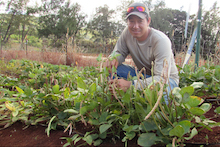 Jensen
Uyeda (TPSS) led a cowpea field day at the Poamoho Research Station last week that
offered its 15–20 participants food for thought and for the ‘opu. The legumes have
low water requirements and are nitrogen fixing, so they can be used as a cover
crops or as part of crop rotations. They also have commercial potential: while
Hawai‘i cannot compete on the commodity scale, Jensen is examining their potential
for the local niche market, including high-end restaurants. Cowpeas come in various
flavors and colors; a commonly known variety is black-eyed peas, but they can
also be eaten green, like edamame, or in the pod like green beans. To show how
good they can be, guest chef Dr Lauren Tamamoto from the KCC
Culinary Innovation Center prepared cowpea salsa, salad, and other dishes for the
participants. In her Asian Cowpea Rice, green cowpeas are combined with white
rice, nametake, and furikake for a locally inflected taste sensation. Check out
cowpeas today! Jensen
Uyeda (TPSS) led a cowpea field day at the Poamoho Research Station last week that
offered its 15–20 participants food for thought and for the ‘opu. The legumes have
low water requirements and are nitrogen fixing, so they can be used as a cover
crops or as part of crop rotations. They also have commercial potential: while
Hawai‘i cannot compete on the commodity scale, Jensen is examining their potential
for the local niche market, including high-end restaurants. Cowpeas come in various
flavors and colors; a commonly known variety is black-eyed peas, but they can
also be eaten green, like edamame, or in the pod like green beans. To show how
good they can be, guest chef Dr Lauren Tamamoto from the KCC
Culinary Innovation Center prepared cowpea salsa, salad, and other dishes for the
participants. In her Asian Cowpea Rice, green cowpeas are combined with white
rice, nametake, and furikake for a locally inflected taste sensation. Check out
cowpeas today!
|
Bad News From the ROD Squad
10/4/2017 Source: Office of Communication Services, CTAHR 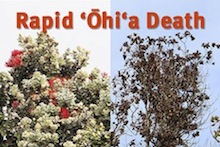 Despite the tireless
efforts of the ROD Squad, members of the college and collaborating institutions
tasked with containing the spread of Rapid ‘Ohi‘a Death, the devastating
disease was recently found in North Kohala, which means that it is now present
in every district on the Big Island. Extension forester J.B. Friday (NREM) was
interviewed for this Hawaii Tribune-Herald article on the discovery, explaining
that there’s still hope that the disease can be contained and will be manageable,
and work will continue to make sure that happens. Despite the tireless
efforts of the ROD Squad, members of the college and collaborating institutions
tasked with containing the spread of Rapid ‘Ohi‘a Death, the devastating
disease was recently found in North Kohala, which means that it is now present
in every district on the Big Island. Extension forester J.B. Friday (NREM) was
interviewed for this Hawaii Tribune-Herald article on the discovery, explaining
that there’s still hope that the disease can be contained and will be manageable,
and work will continue to make sure that happens.
|
All Creatures Great and Small
10/4/2017 Source: Office of Communication Services, CTAHR 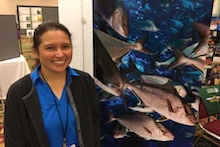 CTAHR alumna Raquel Wong, DVM, was on hand to educate the
public at last month’s Ag 2017 conference. Raquel, the State Veterinarian and
the administrator of the Animal Industry Division of the Hawai‘i Department of Agriculture, is tasked with protecting
Hawai‘i’s livestock and poultry industries through the control and prevention
of pests and diseases. This includes maintaining the animal quarantine
program and the State Veterinary Laboratory, as well as providing aquaculture
and livestock support services. This ANSC grad is in charge of disease
investigation for both livestock and domestic animals, with both keeping out
diseases we don’t have in the Islands and dealing with those we do. Thanks,
Raquel! CTAHR alumna Raquel Wong, DVM, was on hand to educate the
public at last month’s Ag 2017 conference. Raquel, the State Veterinarian and
the administrator of the Animal Industry Division of the Hawai‘i Department of Agriculture, is tasked with protecting
Hawai‘i’s livestock and poultry industries through the control and prevention
of pests and diseases. This includes maintaining the animal quarantine
program and the State Veterinary Laboratory, as well as providing aquaculture
and livestock support services. This ANSC grad is in charge of disease
investigation for both livestock and domestic animals, with both keeping out
diseases we don’t have in the Islands and dealing with those we do. Thanks,
Raquel!
|
Conservation for the Community
10/4/2017 Source: Office of Communication Services, CTAHR  CTAHR Notes had the pleasure of running
into NREM alumna Francesca “Frankie” Koethe at the recent statewide ag
conference. Now a conservation assistant with the O‘ahu Resource Conservation
and Development Council, Frankie did her MS research under the mentorship of
Linda Cox, focusing on the sustainability
and environmental health perceptions of a rural community in Kaua‘i, while her
BS was in zoology and animal biology. While at CTAHR she worked as a teaching
assistant, and now at O‘ahu RC&D she helps farmers to
steward natural resources and supports agriculture and conservation throughout
the island. She’s helping to promote a series of workshops for women farmers
sponsored by the Council,
which will be held October 10, 12, 17,
and 19 on O‘ahu, Kaua‘i, Maui, and the Big Island respectively. Her energy,
enthusiasm, and expertise fuel her outreach to the community, and O‘ahu
RC&D is lucky to have her! CTAHR Notes had the pleasure of running
into NREM alumna Francesca “Frankie” Koethe at the recent statewide ag
conference. Now a conservation assistant with the O‘ahu Resource Conservation
and Development Council, Frankie did her MS research under the mentorship of
Linda Cox, focusing on the sustainability
and environmental health perceptions of a rural community in Kaua‘i, while her
BS was in zoology and animal biology. While at CTAHR she worked as a teaching
assistant, and now at O‘ahu RC&D she helps farmers to
steward natural resources and supports agriculture and conservation throughout
the island. She’s helping to promote a series of workshops for women farmers
sponsored by the Council,
which will be held October 10, 12, 17,
and 19 on O‘ahu, Kaua‘i, Maui, and the Big Island respectively. Her energy,
enthusiasm, and expertise fuel her outreach to the community, and O‘ahu
RC&D is lucky to have her!
|
September
Managing a Wicked Problem
9/27/2017 Source: Office of Communication Services, CTAHR 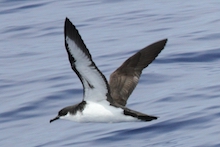 There’s a special collection of papers titled Scaling Up Restoration Efforts in the Pacific Islands co-edited by Melissa
Price (NREM) that are published in “early view” form in the journal Pacific Science
(scroll down). The collection features five articles co-authored by current and
former NREM faculty including Clay Trauernicht, Creighton Litton, Kirsten Oleson,
and Chris Lepczyk, who’s now at Auburn University. Current NREM students and
alumni represented include Matt Lucas, Julia Rowe, Lisa Ellsworth, and Selita Ammondt.
The papers’ subjects range from the economics of dry forest restoration to the
impact of endangered seabirds on nutrient cycling and the problems of nonnative
ungulates. The collection comprises “a call for clear management objectives, targeted research
to minimize uncertainty, and innovative solutions to a wicked problem,”
and it’s well worth a read! There’s a special collection of papers titled Scaling Up Restoration Efforts in the Pacific Islands co-edited by Melissa
Price (NREM) that are published in “early view” form in the journal Pacific Science
(scroll down). The collection features five articles co-authored by current and
former NREM faculty including Clay Trauernicht, Creighton Litton, Kirsten Oleson,
and Chris Lepczyk, who’s now at Auburn University. Current NREM students and
alumni represented include Matt Lucas, Julia Rowe, Lisa Ellsworth, and Selita Ammondt.
The papers’ subjects range from the economics of dry forest restoration to the
impact of endangered seabirds on nutrient cycling and the problems of nonnative
ungulates. The collection comprises “a call for clear management objectives, targeted research
to minimize uncertainty, and innovative solutions to a wicked problem,”
and it’s well worth a read!
|
Get the Poop
9/27/2017 Source: Office of Communication Services, CTAHR 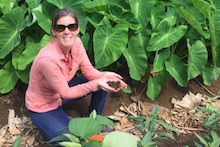 This week’s installment of the NREM seminar series featured Rebecca
Ryals, who presented “Closing the Poop Loop: Transforming human waste to combat climate change and
enhance resilience of agroecosystems.” As Rebecca explains, “Over 2.6 billion people lack access
to improved sanitation, leading to millions of tons of nutrient-rich, but
pathogenic, fecal waste being discarded into urban and rural ecosystems every
year. Ecological sanitation (EcoSan) attempts to repair the broken water,
nutrient, and carbon cycles associated with this waste stream, while
simultaneously eliminating pathogens and producing organic amendment resources.”
Her lab is collaborating with the NGO Sustainable Organic Integrated
Livelihoods (SOIL) in Haiti to quantify the climate benefits of EcoSan through
soil carbon sequestration and reduction of greenhouse gas emissions. This week’s installment of the NREM seminar series featured Rebecca
Ryals, who presented “Closing the Poop Loop: Transforming human waste to combat climate change and
enhance resilience of agroecosystems.” As Rebecca explains, “Over 2.6 billion people lack access
to improved sanitation, leading to millions of tons of nutrient-rich, but
pathogenic, fecal waste being discarded into urban and rural ecosystems every
year. Ecological sanitation (EcoSan) attempts to repair the broken water,
nutrient, and carbon cycles associated with this waste stream, while
simultaneously eliminating pathogens and producing organic amendment resources.”
Her lab is collaborating with the NGO Sustainable Organic Integrated
Livelihoods (SOIL) in Haiti to quantify the climate benefits of EcoSan through
soil carbon sequestration and reduction of greenhouse gas emissions.
|
Before the Board
9/27/2017 Source: Office of Communication Services, CTAHR  UH President
Lassner’s most recent report to the Board of Regents included two
CTAHR-associated projects and initiatives: the research into native sugarcane
that is being undertaken by Noa Lincoln and Ted Radovich (both TPSS) at the Waimanalo and
Poamoho research stations and the UH systemwide student food security study
that, though he does not mention it, was spearheaded by HNFAS students
Surely Wallace and Danita Dahl based on a project they undertook in Joannie
Dobbs’s class on food systems. Great work, CTAHR! UH President
Lassner’s most recent report to the Board of Regents included two
CTAHR-associated projects and initiatives: the research into native sugarcane
that is being undertaken by Noa Lincoln and Ted Radovich (both TPSS) at the Waimanalo and
Poamoho research stations and the UH systemwide student food security study
that, though he does not mention it, was spearheaded by HNFAS students
Surely Wallace and Danita Dahl based on a project they undertook in Joannie
Dobbs’s class on food systems. Great work, CTAHR!
|
Budding Horticulturists
9/27/2017 Source: Office of Communication Services, CTAHR 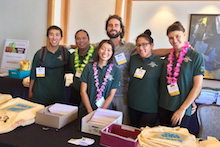 TPSS graduate students attended the recent ASHS conference in
droves, partly thanks to Robert Paull, who secured travel grants from ASHS, and
to grad student Kauahi Perez, who successfully competed for a grant from the SAPFB. Aside
from being an immense help at the registration table, TPSS graduate students
shared their research: Aimee Uyehara, Tia Silvasy, and Kauahi Perez gave
oral presentations, and Roshan Paudel, Dylan Oates, Emily Teng, Russel Galanti,
Mitchel Loo, Peter Toves, and Colin Hart presented in poster sessions. A.J. Lindsey, mentored by Joe DeFrank and Zhiqiang Cheng (PEPS), won 2nd
place in the Graduate Student (M.Sc.) Poster
Competition with his presentation on “Response of Seashore Papalum, Bermudagrass,
and Goosegrass to Post-emergent Herbicides.” Kauahi also participated in Scholars Ignite!
and Teachers Ignite! TPSS alumni Scott Lukas and Gabriel Sachter-Smith also
made an appearance, presenting their research findings at this conference. Way
to go! TPSS graduate students attended the recent ASHS conference in
droves, partly thanks to Robert Paull, who secured travel grants from ASHS, and
to grad student Kauahi Perez, who successfully competed for a grant from the SAPFB. Aside
from being an immense help at the registration table, TPSS graduate students
shared their research: Aimee Uyehara, Tia Silvasy, and Kauahi Perez gave
oral presentations, and Roshan Paudel, Dylan Oates, Emily Teng, Russel Galanti,
Mitchel Loo, Peter Toves, and Colin Hart presented in poster sessions. A.J. Lindsey, mentored by Joe DeFrank and Zhiqiang Cheng (PEPS), won 2nd
place in the Graduate Student (M.Sc.) Poster
Competition with his presentation on “Response of Seashore Papalum, Bermudagrass,
and Goosegrass to Post-emergent Herbicides.” Kauahi also participated in Scholars Ignite!
and Teachers Ignite! TPSS alumni Scott Lukas and Gabriel Sachter-Smith also
made an appearance, presenting their research findings at this conference. Way
to go!
|
OMG, TPSS (& PEPS) @ ASHS!
9/27/2017 Source: Office of Communication Services, CTAHR 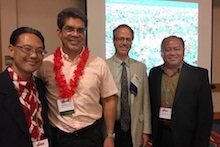 The American Society for Horticultural Science
(ASHS) held its 114th Annual Conference
at the Hilton Waikoloa Village. TPSS faculty and students were standouts, bringing recognition and
visibility to Hawaiian horticulture. A team led by Kent Kobayashi offered the “Welcome
to Hawai’i” session. Jonathan Deenik was honored with the plenary address, offering
a talk on “Atolls to High Volcanoes: Soil Diversity and Agricultural Adaptation
Across Micronesia.” Noa Lincoln won the award for best Early Career Presentation
with a talk on “Reviving Indigenous Crops and Cropping Systems.” AD for Extension Kelvin Sewake (right) and CTAHR’s 2017 Ka Lei Hano award winner Eric
Tanouye (left) gave a talk at the ASHS Extension Division Luncheon on “The Importance of Partnership for the Hawaii Floriculture Industry: An
Extension and Industry Perspective.” A host of other
TPSS faculty and staff, including Tessie Amore, Orville Baldos, Alyssa Cho, Joanne
Imamura, Andrea Kawabata, Kent Kobayahi, Ken Leonhardt, Richard Manshardt, Susan
Miyasaka, Cynthia Nazario-Leary, Robert Paull, and Ted Radovich, offered presentations and posters. PEPS was also ably represented by Zhiqiang Cheng, who joined with Rich Criley (TPSS Emeritus) to present on propagation and pests at the Ficus Workshop. ASHS was lucky to have them! The American Society for Horticultural Science
(ASHS) held its 114th Annual Conference
at the Hilton Waikoloa Village. TPSS faculty and students were standouts, bringing recognition and
visibility to Hawaiian horticulture. A team led by Kent Kobayashi offered the “Welcome
to Hawai’i” session. Jonathan Deenik was honored with the plenary address, offering
a talk on “Atolls to High Volcanoes: Soil Diversity and Agricultural Adaptation
Across Micronesia.” Noa Lincoln won the award for best Early Career Presentation
with a talk on “Reviving Indigenous Crops and Cropping Systems.” AD for Extension Kelvin Sewake (right) and CTAHR’s 2017 Ka Lei Hano award winner Eric
Tanouye (left) gave a talk at the ASHS Extension Division Luncheon on “The Importance of Partnership for the Hawaii Floriculture Industry: An
Extension and Industry Perspective.” A host of other
TPSS faculty and staff, including Tessie Amore, Orville Baldos, Alyssa Cho, Joanne
Imamura, Andrea Kawabata, Kent Kobayahi, Ken Leonhardt, Richard Manshardt, Susan
Miyasaka, Cynthia Nazario-Leary, Robert Paull, and Ted Radovich, offered presentations and posters. PEPS was also ably represented by Zhiqiang Cheng, who joined with Rich Criley (TPSS Emeritus) to present on propagation and pests at the Ficus Workshop. ASHS was lucky to have them!
|
4-H and Fun
9/27/2017 Source: Office of Communication Services, CTAHR 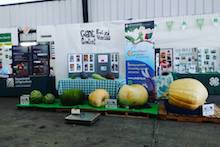 East Hawai‘i 4-H made a great showing at the 67th
Hawai‘i County Fair, which ran September 21-24. Forty-five 4-H members and
leaders each completed one or more 4-hour shifts during the long weekend. Hawai‘i
County Extension agent Becky Settlage said “it was a productive but fun 4 days!” They set four state records in the Giant Fruit & Vegetable Contest,
including a giant kalo (20.86 pounds), watermelon (59.3 pounds), bushel gourd (137.6 pounds) and tomato (2.23 pounds)! Over 1000 children
went through the 4-H petting zoo, meeting baby chicks, ducklings, rabbits,
goats, sheep, and horses. From the petting zoo, children were sent to Germ City,
where 4-H members taught them the importance of proper hand-washing. 4-H'ers
also had a Make & Take craft area where participants turned beads into floral
and gecko key chains. Equally well attended was the Wii Games area, where as part
of a 4-H Healthy Living program called “Get Moving for Health (GM4-H),” visitors
were welcome to play a round of Wii tennis, bowling, baseball, or golf. When they
were done, they could sign a pledge “to Make Being Active Part of My Every Day Lifestyle.” Of course, one of the best ways to stay active is by joining 4-H! East Hawai‘i 4-H made a great showing at the 67th
Hawai‘i County Fair, which ran September 21-24. Forty-five 4-H members and
leaders each completed one or more 4-hour shifts during the long weekend. Hawai‘i
County Extension agent Becky Settlage said “it was a productive but fun 4 days!” They set four state records in the Giant Fruit & Vegetable Contest,
including a giant kalo (20.86 pounds), watermelon (59.3 pounds), bushel gourd (137.6 pounds) and tomato (2.23 pounds)! Over 1000 children
went through the 4-H petting zoo, meeting baby chicks, ducklings, rabbits,
goats, sheep, and horses. From the petting zoo, children were sent to Germ City,
where 4-H members taught them the importance of proper hand-washing. 4-H'ers
also had a Make & Take craft area where participants turned beads into floral
and gecko key chains. Equally well attended was the Wii Games area, where as part
of a 4-H Healthy Living program called “Get Moving for Health (GM4-H),” visitors
were welcome to play a round of Wii tennis, bowling, baseball, or golf. When they
were done, they could sign a pledge “to Make Being Active Part of My Every Day Lifestyle.” Of course, one of the best ways to stay active is by joining 4-H!
|
Help for the Kupuna
9/27/2017 Source: Office of Communication Services, CTAHR .jpg) CTAHR
Notes recently caught up with Fam-R alumna Samantha Tio (Tsoi), LSW,
who’s the director of social services at Hale Ho Aloha Nursing Home.
Samantha’s been in this personally and professionally fulfilling position for
almost ten years now, and she credits her professors and program at CTAHR with
getting her started on her journey. She graduated
with a B.S. and a Certificate in Aging in 2004, worked at an adult daycare for
a year, then returned for her MSW with a concentration in Gerontology and LSW
at UH. She writes, “My undergraduate degree paved
the foundation for where I am today. It enticed me to get into gerontology and
constantly stimulated me to want more. The FAMR—now HDFS—professors
were so involved and encouraging during my studies. I never tired of learning because they made learning fun
and interesting; they knew how to keep things exciting. They were very hands-on
and gave sound advice. I learned the importance of networking and being
involved within the community. Plus, I felt like I came out of my shell more; I
was less shy and more assertive with what I wanted in my life.” The kupuna
of our community must be grateful that Samantha discovered what she wanted to
do with her life—to make their lives better! CTAHR
Notes recently caught up with Fam-R alumna Samantha Tio (Tsoi), LSW,
who’s the director of social services at Hale Ho Aloha Nursing Home.
Samantha’s been in this personally and professionally fulfilling position for
almost ten years now, and she credits her professors and program at CTAHR with
getting her started on her journey. She graduated
with a B.S. and a Certificate in Aging in 2004, worked at an adult daycare for
a year, then returned for her MSW with a concentration in Gerontology and LSW
at UH. She writes, “My undergraduate degree paved
the foundation for where I am today. It enticed me to get into gerontology and
constantly stimulated me to want more. The FAMR—now HDFS—professors
were so involved and encouraging during my studies. I never tired of learning because they made learning fun
and interesting; they knew how to keep things exciting. They were very hands-on
and gave sound advice. I learned the importance of networking and being
involved within the community. Plus, I felt like I came out of my shell more; I
was less shy and more assertive with what I wanted in my life.” The kupuna
of our community must be grateful that Samantha discovered what she wanted to
do with her life—to make their lives better!
|
Fall Fun & Games
9/27/2017 Source: Office of Communication Services, CTAHR 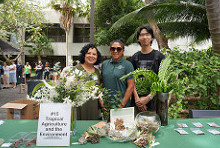 CTAHR Fall Fair, the college’s 27th annual fall welcome-back
event, drew over 200 students, faculty, and staff, including Dean Comerford. Representatives
from CTAHR’s departments and clubs vied for votes with cool demos, fun activities,
and awesome giveaways, while students fiercely competed in the ice cream-eating
competition—Rodolfo Ramirez, the winner of that contest, earned the Ice Cream party
for FSHN. The Biological Engineering Student Association won $500 for having
the “Best Table,” and the Tropical Agriculture and the Environment program won $1000
to use towards student activities for “Greatest Attendance.” And six lucky
folks won raffle prizes. Throughout the festivities, students, faculty, and staff
enjoyed free food, as well as ice cream and popsicles generously donated once again
by Meadow Gold Dairies of Hawaii. Thank-yous go to all who attended the bash, especially
the outstanding contestants! Big mahalos go out to Meadow Gold for its continued
support; Joannie Dobbs; the NREM department for the use of their facilities; Ray
Uchida of the O‘ahu Extension Office and Lito Cacho and Richard Fisher of Pearl
City UGC for tent coverage and tables; Ryan Kurasaki for tables; co-emcees Cody
Ching and Michelle Au for keeping it lively; and all other volunteers! CTAHR Fall Fair, the college’s 27th annual fall welcome-back
event, drew over 200 students, faculty, and staff, including Dean Comerford. Representatives
from CTAHR’s departments and clubs vied for votes with cool demos, fun activities,
and awesome giveaways, while students fiercely competed in the ice cream-eating
competition—Rodolfo Ramirez, the winner of that contest, earned the Ice Cream party
for FSHN. The Biological Engineering Student Association won $500 for having
the “Best Table,” and the Tropical Agriculture and the Environment program won $1000
to use towards student activities for “Greatest Attendance.” And six lucky
folks won raffle prizes. Throughout the festivities, students, faculty, and staff
enjoyed free food, as well as ice cream and popsicles generously donated once again
by Meadow Gold Dairies of Hawaii. Thank-yous go to all who attended the bash, especially
the outstanding contestants! Big mahalos go out to Meadow Gold for its continued
support; Joannie Dobbs; the NREM department for the use of their facilities; Ray
Uchida of the O‘ahu Extension Office and Lito Cacho and Richard Fisher of Pearl
City UGC for tent coverage and tables; Ryan Kurasaki for tables; co-emcees Cody
Ching and Michelle Au for keeping it lively; and all other volunteers!
|
Fire on the Mountain!
9/27/2017 Source: Office of Communication Services, CTAHR 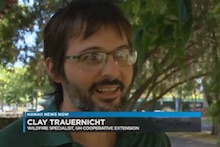 Clay Trauernicht (NREM) was interviewed for Hawaii News Now’s
story on a wildfire that is threatening Kaua‘i’s Na Pali coast, one of several
wildfires that have recently hit the state. Clay points out that although much
of the state has been under drought conditions since July, this area of Kaua‘i is
not officially designated as drought stricken, but it was still dry enough to
spark the fire. It’s not that the trees themselves dry out, he explains, but
the underbrush beneath them that acts as tinder and catches flame. The Kalalau
Trail has been closed, but the fire is not directly menacing it at this time. Clay Trauernicht (NREM) was interviewed for Hawaii News Now’s
story on a wildfire that is threatening Kaua‘i’s Na Pali coast, one of several
wildfires that have recently hit the state. Clay points out that although much
of the state has been under drought conditions since July, this area of Kaua‘i is
not officially designated as drought stricken, but it was still dry enough to
spark the fire. It’s not that the trees themselves dry out, he explains, but
the underbrush beneath them that acts as tinder and catches flame. The Kalalau
Trail has been closed, but the fire is not directly menacing it at this time.
|
Looking Like a Victim?
9/20/2017 Source: Office of Communication Services, CTAHR 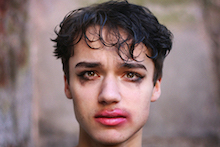 Andy Reilly (FDM) has co-authored a new publication, “Dress,
Body, and Experiences of Victimization,” published in the journal Fashion,
Style & Popular Culture. It elucidates perceived relationships between
aspects of appearance and experiences of any form of victimization from the perspective
of survivors. He and his co-author Kim Johnson addressed three research
questions: (1) what connection, if any, did survivors draw between their
appearance and their experience of victimization? (2) What changes, if any, did
survivors make to their appearance after their experience(s)? And (3) what
advice on appearance, if any, would survivors give to others as a result of
their experience? Five women and three men completed interviews. Participants
identified appearance cues as stimuli evoking others’ behaviors towards them,
and both general appearance attributes and specific attributes were credited with
eliciting negative behaviors. The authors discovered that experiences with
victimization often occurred when the individual was attempting to move into a
culture that was new to them and that most participants altered or made
adjustments to their appearance as a result of their victimization experience. Andy Reilly (FDM) has co-authored a new publication, “Dress,
Body, and Experiences of Victimization,” published in the journal Fashion,
Style & Popular Culture. It elucidates perceived relationships between
aspects of appearance and experiences of any form of victimization from the perspective
of survivors. He and his co-author Kim Johnson addressed three research
questions: (1) what connection, if any, did survivors draw between their
appearance and their experience of victimization? (2) What changes, if any, did
survivors make to their appearance after their experience(s)? And (3) what
advice on appearance, if any, would survivors give to others as a result of
their experience? Five women and three men completed interviews. Participants
identified appearance cues as stimuli evoking others’ behaviors towards them,
and both general appearance attributes and specific attributes were credited with
eliciting negative behaviors. The authors discovered that experiences with
victimization often occurred when the individual was attempting to move into a
culture that was new to them and that most participants altered or made
adjustments to their appearance as a result of their victimization experience.
|
4-H Is Growing
9/20/2017 Source: Office of Communication Services, CTAHR 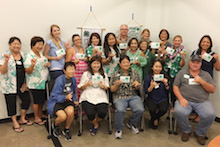 Hawai‘i
4-H launched the 4-H Grows Campaign this past Saturday when leaders
from the four major Hawai‘i 4-H affiliate groups came together for an amazing
4-H Grows training session, which should have a significant impact on the
future of Hawai‘i 4-H. A big thank-you goes to National 4-H Council staff Jen
McIver and Andrea Omer, who came out to O‘ahu to conduct this valuable
training. Check out the 4-H Grows Here video here! Hawai‘i
4-H launched the 4-H Grows Campaign this past Saturday when leaders
from the four major Hawai‘i 4-H affiliate groups came together for an amazing
4-H Grows training session, which should have a significant impact on the
future of Hawai‘i 4-H. A big thank-you goes to National 4-H Council staff Jen
McIver and Andrea Omer, who came out to O‘ahu to conduct this valuable
training. Check out the 4-H Grows Here video here!
|
A Plethora of Pests
9/20/2017 Source: Office of Communication Services, CTAHR 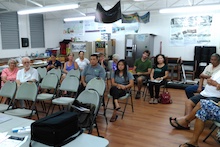 Attendees
learned about important new landscape pests in Hawai‘i at the Waimanalo
Agricultural Association’s bi-monthly meeting, held at the Waimanalo Research Station. Zhiqiang Cheng (PEPS) was invited to present a seminar, at which
he discussed several key new and troublesome landscape pests to the Islands,
including Ficus stem and leaf gall wasps, lobate lac scale, and coconut
rhinoceros beetle. About 20 participants, including landscaping/ornamental
nursery owners, farmers, and Hawaii Farm Bureau staff, also got hands-on
experience with real pest specimens Zhiqiang brought. The meeting host was Shannon
Alivado, a UHM alumna and an associate in the 2013 Windward GoFarm program, in
which Zhiqiang had taught a class. Attendees
learned about important new landscape pests in Hawai‘i at the Waimanalo
Agricultural Association’s bi-monthly meeting, held at the Waimanalo Research Station. Zhiqiang Cheng (PEPS) was invited to present a seminar, at which
he discussed several key new and troublesome landscape pests to the Islands,
including Ficus stem and leaf gall wasps, lobate lac scale, and coconut
rhinoceros beetle. About 20 participants, including landscaping/ornamental
nursery owners, farmers, and Hawaii Farm Bureau staff, also got hands-on
experience with real pest specimens Zhiqiang brought. The meeting host was Shannon
Alivado, a UHM alumna and an associate in the 2013 Windward GoFarm program, in
which Zhiqiang had taught a class.
|
Getting to Know the Garden Isle
9/20/2017 Source: Office of Communication Services, CTAHR 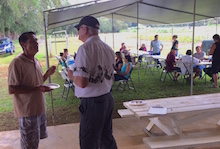 Dean Comerford, along with Interim
AD for Extension Kelvin Sewake, visited Kaua‘i on September 7 to meet with
faculty and staff, inspect CTAHR facilities, and become acquainted with
stakeholders and clientele. High points included stops at Kauai Coffee Company
(the largest coffee farm in the U.S.), the Cooperative Extension office in Lihu‘e,
the Ornellas Tropical Fruit Farm, and the Kaua‘i Agricultural Research Station
in Wailua. The visit concluded in late afternoon with a traditional pau hana, where the Dean got
to meet with members of the Board of the Kaua‘i County Farm Bureau, the Kaua‘i
Office of Economic Development, the 4-H program, the Master Gardeners’ program,
the Taro Growers’ Association, Kauai Invasive Species Committee, and other
farmers and CTAHR supporters in the community. Here Dean Comerford speaks with
John Gordines, president of Kauai County Farm Bureau, at the pau hana. Dean Comerford, along with Interim
AD for Extension Kelvin Sewake, visited Kaua‘i on September 7 to meet with
faculty and staff, inspect CTAHR facilities, and become acquainted with
stakeholders and clientele. High points included stops at Kauai Coffee Company
(the largest coffee farm in the U.S.), the Cooperative Extension office in Lihu‘e,
the Ornellas Tropical Fruit Farm, and the Kaua‘i Agricultural Research Station
in Wailua. The visit concluded in late afternoon with a traditional pau hana, where the Dean got
to meet with members of the Board of the Kaua‘i County Farm Bureau, the Kaua‘i
Office of Economic Development, the 4-H program, the Master Gardeners’ program,
the Taro Growers’ Association, Kauai Invasive Species Committee, and other
farmers and CTAHR supporters in the community. Here Dean Comerford speaks with
John Gordines, president of Kauai County Farm Bureau, at the pau hana.
|
Bee at Home
9/20/2017 Source: Office of Communication Services, CTAHR 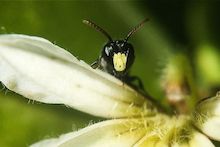 CTAHR alumna and Star-Advertiser garden columnist Heidi Bornhorst
has written a column about the native yellow-faced bee, including things we can
do to help protect this endangered and beneficial insect: plant native plants,
volunteer to restore coastal ecosystems, and don’t break the branches off
coastal trees, which might be harboring bee eggs. She also discusses Jason
Graham’s (PEPS) research and outreach concerning the bees, including work he
recently did with ‘Iolani students to use 3-D printing to make egg-laying
structures for the artificial nest boxes he is creating to protect the solitary
bees from invasive ants! CTAHR alumna and Star-Advertiser garden columnist Heidi Bornhorst
has written a column about the native yellow-faced bee, including things we can
do to help protect this endangered and beneficial insect: plant native plants,
volunteer to restore coastal ecosystems, and don’t break the branches off
coastal trees, which might be harboring bee eggs. She also discusses Jason
Graham’s (PEPS) research and outreach concerning the bees, including work he
recently did with ‘Iolani students to use 3-D printing to make egg-laying
structures for the artificial nest boxes he is creating to protect the solitary
bees from invasive ants!
|
Flying High With Fruit Flies
9/20/2017 Source: Office of Communication Services, CTAHR 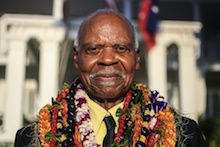 CTAHR’s
2017 Outstanding Alumnus Ernest J. Harris has been inducted into the
Agricultural Research Service (ARS) Hall of Fame, which recognizes scientists
for their innovative and impactful scientific contributions to the nation and
the world. Dr. Harris has certainly made those—after receiving his degree in
Entomology from CTAHR, he went on to become internationally recognized for his
innovative and effective methods for controlling tephritid fruit flies, a major
agricultural pest worldwide. The honor is also mentioned in the
Star-Advertiser.
The award
is only the latest for Dr. Harris, who received a Congressional Medal
of Honor last year for helping to break the racial barrier as one of the first
African-American Marines, and other honors. CTAHR’s
2017 Outstanding Alumnus Ernest J. Harris has been inducted into the
Agricultural Research Service (ARS) Hall of Fame, which recognizes scientists
for their innovative and impactful scientific contributions to the nation and
the world. Dr. Harris has certainly made those—after receiving his degree in
Entomology from CTAHR, he went on to become internationally recognized for his
innovative and effective methods for controlling tephritid fruit flies, a major
agricultural pest worldwide. The honor is also mentioned in the
Star-Advertiser.
The award
is only the latest for Dr. Harris, who received a Congressional Medal
of Honor last year for helping to break the racial barrier as one of the first
African-American Marines, and other honors.
|
Volunteers Extraordinaire
9/20/2017 Source: Office of Communication Services, CTAHR  Glen Fukumoto and Jonathan Deenik (both TPSS) were jointly named the
Winrock Volunteers of the Month
for their educational and inspiring trip to Myanmar to offer workshops and
demonstrations on composting and soil health. Winrock International posted a
laudatory article about the positive qualities that make them such influential
and requested volunteers (this is the third time they’ve gone to Myanmar!):
they have “strong
technical expertise, high cultural sensitivity, the ability to adapt to and
understand local farmers’ needs, an impressive teaching style, and
complimentary qualities to form an effective team.”
Great stuff! The humble pair characteristically are quoted as praising their
hosts in Myanmar and the Winrock program. Their advice to other would-be
volunteers? Be patient, be open minded, and remember to have fun! They also
share more details about soil quality and resilience in a blog post here. Glen Fukumoto and Jonathan Deenik (both TPSS) were jointly named the
Winrock Volunteers of the Month
for their educational and inspiring trip to Myanmar to offer workshops and
demonstrations on composting and soil health. Winrock International posted a
laudatory article about the positive qualities that make them such influential
and requested volunteers (this is the third time they’ve gone to Myanmar!):
they have “strong
technical expertise, high cultural sensitivity, the ability to adapt to and
understand local farmers’ needs, an impressive teaching style, and
complimentary qualities to form an effective team.”
Great stuff! The humble pair characteristically are quoted as praising their
hosts in Myanmar and the Winrock program. Their advice to other would-be
volunteers? Be patient, be open minded, and remember to have fun! They also
share more details about soil quality and resilience in a blog post here.
|
Eat Local—but How?
9/13/2017 Source: Office of Communication Services, CTAHR  Ken Grace appeared on PBS Hawai‘i’s show Island Insights to
speak on the question “Can We Double Local Food Production by 2020?” Also on the panel was CTAHR alumna Phyllis Shimabukuro-Geiser, the deputy director
of the HDOA, who has a BS in Animal Sciences and farmed for over 30 years. The
panelists discussed the need for increasing food production; the many
obstacles, such as access to land, water, and labor, that are working against
this goal; and ways to address these constraints, including more government
support. One panelist in the discussion also brought up the importance of
farmer-training programs such as GoFarm in helping to grow local farmers. Ken Grace appeared on PBS Hawai‘i’s show Island Insights to
speak on the question “Can We Double Local Food Production by 2020?” Also on the panel was CTAHR alumna Phyllis Shimabukuro-Geiser, the deputy director
of the HDOA, who has a BS in Animal Sciences and farmed for over 30 years. The
panelists discussed the need for increasing food production; the many
obstacles, such as access to land, water, and labor, that are working against
this goal; and ways to address these constraints, including more government
support. One panelist in the discussion also brought up the importance of
farmer-training programs such as GoFarm in helping to grow local farmers.
|
Swine in Samoa
9/13/2017 Source: Office of Communication Services, CTAHR 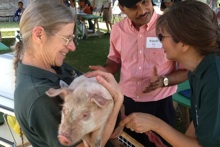 Halina Zaleski (HNFAS) returned to American Samoa
to help the Agriculture, Community and Natural Resources Division (ACNR)
of the American Samoa Community College (ASCC) to conduct a swine disease
survey. As she explained, “This project helps us to understand the health
concerns and other challenges farmers face, and to increase the experience of
students in some of the practices to care for and understand the health of the
pigs.” No such swine disease survey had been conducted in American Samoa for 20
years. Halina and a fellow Extension swine specialist colleague from Nebraska, Thomas Petznick, also conducted a swine management workshop which
offered helpful health management tips and discussed observations from local
pig farms. She had previously visited in 2016 to provide help
with an artificial insemination project that was a collaboration between
ASCC-ACNR and Samoa’s Department of Agriculture. Halina Zaleski (HNFAS) returned to American Samoa
to help the Agriculture, Community and Natural Resources Division (ACNR)
of the American Samoa Community College (ASCC) to conduct a swine disease
survey. As she explained, “This project helps us to understand the health
concerns and other challenges farmers face, and to increase the experience of
students in some of the practices to care for and understand the health of the
pigs.” No such swine disease survey had been conducted in American Samoa for 20
years. Halina and a fellow Extension swine specialist colleague from Nebraska, Thomas Petznick, also conducted a swine management workshop which
offered helpful health management tips and discussed observations from local
pig farms. She had previously visited in 2016 to provide help
with an artificial insemination project that was a collaboration between
ASCC-ACNR and Samoa’s Department of Agriculture.
|
He Shows Heart
9/7/2017 Source: Office of Communication Services, CTAHR  CTAHR’s 2017 Ka Lei Hano award winner Eric Tanouye, the
president of Green Point Nurseries, was recently featured on KHON’s Living808
program in a segment on Hawai‘i-made and Hawai‘i-grown products participating in
HDOA’s seal of quality program. Eric talked about the UH anthurium-breeding program,
mentioning that a UH-developed variety, ‘Marian Seefurth’, was one of the first
varieties that his father had grown, and he also showed some other UH-developed
varieties that Green Point had entered in cut-flower competitions. Eric
continues to be a true supporter of CTAHR—like his father before him, previous
Ka Lei Hano honoree and Green Point president Harold Tanouye. CTAHR’s 2017 Ka Lei Hano award winner Eric Tanouye, the
president of Green Point Nurseries, was recently featured on KHON’s Living808
program in a segment on Hawai‘i-made and Hawai‘i-grown products participating in
HDOA’s seal of quality program. Eric talked about the UH anthurium-breeding program,
mentioning that a UH-developed variety, ‘Marian Seefurth’, was one of the first
varieties that his father had grown, and he also showed some other UH-developed
varieties that Green Point had entered in cut-flower competitions. Eric
continues to be a true supporter of CTAHR—like his father before him, previous
Ka Lei Hano honoree and Green Point president Harold Tanouye.
|
All’s Wells That Ends Well!
9/7/2017 Source: Office of Communication Services, CTAHR 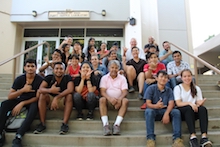 This past summer, faculty, staff, and graduate students
of CTAHR had the pleasure of mentoring high school students from the Wells International
Research Bridge Program. Now in its fourth year, the program brought 16 of the best
and brightest students from Wells International School in Bangkok to work on summer
projects in TPSS, PEPS, MBBE, and HNFAS labs. Throughout this 6-week program, students
learned from their mentors how to conduct solid scientific research in biological
engineering, plant pathology, animal science, and plant science. Both the students
and the mentors had a valuable and meaningful experience. Many thank-yous go to
Ray de la Pena (whose father was part of CTAHR on Kaua‘i) and PEPS alumnus Clesson
Higashi, now at University of Georgia, for their continued support in coordinating
this program between Wells and CTAHR. A big mahalo goes as well to all the CTAHR
mentors for their continued support of this program! This past summer, faculty, staff, and graduate students
of CTAHR had the pleasure of mentoring high school students from the Wells International
Research Bridge Program. Now in its fourth year, the program brought 16 of the best
and brightest students from Wells International School in Bangkok to work on summer
projects in TPSS, PEPS, MBBE, and HNFAS labs. Throughout this 6-week program, students
learned from their mentors how to conduct solid scientific research in biological
engineering, plant pathology, animal science, and plant science. Both the students
and the mentors had a valuable and meaningful experience. Many thank-yous go to
Ray de la Pena (whose father was part of CTAHR on Kaua‘i) and PEPS alumnus Clesson
Higashi, now at University of Georgia, for their continued support in coordinating
this program between Wells and CTAHR. A big mahalo goes as well to all the CTAHR
mentors for their continued support of this program!
|
Great Garbanzos!
9/7/2017 Source: Office of Communication Services, CTAHR  An article in the Maui News about local chickpea-snack company Chic Naturals
highlights Amjad Ahmad’s (TPSS) role in researching garbanzos in the Islands. Amjad
partnered with Chic Naturals co-owner Shaun Bayless to win a Specialty Crop Block
Grant to study which varieties of chickpeas grow best in different parts of five
islands. He also helped to broker a deal with Pacific Biodiesel whereby the legumes
will be used as a rotational crop with the sunflowers that Pacific Biodiesel is
growing, while Chic Naturals will use the company’s sunflower oil on their snacks—a
win-win-win situation! An article in the Maui News about local chickpea-snack company Chic Naturals
highlights Amjad Ahmad’s (TPSS) role in researching garbanzos in the Islands. Amjad
partnered with Chic Naturals co-owner Shaun Bayless to win a Specialty Crop Block
Grant to study which varieties of chickpeas grow best in different parts of five
islands. He also helped to broker a deal with Pacific Biodiesel whereby the legumes
will be used as a rotational crop with the sunflowers that Pacific Biodiesel is
growing, while Chic Naturals will use the company’s sunflower oil on their snacks—a
win-win-win situation!
|
If Cane, Cane
9/7/2017 Source: Office of Communication Services, CTAHR 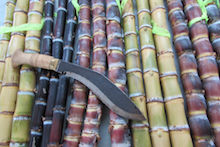 Noa Lincoln and Ted Radovich (both TPSS) are interviewed for
the recent UH News story “Sugarcane Is Not Dead, Just Different.” The story describes
how Noa is studying the place that cane held in native cropping systems, particularly
as an intercrop with ‘ulu, as well as its place in the larger culture and mythology.
Ted is quoted as saying that sugarcane “has become a high-value horticultural crop
as opposed to a low-value economic or plantation crop”; that is, different, and
often native, varieties of cane are being used in products that celebrate and showcase
their unique properties. Both are optimistic about the place of sugar in the Islands
post-plantation, and they are doing their best to make its future bright. Noa Lincoln and Ted Radovich (both TPSS) are interviewed for
the recent UH News story “Sugarcane Is Not Dead, Just Different.” The story describes
how Noa is studying the place that cane held in native cropping systems, particularly
as an intercrop with ‘ulu, as well as its place in the larger culture and mythology.
Ted is quoted as saying that sugarcane “has become a high-value horticultural crop
as opposed to a low-value economic or plantation crop”; that is, different, and
often native, varieties of cane are being used in products that celebrate and showcase
their unique properties. Both are optimistic about the place of sugar in the Islands
post-plantation, and they are doing their best to make its future bright.
|
Quarantine on Guard
9/7/2017 Source: Office of Communication Services, CTAHR 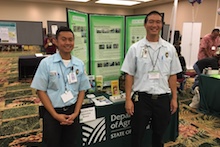 Two CTAHR alumni,
now both working in the Plant Quarantine division at the Hawai‘i Department of
Agriculture, attended the recent AG2017 agriculture conference to share the
dangers of invasive species to Hawai‘i’s ecosystem. Kent Dumalo (left)
graduated from TPSS in 2006; he began as an inspector but now is doing
community education and outreach for HDOA. While he loves his work, he doesn’t
want to entirely give up growing plants, what originally led him to CTAHR; he
still has a thriving collection of succulents and air plants. Christopher
Kishimoto, also a TPSS alumnus, works as an entomologist for Plant Quarantine. Some
of the strangest insects and other organisms that have been found during
inspections include endangered giant clams, huge and deadly scorpions—imported as
pets!—and Madagascar hissing cockroaches—ditto! We’re lucky these two are on
the job to help make sure these strange creatures don’t start spreading
throughout the Islands! Two CTAHR alumni,
now both working in the Plant Quarantine division at the Hawai‘i Department of
Agriculture, attended the recent AG2017 agriculture conference to share the
dangers of invasive species to Hawai‘i’s ecosystem. Kent Dumalo (left)
graduated from TPSS in 2006; he began as an inspector but now is doing
community education and outreach for HDOA. While he loves his work, he doesn’t
want to entirely give up growing plants, what originally led him to CTAHR; he
still has a thriving collection of succulents and air plants. Christopher
Kishimoto, also a TPSS alumnus, works as an entomologist for Plant Quarantine. Some
of the strangest insects and other organisms that have been found during
inspections include endangered giant clams, huge and deadly scorpions—imported as
pets!—and Madagascar hissing cockroaches—ditto! We’re lucky these two are on
the job to help make sure these strange creatures don’t start spreading
throughout the Islands!
|
August
Get Your Natural Resources Policy On
8/31/2017 Source: Office of Communication Services, CTAHR 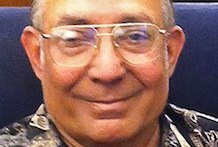 Professor Emeritus
Chennat Gopalakrishnan is
continuing as the editor-in-chief of the Journal of Natural Resources
Policy Research, though the journal, currently published by Taylor & Francis,
has been taken over by the Pennsylvania State University Press. Volume 8, Number
1 will be published in April 2018, and the journal is looking for manuscripts dealing
with every aspect of natural resources policy. For details, please see the new call
for papers.
The publisher of his 2016 hardcover book Classic Papers in Natural Resource Economics
has also just announced that a paperback edition will be published in November 2017,
and the book has been received very well in academic circles. Professor Emeritus
Chennat Gopalakrishnan is
continuing as the editor-in-chief of the Journal of Natural Resources
Policy Research, though the journal, currently published by Taylor & Francis,
has been taken over by the Pennsylvania State University Press. Volume 8, Number
1 will be published in April 2018, and the journal is looking for manuscripts dealing
with every aspect of natural resources policy. For details, please see the new call
for papers.
The publisher of his 2016 hardcover book Classic Papers in Natural Resource Economics
has also just announced that a paperback edition will be published in November 2017,
and the book has been received very well in academic circles.
|
Bioresources Bonanza
8/31/2017 Source: Office of Communication Services, CTAHR 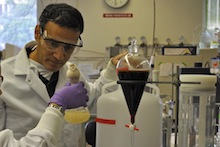 Samir Khanal (MBBE) has been appointed as associate editor for
the scientific journal Bioresource Technology starting in January 2018, due to
his international reputation as a researcher in environmental biotechnology, bioenergy,
and anaerobic digestion. Bioresource Technology is one of the best journals in the
field, ranked No 1 among agricultural engineering journals on bioenergy and the
environment, and with an impact factor of 5.651. The journal appoints only
seven associate editors globally, so this honor helps to put UHM in the global road
map of research excellence and recognition in the field! Samir Khanal (MBBE) has been appointed as associate editor for
the scientific journal Bioresource Technology starting in January 2018, due to
his international reputation as a researcher in environmental biotechnology, bioenergy,
and anaerobic digestion. Bioresource Technology is one of the best journals in the
field, ranked No 1 among agricultural engineering journals on bioenergy and the
environment, and with an impact factor of 5.651. The journal appoints only
seven associate editors globally, so this honor helps to put UHM in the global road
map of research excellence and recognition in the field!
|
Highlights of Hydroponics
8/31/2017 Source: Office of Communication Services, CTAHR 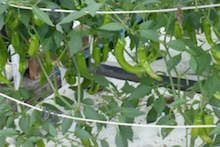 Emeritus professor Bernie Kratky has produced an entertaining
and educational YouTube video on growing tomatoes and peppers at the Komohana
Research and Extension Center
using a suspended pot, non-circulating hydroponic method (commonly referred to
as the Kratky Method) which provides automatic bottom
irrigation and does
not require electrical power and pumps. He explains
how to construct the tank, formulate and regulate the nutrient solution, and
make sure mosquitoes don’t breed in the system, and the fruits he harvests look
luscious! Emeritus professor Bernie Kratky has produced an entertaining
and educational YouTube video on growing tomatoes and peppers at the Komohana
Research and Extension Center
using a suspended pot, non-circulating hydroponic method (commonly referred to
as the Kratky Method) which provides automatic bottom
irrigation and does
not require electrical power and pumps. He explains
how to construct the tank, formulate and regulate the nutrient solution, and
make sure mosquitoes don’t breed in the system, and the fruits he harvests look
luscious!
|
New Ways to Teach
8/31/2017 Source: Office of Communication Services, CTAHR  Kent Kobayashi and grad student Kauahi Perez (pictured) (both TPSS),
members of the American Society for Horticultural Science Teaching Methods Working
Group, have published articles on horticulture pedagogy in HortTechnology.
Kauahi’s article, “Learning by Doing: Applying the Concept of Pollen Viability in
a Horticulture Classroom,”
describes a classroom activity that exposed undergrad students in a horticulture
course to the concept of pollen viability and its application. As she explains,
learning by doing helps students to gain conceptual understanding. Kent’s
article, “Using Flipped Classroom and Virtual Field Trips to Engage Students,”
describes the use of a “flipped classroom” in an undergraduate tropical
production systems course. In it, students read lecture materials
outside of class, reviewed materials in class on smart devices, searched for
new information on the Internet, and participated in small group discussions.
This added to student engagement, as did the virtual field trip assignment, in
which each student visited a commercial farm or nursery, interviewed the owner
or manager, and gave a presentation to the class about the enterprise’s operation and sustainable pra Kent Kobayashi and grad student Kauahi Perez (pictured) (both TPSS),
members of the American Society for Horticultural Science Teaching Methods Working
Group, have published articles on horticulture pedagogy in HortTechnology.
Kauahi’s article, “Learning by Doing: Applying the Concept of Pollen Viability in
a Horticulture Classroom,”
describes a classroom activity that exposed undergrad students in a horticulture
course to the concept of pollen viability and its application. As she explains,
learning by doing helps students to gain conceptual understanding. Kent’s
article, “Using Flipped Classroom and Virtual Field Trips to Engage Students,”
describes the use of a “flipped classroom” in an undergraduate tropical
production systems course. In it, students read lecture materials
outside of class, reviewed materials in class on smart devices, searched for
new information on the Internet, and participated in small group discussions.
This added to student engagement, as did the virtual field trip assignment, in
which each student visited a commercial farm or nursery, interviewed the owner
or manager, and gave a presentation to the class about the enterprise’s operation and sustainable pra
|
Have Nematodes, Will Travel
8/31/2017 Source: Office of Communication Services, CTAHR 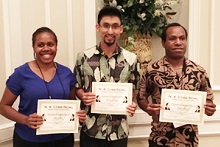 This summer,
Lilly Fatdal, Josiah Maquez, and Philip Waisen, all PEPS Tropical Plant Pathology
graduate students studying nematology, attended the Society of Nematologists meeting
in Williamsburg, VA, along with their advisors Brent Sipes and Koon-Hui Wang. The
students participated in the Nematology Jeopardy Game (Cobb Bowl), received travel
awards to present their papers, and enjoyed an information exchange with nematologists
gathered in the colonial town. Philip Waisen, on the right, received a Western Region
Sustainable & Agriculture Research and Education Graduate Student Grant supporting
his PhD research on “Cover Crop 5-in-1 Approach for Nematode Management Using Mustard
and Oil Radish.” This summer,
Lilly Fatdal, Josiah Maquez, and Philip Waisen, all PEPS Tropical Plant Pathology
graduate students studying nematology, attended the Society of Nematologists meeting
in Williamsburg, VA, along with their advisors Brent Sipes and Koon-Hui Wang. The
students participated in the Nematology Jeopardy Game (Cobb Bowl), received travel
awards to present their papers, and enjoyed an information exchange with nematologists
gathered in the colonial town. Philip Waisen, on the right, received a Western Region
Sustainable & Agriculture Research and Education Graduate Student Grant supporting
his PhD research on “Cover Crop 5-in-1 Approach for Nematode Management Using Mustard
and Oil Radish.”
|
Okinawan Sweetpotato in Okinawa
8/31/2017 Source: Office of Communication Services, CTAHR  Surely Wallace (HNFAS),
a Nutritional Science graduate student of Yong Li, recently attended the International
Biotechnology, Chemical Engineering and Life Science Conference (IBCELC) in Okinawa,
Japan. Her oral presentation “Prebiotic potential of Hawaiian purple ‘Okinawan’
sweetpotato and rice starch with Lactobacillus paracasei” discussed the impacts
of sweetpotato flesh and skin on the growth of probiotic bacteria in an in vitro
setting. Here she is pictured receiving the certificate of presentation.
Surely has been invited
to return for the 2018 IBCELC conference in Okinawa as a workshop chair, as
well. She was also the winner of 2017 CTAHR Best MS Poster
Presentation and Best MS 3MEP Presentation. Surely Wallace (HNFAS),
a Nutritional Science graduate student of Yong Li, recently attended the International
Biotechnology, Chemical Engineering and Life Science Conference (IBCELC) in Okinawa,
Japan. Her oral presentation “Prebiotic potential of Hawaiian purple ‘Okinawan’
sweetpotato and rice starch with Lactobacillus paracasei” discussed the impacts
of sweetpotato flesh and skin on the growth of probiotic bacteria in an in vitro
setting. Here she is pictured receiving the certificate of presentation.
Surely has been invited
to return for the 2018 IBCELC conference in Okinawa as a workshop chair, as
well. She was also the winner of 2017 CTAHR Best MS Poster
Presentation and Best MS 3MEP Presentation.
|
Get It Watered, Get It Covered
8/31/2017 Source: Office of Communication Services, CTAHR 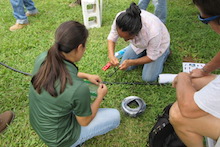 Andrea
Kawabata, Alyssa Cho, Jen Burt, Marc Meisner, and Nick Yamauchi joined with staff
from USDA NRCS Kealakekua and Kamuela as well as SiteOne Landscape Supply to host
a Hands-On Irrigation and Groundcover Workshop at the Kona Cooperative Extension
Office and Research Station. Orchard crop growers learned about how NRCS programs
can provide them with financial and technical support for conservation practices.
Additionally, NRCS staff presented about on-farm irrigation establishment and conservation
groundcovers. During the hands-on activity at the research station, participants
set up several variations of irrigation lines, including drip, pigtail, and spray
emitters, and learned about the latest tools and supplies available. Here Andrea
teaches a participant how to add a spray emitter. Growers were also provided a variety
of groundcover starts to test out on their farms. These and other helpful and
important hands-on workshops have been funded by CTAHR supplemental funding,
for which PIs Andrea and Alyssa extend their gratitude. Andrea
Kawabata, Alyssa Cho, Jen Burt, Marc Meisner, and Nick Yamauchi joined with staff
from USDA NRCS Kealakekua and Kamuela as well as SiteOne Landscape Supply to host
a Hands-On Irrigation and Groundcover Workshop at the Kona Cooperative Extension
Office and Research Station. Orchard crop growers learned about how NRCS programs
can provide them with financial and technical support for conservation practices.
Additionally, NRCS staff presented about on-farm irrigation establishment and conservation
groundcovers. During the hands-on activity at the research station, participants
set up several variations of irrigation lines, including drip, pigtail, and spray
emitters, and learned about the latest tools and supplies available. Here Andrea
teaches a participant how to add a spray emitter. Growers were also provided a variety
of groundcover starts to test out on their farms. These and other helpful and
important hands-on workshops have been funded by CTAHR supplemental funding,
for which PIs Andrea and Alyssa extend their gratitude.
|
No Taste This Year
8/31/2017 Source: Office of Communication Services, CTAHR 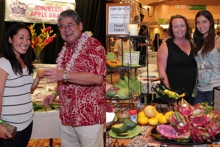 Susan Miyasaka was interviewed by West Hawaii Today about the
Taste of the Hawaiian Range, which is taking a hiatus this year because of the
loss of some key partners and collaborators. She explains that the college is
hoping to continue the wildly popular 21-year event in the future, especially
if organizations such as the Hawaii Farm Bureau and the Food Basket are
interested in becoming more involved. The Taste of the Hawaiian Range was first
organized at the Mealani Research Station as a way to introduce consumers to
the possibilities of grass-fed beef, but it has expanded into a celebration of
all things eating local. Susan Miyasaka was interviewed by West Hawaii Today about the
Taste of the Hawaiian Range, which is taking a hiatus this year because of the
loss of some key partners and collaborators. She explains that the college is
hoping to continue the wildly popular 21-year event in the future, especially
if organizations such as the Hawaii Farm Bureau and the Food Basket are
interested in becoming more involved. The Taste of the Hawaiian Range was first
organized at the Mealani Research Station as a way to introduce consumers to
the possibilities of grass-fed beef, but it has expanded into a celebration of
all things eating local.
|
The Cornucopia of Life
8/31/2017 Source: Office of Communication Services, CTAHR 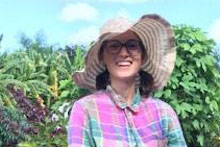 GoFarm alumna Claire Fallon is featured in a Star-Advertiser
article that tells how the go-getter moved from sports and dance through acting
and directing to yoga and religion and thence to farming. As the article
explains, Claire saw the TEDx talk that Steven Chiang, then director of the
highly successful beginning farmer-training program, gave in 2015, and was
inspired to enter the program herself. The story has a happy conclusion: “Today
she leases a quarter-acre plot in Waimanalo to which she devotes upward of 20 hours
per week raising pumpkins, corn, okra and other delectables that she sells to local
restaurants.” Claire is quoted as saying that she’s always looking for “new
things to explore,” and it sounds like farming has provided that for her. GoFarm alumna Claire Fallon is featured in a Star-Advertiser
article that tells how the go-getter moved from sports and dance through acting
and directing to yoga and religion and thence to farming. As the article
explains, Claire saw the TEDx talk that Steven Chiang, then director of the
highly successful beginning farmer-training program, gave in 2015, and was
inspired to enter the program herself. The story has a happy conclusion: “Today
she leases a quarter-acre plot in Waimanalo to which she devotes upward of 20 hours
per week raising pumpkins, corn, okra and other delectables that she sells to local
restaurants.” Claire is quoted as saying that she’s always looking for “new
things to explore,” and it sounds like farming has provided that for her.
|
Soil to Riches
8/31/2017 Source: Office of Communication Services, CTAHR  This summer,
Glen Fukumoto and Jonathan Deenick participated in technical-assistance assignments
in Myanmar funded by US AID and coordinated
by Winrock International. They engaged some 130 farmers and local government and NGO professionals in a series
of workshops, with Glen covering small-scale composting technology
for treating poultry waste and Jonathan addressing tropical
soils and fertility management. Besides attending presentations on technical
aspects of compost production and its environmental and socioeconomic
benefits, participants in Glen’s workshops constructed compost bins using local
materials. The highlight of Jonathan’s workshops was
his traveling soils lab, which tested farmers’ soil samples for pH, nitrogen, and
phosphorus. Analysis results showed the farms’ soil fertility status and
guided the farmers on nutrient-management practices to improve the crop yield.
Both of their topics were of critical importance to participants: implementing small-scale composting operations can help solve a multitude of critical environmental, economic, and
social challenges facing rural farmers, while proper
soil fertility is the fundamental requirement for a good crop yield and
increased food security. US AID’s John Ogonowski and Doug Bereuter Farmer-to-Farmer
Program provides assistance to developing countries to promote sustainable capacity
build This summer,
Glen Fukumoto and Jonathan Deenick participated in technical-assistance assignments
in Myanmar funded by US AID and coordinated
by Winrock International. They engaged some 130 farmers and local government and NGO professionals in a series
of workshops, with Glen covering small-scale composting technology
for treating poultry waste and Jonathan addressing tropical
soils and fertility management. Besides attending presentations on technical
aspects of compost production and its environmental and socioeconomic
benefits, participants in Glen’s workshops constructed compost bins using local
materials. The highlight of Jonathan’s workshops was
his traveling soils lab, which tested farmers’ soil samples for pH, nitrogen, and
phosphorus. Analysis results showed the farms’ soil fertility status and
guided the farmers on nutrient-management practices to improve the crop yield.
Both of their topics were of critical importance to participants: implementing small-scale composting operations can help solve a multitude of critical environmental, economic, and
social challenges facing rural farmers, while proper
soil fertility is the fundamental requirement for a good crop yield and
increased food security. US AID’s John Ogonowski and Doug Bereuter Farmer-to-Farmer
Program provides assistance to developing countries to promote sustainable capacity
build
|
Better Living Through A.D.
8/31/2017 Source: Office of Communication Services, CTAHR 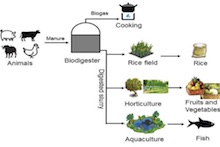 Anaerobic digestion technology is improving
the quality of life of Cambodian farmers, and Samir Khanal (MBBE) is helping to
make that happen. A few years ago he conducted a 4-day workshop on anaerobic
digestion technology for field staff from Southeast Asian nations, at which he
learned about the popularity of household digesters in Cambodia. Subsequently he
was invited by the National Biodigester Program (NBP) of Cambodia to discuss
and train NBP staff in the use of AD technology and digestate utilization, and this
year he returned to visit three farmers who have adopted A.D. technology. Cambodia is one of the least developed
countries in Southeast Asia, depending primarily on agriculture. Household digesters are becoming increasingly popular
among farmers in its rural regions, with some 30,000 digesters in use in various
provinces of Cambodia. Most are fed with cow/buffalo dung; after digesting it creates
biogas, which can be used for cooking, and nutrient-rich digestate, which can
be used as a biofertilizer, composted, or used for aquaculture applications to
grow algae for fish feed. The
quality of life of rural farmers has been positively impacted by biodigester technology,
which contributes to increased income, reduced deforestation, the curtailing of
greenhouse gas emission, improved health and hygiene, and time saved for other productive
activities. Anaerobic digestion technology is improving
the quality of life of Cambodian farmers, and Samir Khanal (MBBE) is helping to
make that happen. A few years ago he conducted a 4-day workshop on anaerobic
digestion technology for field staff from Southeast Asian nations, at which he
learned about the popularity of household digesters in Cambodia. Subsequently he
was invited by the National Biodigester Program (NBP) of Cambodia to discuss
and train NBP staff in the use of AD technology and digestate utilization, and this
year he returned to visit three farmers who have adopted A.D. technology. Cambodia is one of the least developed
countries in Southeast Asia, depending primarily on agriculture. Household digesters are becoming increasingly popular
among farmers in its rural regions, with some 30,000 digesters in use in various
provinces of Cambodia. Most are fed with cow/buffalo dung; after digesting it creates
biogas, which can be used for cooking, and nutrient-rich digestate, which can
be used as a biofertilizer, composted, or used for aquaculture applications to
grow algae for fish feed. The
quality of life of rural farmers has been positively impacted by biodigester technology,
which contributes to increased income, reduced deforestation, the curtailing of
greenhouse gas emission, improved health and hygiene, and time saved for other productive
activities.
|
The Weed Warrior
8/23/2017 Source: Office of Communication Services, CTAHR  Daniel Owens (MBBE) recently received the Arthur
C. Neish Young Investigator Award from the Phytochemical Society of North America,
which included presenting a paper at a symposium at the PSNA’s annual meeting. The title of his award presentation was “Identification and Mode
of Action of Herbicidal Natural Products.” As he explained, weeds are considered
to be of the greatest concern to farmers of all agronomic pests worldwide, causing
more than $40 billion in annual agricultural losses. This is particularly problematic
in Hawai‘i, where they don’t die off during the winter. Developing herbicidal products
with novel modes of action as part of an overall integrated pest management strategy
to combat weed and invasive plant infestations as well as continued problems with
evolving herbicide resistance is a critical challenge, and plant natural products
are a valuable source for the discovery of new herbicidal compounds. Daniel’s lab is investigating
the herbicidal potential of natural products from allelopathic tropical and subtropical
plants, for activity against
broadleaf and grassy weeds. Congratulations! Daniel Owens (MBBE) recently received the Arthur
C. Neish Young Investigator Award from the Phytochemical Society of North America,
which included presenting a paper at a symposium at the PSNA’s annual meeting. The title of his award presentation was “Identification and Mode
of Action of Herbicidal Natural Products.” As he explained, weeds are considered
to be of the greatest concern to farmers of all agronomic pests worldwide, causing
more than $40 billion in annual agricultural losses. This is particularly problematic
in Hawai‘i, where they don’t die off during the winter. Developing herbicidal products
with novel modes of action as part of an overall integrated pest management strategy
to combat weed and invasive plant infestations as well as continued problems with
evolving herbicide resistance is a critical challenge, and plant natural products
are a valuable source for the discovery of new herbicidal compounds. Daniel’s lab is investigating
the herbicidal potential of natural products from allelopathic tropical and subtropical
plants, for activity against
broadleaf and grassy weeds. Congratulations!
|
Honoring an Innovator
8/23/2017 Source: Office of Communication Services, CTAHR  Qing X. Li (MBBE) is in Washington, D.C., to receive the AGRO
innovation award at this year’s American Chemical Society AGRO division conference,
which runs August 20–24. This division of the American Chemical Society brings together
a worldwide community of scientists and stakeholders to advance knowledge and promote
innovative solutions for the protection of agricultural productivity, public health,
and environment. This prestigious award recognizes his outstanding and innovative
work over the years in pesticide chemistry, work which has significantly enhanced
agricultural management and productivity. Qing’s research focuses as well on
agricultural chemistry and the fate of agrochemicals, functional foods, and
food safety. Great work! Qing X. Li (MBBE) is in Washington, D.C., to receive the AGRO
innovation award at this year’s American Chemical Society AGRO division conference,
which runs August 20–24. This division of the American Chemical Society brings together
a worldwide community of scientists and stakeholders to advance knowledge and promote
innovative solutions for the protection of agricultural productivity, public health,
and environment. This prestigious award recognizes his outstanding and innovative
work over the years in pesticide chemistry, work which has significantly enhanced
agricultural management and productivity. Qing’s research focuses as well on
agricultural chemistry and the fate of agrochemicals, functional foods, and
food safety. Great work!
|
Welina CTAHR
8/23/2017 Source: Office of Communication Services, CTAHR 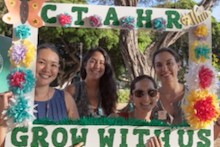 CTAHR advising staff Maile Sing, Irene Morrow, and Kalai
Castro are featured, along with student services specialist Lisa
Kitagawa-Akagi, on the mahalo card sent out by the Vice Chancellor for Students
in acknowledgement of university groups’ participation in Welina Manoa: And the
Adventure Begins 2017, an event that welcomed students to the Manoa campus and the
Fall semester. CTAHR
alumna Tracyn Nagata in another photo on the card, so the college is well represented! CTAHR advising staff Maile Sing, Irene Morrow, and Kalai
Castro are featured, along with student services specialist Lisa
Kitagawa-Akagi, on the mahalo card sent out by the Vice Chancellor for Students
in acknowledgement of university groups’ participation in Welina Manoa: And the
Adventure Begins 2017, an event that welcomed students to the Manoa campus and the
Fall semester. CTAHR
alumna Tracyn Nagata in another photo on the card, so the college is well represented!
|
Whooo’s Seen a Pueo?
8/23/2017 Source: Office of Communication Services, CTAHR The Pueo Project,
headed by Melissa Price and Javier Cotin (both NREM) and fueled by citizen
scientists, is the subject of an enthusiastic article in MidWeek Magazine. The
article mentions that already more than thirty sightings of the native owl have
been confirmed across O‘ahu, from Nanakuli to Kailua to Kahala. Members of the
community are invited to check out the project website to find out more about
the pueo and to report any sightings of the little-known bird; there are also
opportunities for dedicated bird-watchers to contribute more time in field
surveys.
|
Horsin’ Around With 4-H on the Big Island
8/23/2017 Source: Office of Communication Services, CTAHR 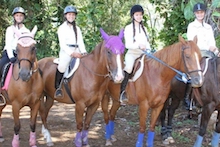 With the help of a community, this year the Na Lima A Me Na Pu‘uwai
O Kohala 4-H Club completed a very big, and very special goal: a horse facility
for the keiki of North Kohala! Big Island 4-H families and the community celebrated
by having their new riding pen blessed and then holding their year-end horse show
in it. Many helping hands came together to make this project, and this event,
major successes, from working to build the pen to monetary and material support
from almost 70 business and individual sponsors and donors! Families and community
enjoyed the new facility, laughing and having fun, while 4-H members competed in
Western and English riding classes, trail riding, dummy roping, barrel racing, and
team penning. Other festivities of the day included a steak barbecue, pony rides, animal
display, and carriage rides! Photos from the happy day can be viewed on the East
Hawaii 4-H Facebook page. With the help of a community, this year the Na Lima A Me Na Pu‘uwai
O Kohala 4-H Club completed a very big, and very special goal: a horse facility
for the keiki of North Kohala! Big Island 4-H families and the community celebrated
by having their new riding pen blessed and then holding their year-end horse show
in it. Many helping hands came together to make this project, and this event,
major successes, from working to build the pen to monetary and material support
from almost 70 business and individual sponsors and donors! Families and community
enjoyed the new facility, laughing and having fun, while 4-H members competed in
Western and English riding classes, trail riding, dummy roping, barrel racing, and
team penning. Other festivities of the day included a steak barbecue, pony rides, animal
display, and carriage rides! Photos from the happy day can be viewed on the East
Hawaii 4-H Facebook page.
|
Getting Certified
8/17/2017 Source: Office of Communication Services, CTAHR 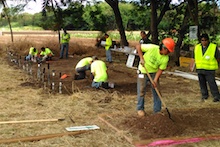 The Waimanalo Research Station hosted a practice exam for
the 2017 Oahu Landscape Industry Certified
Technician (LICT) Program this past Saturday. The LICT certification is a national testing program administered
by the National Association of Landscape Professionals, currently offered in 28
states and in Canadian provinces. The Exterior Certification consists of four modules:
Turf Maintenance, Ornamental Maintenance, Irrigation, and Softscape Installation.
In Hawai‘i, the LICT program is administered by the Landscape Industry Council of
Hawaii and the Hawaii Landscape and Irrigation Contractors Association (HLICA).
Approximately 50 landscapers took this exam. Representing CTAHR, Zhiqiang Cheng
(PEPS) assisted with exam setup and was one of the exam judges. The Waimanalo Research Station hosted a practice exam for
the 2017 Oahu Landscape Industry Certified
Technician (LICT) Program this past Saturday. The LICT certification is a national testing program administered
by the National Association of Landscape Professionals, currently offered in 28
states and in Canadian provinces. The Exterior Certification consists of four modules:
Turf Maintenance, Ornamental Maintenance, Irrigation, and Softscape Installation.
In Hawai‘i, the LICT program is administered by the Landscape Industry Council of
Hawaii and the Hawaii Landscape and Irrigation Contractors Association (HLICA).
Approximately 50 landscapers took this exam. Representing CTAHR, Zhiqiang Cheng
(PEPS) assisted with exam setup and was one of the exam judges.
|
Circle of Life
8/17/2017 Source: Office of Communication Services, CTAHR  In
collaboration with the Buildings and Grounds Management Office, and aided by a
grant from the Women’s Campus Club, Orville Baldos’s (TPSS) lab
has established a research and demonstration site at Varney Circle for
underutilized native plants. To the pohinahina that’s already planted there
they have added ‘aweoweo, ‘ilima, and kawelu for a mixture of texture, height,
and color contrasts.
Orville (far right) is pictured here (left to right) with
volunteers Aleta Corpuz, Nolan Johnson, Rachelle Carson, and Alex Lindsey at
the planting event on Monday. In
collaboration with the Buildings and Grounds Management Office, and aided by a
grant from the Women’s Campus Club, Orville Baldos’s (TPSS) lab
has established a research and demonstration site at Varney Circle for
underutilized native plants. To the pohinahina that’s already planted there
they have added ‘aweoweo, ‘ilima, and kawelu for a mixture of texture, height,
and color contrasts.
Orville (far right) is pictured here (left to right) with
volunteers Aleta Corpuz, Nolan Johnson, Rachelle Carson, and Alex Lindsey at
the planting event on Monday.
|
Rat Lungworm Online
8/17/2017 Source: Office of Communication Services, CTAHR 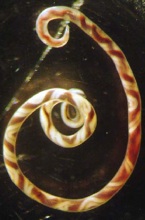 @import url(/Site/css/cute_editor.css);
Cooperative Extension, HDOA, and HDOH will be hosting an online
presentation on Rat Lungworm Prevention: Management Strategies for Rats, Snails
and Slugs on August 25 at 3:00 p.m. Dave
Moore of Neudorff North America will present on snails and slugs as agronomic
pests and vectors of human and plant pathogens in Hawai‘i, including host sites
and vectors/vehicles, snail biology/ecology and reproduction, and slug and snail
management strategies. Christopher Jacobsen
of HDOH will present on rats and environmental and crop pests and as carriers
and transmitters of human and plant pathogens in Hawai‘i, including management strategies: traps, baits, rodenticides,
and other technologies. Presentation locations are Hilo DOH Conference Room and
UH MC Community Service Building. Those
on O‘ahu who are interested in the presentation can register on Eventbrite
to participate via Zoom (online video conferencing).
Those with an HDOA Pesticide License will earn 2.0 HDOA Agricultural Pesticide
Applicator CEUs for attending the entire presentation. The event is free, but you do need to register. For more information, you
can contact Lynn Nakamura-Tengan at 808-244-3242, ext. 233 or lynnnaka@hawaii.edu. @import url(/Site/css/cute_editor.css);
Cooperative Extension, HDOA, and HDOH will be hosting an online
presentation on Rat Lungworm Prevention: Management Strategies for Rats, Snails
and Slugs on August 25 at 3:00 p.m. Dave
Moore of Neudorff North America will present on snails and slugs as agronomic
pests and vectors of human and plant pathogens in Hawai‘i, including host sites
and vectors/vehicles, snail biology/ecology and reproduction, and slug and snail
management strategies. Christopher Jacobsen
of HDOH will present on rats and environmental and crop pests and as carriers
and transmitters of human and plant pathogens in Hawai‘i, including management strategies: traps, baits, rodenticides,
and other technologies. Presentation locations are Hilo DOH Conference Room and
UH MC Community Service Building. Those
on O‘ahu who are interested in the presentation can register on Eventbrite
to participate via Zoom (online video conferencing).
Those with an HDOA Pesticide License will earn 2.0 HDOA Agricultural Pesticide
Applicator CEUs for attending the entire presentation. The event is free, but you do need to register. For more information, you
can contact Lynn Nakamura-Tengan at 808-244-3242, ext. 233 or lynnnaka@hawaii.edu.
|
A Brand-New Look
8/17/2017 Source: Office of Communication Services, CTAHR 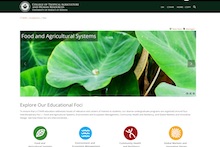 Great news: the new CTAHR/undergraduate academic programs website
is up and running—check it out! All of
the pages relating to the undergraduate
academic programs (prospective students and current students) are new and
re-done. Many thanks go to those who worked with Interim Associate Dean Wieczorek on this project
to get it completed, especially to Kellie Taguchi, Elsie Kawahara, the department
chairs, the Academic and Student Affairs office, and all the faculty who put in
so much time and effort into this endeavor over the summer! Great news: the new CTAHR/undergraduate academic programs website
is up and running—check it out! All of
the pages relating to the undergraduate
academic programs (prospective students and current students) are new and
re-done. Many thanks go to those who worked with Interim Associate Dean Wieczorek on this project
to get it completed, especially to Kellie Taguchi, Elsie Kawahara, the department
chairs, the Academic and Student Affairs office, and all the faculty who put in
so much time and effort into this endeavor over the summer!
|
Greenhouses for Green Production
8/9/2017 Source: Office of Communication Services, CTAHR 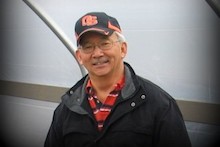 CTAHR alumnus Les Fuchigami is mentioned in the Star-Advertiser’s
front-page story about Lana‘i’s plans for high-tech agriculture. Les, who grew
up on Lana‘i, earned a degree in Horticulture with a minor in Plant Pathology
from UH and also served as Department Head of Horticulture and Interim Associate Dean
of Extension. He is partnering with Larry
Ellison, the owner of most of Lana‘i, who plans to create giant sustainable
greenhouses to grow cheap, fresh local produce. CTAHR alumnus Les Fuchigami is mentioned in the Star-Advertiser’s
front-page story about Lana‘i’s plans for high-tech agriculture. Les, who grew
up on Lana‘i, earned a degree in Horticulture with a minor in Plant Pathology
from UH and also served as Department Head of Horticulture and Interim Associate Dean
of Extension. He is partnering with Larry
Ellison, the owner of most of Lana‘i, who plans to create giant sustainable
greenhouses to grow cheap, fresh local produce.
|
Pick Up the Pine!
8/9/2017 Source: Office of Communication Services, CTAHR 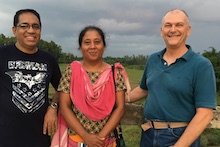 Brent Sipes (PEPS), professor of Tropical Plant Protection, recently
offered a 2-week training course on environmentally sound and safe pineapple cultivation
for a group of ethnic-minority Garo people in rural Bangladesh. The Garo’s current
pineapple production utilizes pineapple grown as an intercrop in combination
with banana, ginger, and under-forest trees, and the fruit is generally sold into
the fresh market. The assignment was sponsored by Winrock International. Brent Sipes (PEPS), professor of Tropical Plant Protection, recently
offered a 2-week training course on environmentally sound and safe pineapple cultivation
for a group of ethnic-minority Garo people in rural Bangladesh. The Garo’s current
pineapple production utilizes pineapple grown as an intercrop in combination
with banana, ginger, and under-forest trees, and the fruit is generally sold into
the fresh market. The assignment was sponsored by Winrock International.
|
Giving Back to the Soil
8/9/2017 Source: Office of Communication Services, CTAHR  Cooperative Extension’s Andrea Kawabata, Jari
Sugano, Alyssa Cho, and Ted Radovich (all TPSS) organized a Hands-On Composting
Workshop and Mini Ag-Pro event at Organic Matters Hawaii (OMH), a commercial composting
facility in Kona. Participants, including 24 orchard crop farmers and 13 CTAHR faculty
and staff, learned how to properly use mulch and make quality compost from their
farm’s green and brown waste. Presentations from CTAHR, OMH, and USDA NRCS included
not only an overview on composting basics, feedstock calculations, biochar, and
mortality composting (composting animals or animal parts), but also information
on the Department of Health’s compost regulations, NRCS’ soil conservation, and
cost-share programs. In addition, participants had the opportunity to tour the facility,
observe the turning of compost on a commercial scale, and then get their hands dirty
by making their own compost piles. This event, which was funded by OMH, SOAP, and
CTAHR, provided farmers and Cooperative Extension the opportunity to connect, network,
educate, and learn. Cooperative Extension’s Andrea Kawabata, Jari
Sugano, Alyssa Cho, and Ted Radovich (all TPSS) organized a Hands-On Composting
Workshop and Mini Ag-Pro event at Organic Matters Hawaii (OMH), a commercial composting
facility in Kona. Participants, including 24 orchard crop farmers and 13 CTAHR faculty
and staff, learned how to properly use mulch and make quality compost from their
farm’s green and brown waste. Presentations from CTAHR, OMH, and USDA NRCS included
not only an overview on composting basics, feedstock calculations, biochar, and
mortality composting (composting animals or animal parts), but also information
on the Department of Health’s compost regulations, NRCS’ soil conservation, and
cost-share programs. In addition, participants had the opportunity to tour the facility,
observe the turning of compost on a commercial scale, and then get their hands dirty
by making their own compost piles. This event, which was funded by OMH, SOAP, and
CTAHR, provided farmers and Cooperative Extension the opportunity to connect, network,
educate, and learn.
|
Follow That Fish!
8/9/2017 Source: Office of Communication Services, CTAHR  Shanna Grafeld and Kirsten Oleson (both NREM) are co-authors
of the study “Follow that fish: Uncovering the hidden
blue economy in coral reef fisheries,” just published in the scientific journal
PLoS ONE, which examines the monetary, social, and cultural importance of Hawaiian
near-shore fisheries. The researchers conducted a multi-year study tracking the
commercial and noncommercial value chains for reef fish. They explain that it
is necessary to fully appreciate the many and varied benefits that the near-shore
fishery provides to society in order to move towards sustainable management. For
instance, did you know that small-scale fisheries support the well-being of millions
of people around the world? Important benefits include monetary value, the potential
to provide millions of meals a year, and cultural benefits such as the perpetuation
of culture, community cohesion, and sharing knowledge with the next generation. Shanna Grafeld and Kirsten Oleson (both NREM) are co-authors
of the study “Follow that fish: Uncovering the hidden
blue economy in coral reef fisheries,” just published in the scientific journal
PLoS ONE, which examines the monetary, social, and cultural importance of Hawaiian
near-shore fisheries. The researchers conducted a multi-year study tracking the
commercial and noncommercial value chains for reef fish. They explain that it
is necessary to fully appreciate the many and varied benefits that the near-shore
fishery provides to society in order to move towards sustainable management. For
instance, did you know that small-scale fisheries support the well-being of millions
of people around the world? Important benefits include monetary value, the potential
to provide millions of meals a year, and cultural benefits such as the perpetuation
of culture, community cohesion, and sharing knowledge with the next generation.
|
Essay Excellence
8/9/2017 Source: Office of Communication Services, CTAHR  Aimee Uyehara, a grad student in TPSS, has been chosen as Regional
Prize Winner for the essay she submitted to the Syngenta Agricultural Scholarship
program. She was awarded $1,000, and her essay now advances to the national round
of judging to compete for the National Prize award of $6,000. Aimee is studying leaf growth of corn with Michael Muszynski, and also won the Gamma Sigma Delta MS Student Oral Presentation award at the 2017 SRS. Aimee Uyehara, a grad student in TPSS, has been chosen as Regional
Prize Winner for the essay she submitted to the Syngenta Agricultural Scholarship
program. She was awarded $1,000, and her essay now advances to the national round
of judging to compete for the National Prize award of $6,000. Aimee is studying leaf growth of corn with Michael Muszynski, and also won the Gamma Sigma Delta MS Student Oral Presentation award at the 2017 SRS.
|
Hope for Alzheimer’s Studies
8/9/2017 Source: Office of Communication Services, CTAHR 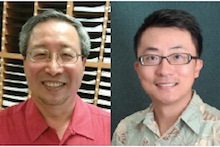 Zhibin Liang
(MBBE), a PhD student of Qing Li, has been named a Young Investigator Scholar
for 2017 by the Alzheimer’s Drug Discovery Foundation! This prestigious scholarship
recognizes early achievements and encourages the career development of the next
generation of Alzheimer’s research scientists. Zhibin will present a poster entitled
“Selective GSK3β inhibitors reduce tau and amyloid burdens: Promising drug candidates
help fight Alzheimer’s” at the 18th International Conference on Alzheimer’s
Drug Discovery in New Jersey. This isn’t Zhibin’s first honor—he recently
won the Lynn Brady Student Travel Award for Natural Products Chemistry from the
American Society of Pharmacognosy (ASP) and presented a talk at the 58th
Annual Meeting of ASP in Oregon in July. He was also the winner of 2017
CTAHR Best PhD Poster Presentation and Best PhD 3MEP Presentation. Qing and Zhibin believe
that disseminating their research findings at professional forums is a wonderful
opportunity to exchange ideas and seek collaborations with worldwide scientists. Zhibin Liang
(MBBE), a PhD student of Qing Li, has been named a Young Investigator Scholar
for 2017 by the Alzheimer’s Drug Discovery Foundation! This prestigious scholarship
recognizes early achievements and encourages the career development of the next
generation of Alzheimer’s research scientists. Zhibin will present a poster entitled
“Selective GSK3β inhibitors reduce tau and amyloid burdens: Promising drug candidates
help fight Alzheimer’s” at the 18th International Conference on Alzheimer’s
Drug Discovery in New Jersey. This isn’t Zhibin’s first honor—he recently
won the Lynn Brady Student Travel Award for Natural Products Chemistry from the
American Society of Pharmacognosy (ASP) and presented a talk at the 58th
Annual Meeting of ASP in Oregon in July. He was also the winner of 2017
CTAHR Best PhD Poster Presentation and Best PhD 3MEP Presentation. Qing and Zhibin believe
that disseminating their research findings at professional forums is a wonderful
opportunity to exchange ideas and seek collaborations with worldwide scientists.
|
Funding Celebration
8/3/2017 Source: Office of Communication Services, CTAHR 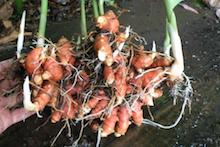 Congratulations
to all CTAHR faculty who were
successful in the recent Maui County FY18 grant competition! A total of 16
proposals were submitted, and support was provided for the top-ranked 8
proposals. These successful projects, and their project managers, are as
follows: “Field Demonstration on the
Effectiveness of Using Oleander, Nerium oleander, as an Axis Deer
Hedgerow-Fence to Protect Interior Farm Cash Crops,” Alton Arakaki; “Management
of Frit Fly, a Challenging Turfgrass/Golf Pest, on Maui,” Zhiqiang Cheng and
Norman Nagata; “Maui County Coffee Grower Training on Integrated Pest
Management of Coffee Berry Borer,” Andrea Kawabata, Kylie Wong, Robin
Shimabuku, and Alton Arakaki; “Grower and Community Evaluation of New Taro
Varieties on the Islands of Maui and Molokai,” Susan Miyasaka, Robin Shimabuku,
Alton Arakaki, and Sharon Motomura-Wages; “FSMA Water Requirement Compliance
Research and Outreach,” Lynn Nakamura-Tengan, Jensen Uyeda, and Kylie Wong; “Youth
Bee-Keeping Workshop Series,” Cynthia Nazario-Leary and Nancy Ooki; “GET Local
Maui Nui,” Nancy Ooki, Lynn Nakamura-Tengan, and Kylie Wong; and “Expanding
Turmeric (Curcuma spp.) Production in Maui County,” Kylie Wong,
Ted Radovich, and Sharon Motomura-Wages. Congratulations
to all CTAHR faculty who were
successful in the recent Maui County FY18 grant competition! A total of 16
proposals were submitted, and support was provided for the top-ranked 8
proposals. These successful projects, and their project managers, are as
follows: “Field Demonstration on the
Effectiveness of Using Oleander, Nerium oleander, as an Axis Deer
Hedgerow-Fence to Protect Interior Farm Cash Crops,” Alton Arakaki; “Management
of Frit Fly, a Challenging Turfgrass/Golf Pest, on Maui,” Zhiqiang Cheng and
Norman Nagata; “Maui County Coffee Grower Training on Integrated Pest
Management of Coffee Berry Borer,” Andrea Kawabata, Kylie Wong, Robin
Shimabuku, and Alton Arakaki; “Grower and Community Evaluation of New Taro
Varieties on the Islands of Maui and Molokai,” Susan Miyasaka, Robin Shimabuku,
Alton Arakaki, and Sharon Motomura-Wages; “FSMA Water Requirement Compliance
Research and Outreach,” Lynn Nakamura-Tengan, Jensen Uyeda, and Kylie Wong; “Youth
Bee-Keeping Workshop Series,” Cynthia Nazario-Leary and Nancy Ooki; “GET Local
Maui Nui,” Nancy Ooki, Lynn Nakamura-Tengan, and Kylie Wong; and “Expanding
Turmeric (Curcuma spp.) Production in Maui County,” Kylie Wong,
Ted Radovich, and Sharon Motomura-Wages.
|
AgDiscovery and the Alumni
8/3/2017 Source: Office of Communication Services, CTAHR  For the
seventh year in a row, the college’s alumni association contributed to the Hawai‘i
AgDiscovery program for local teens. CTAHRAA participated in the opening and
closing ceremonies, the Ala Moana beach barbecue, and song and hula lessons.
TPSS grad student and former CTAHRAA president Kauahi Perez taught a hula to
the 10 AgDiscovery participants, which they performed dressed in sarongs at the
closing ceremony. The hula was simple and upbeat, and the performance was
excellent—they even sang while dancing! The beach barbecue is a popular event,
at which the high school students get to meet various CTAHR alumni. Much
appreciation goes to board members Steve Sato, Linda Ogata, and Susan Yasuda
for their donation of food, desserts, and supplies, and for setting up and
cleaning up. A big mahalo to the CTAHR alumni for making Hawai‘i’s AgDiscovery
Program one of the best in the nation, year after year! For the
seventh year in a row, the college’s alumni association contributed to the Hawai‘i
AgDiscovery program for local teens. CTAHRAA participated in the opening and
closing ceremonies, the Ala Moana beach barbecue, and song and hula lessons.
TPSS grad student and former CTAHRAA president Kauahi Perez taught a hula to
the 10 AgDiscovery participants, which they performed dressed in sarongs at the
closing ceremony. The hula was simple and upbeat, and the performance was
excellent—they even sang while dancing! The beach barbecue is a popular event,
at which the high school students get to meet various CTAHR alumni. Much
appreciation goes to board members Steve Sato, Linda Ogata, and Susan Yasuda
for their donation of food, desserts, and supplies, and for setting up and
cleaning up. A big mahalo to the CTAHR alumni for making Hawai‘i’s AgDiscovery
Program one of the best in the nation, year after year!
|
A Waimanalo Welcome
8/3/2017 Source: Office of Communication Services, CTAHR 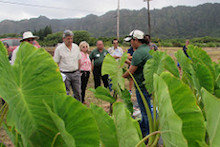 The Waimanalo Research Station hosted UH President/UH Manoa
Chancellor David Lassner on July 28. He was greeted with chants by Malama Honua
Charter School students, who use the site, and with a welcome from from Interim
Dean Rachel Novotny and Malama Honua Executive Director Herb Lee. The tour
included stops at GoFarm plots, demonstration screenhouses, the Station’s
extensive taro collection, the corn-breeding project that is the source of so
much delightful sweet corn (as well as much useful research), and aquaponics
activities. The visit ended with a pau hana dinner under the tent and,
certainly, gave Dr. Lassner lots of food for thought! The Waimanalo Research Station hosted UH President/UH Manoa
Chancellor David Lassner on July 28. He was greeted with chants by Malama Honua
Charter School students, who use the site, and with a welcome from from Interim
Dean Rachel Novotny and Malama Honua Executive Director Herb Lee. The tour
included stops at GoFarm plots, demonstration screenhouses, the Station’s
extensive taro collection, the corn-breeding project that is the source of so
much delightful sweet corn (as well as much useful research), and aquaponics
activities. The visit ended with a pau hana dinner under the tent and,
certainly, gave Dr. Lassner lots of food for thought!
|
July
Movin’ on Up…
7/13/2017 Source: Office of Communication Services, CTAHR  Congratulations to those who triumphed in the recent
promotion and tenure review! Jinan Banna and Rajesh Jha (both HNFAS) and Ju-Young
Kang (FCS) are now associate professors, while Creighton Litton (NREM) and Lori
Yancura (FCS) have been named full professors. The university is lucky to have them! Congratulations also to Soojin Jun (HNFAS), who was promoted to professor, and Kirsten Oleson (NREM), who gained tenure and was promoted to associate professor, and many apologies that these names were not in the original story! Congratulations to those who triumphed in the recent
promotion and tenure review! Jinan Banna and Rajesh Jha (both HNFAS) and Ju-Young
Kang (FCS) are now associate professors, while Creighton Litton (NREM) and Lori
Yancura (FCS) have been named full professors. The university is lucky to have them! Congratulations also to Soojin Jun (HNFAS), who was promoted to professor, and Kirsten Oleson (NREM), who gained tenure and was promoted to associate professor, and many apologies that these names were not in the original story!
|
Getting Funded…by the NSF
7/12/2017 Source: Office of Communication Services, CTAHR 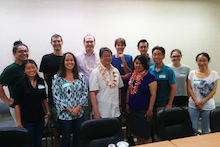 On June 29th, NSF program directors
Dr. Charles Cunninghan, Dr. Mamta Rawat, Dr. C. Eduardo Vallejos, and Dr. Tom Okita
visited the university and talked about funding opportunities in various NSF programs.
The visiting directors strongly encouraged faculty and students to take advantage
of NSF funding opportunities and provided tips about how to position projects to
be funded. They also met with graduate students and post-docs for lunch where they
shared advice and stories from their careers. Pictured here are Kauahi Perez (TPSS),
Kevin Schneider (MBBE), Charles Cunningham (NSF), Dan Laspisa (MBBE), Ray Zhang
(MBBE), Elizabeth Feldeverd (MBBE), Sumin Guo (PEPS), Aimee Uyehara (TPSS), Alyssa
MacDonald (MBBE), Tom Okita (NSF), Mamta Rawat (NSF), and Joey Ooka (MBBE). Mahalo
to CTAHR for providing lunch, Mike Muszynski (TPSS) for moderating, and the TPSS
faculty ‘ohana for their guidance and donations. On June 29th, NSF program directors
Dr. Charles Cunninghan, Dr. Mamta Rawat, Dr. C. Eduardo Vallejos, and Dr. Tom Okita
visited the university and talked about funding opportunities in various NSF programs.
The visiting directors strongly encouraged faculty and students to take advantage
of NSF funding opportunities and provided tips about how to position projects to
be funded. They also met with graduate students and post-docs for lunch where they
shared advice and stories from their careers. Pictured here are Kauahi Perez (TPSS),
Kevin Schneider (MBBE), Charles Cunningham (NSF), Dan Laspisa (MBBE), Ray Zhang
(MBBE), Elizabeth Feldeverd (MBBE), Sumin Guo (PEPS), Aimee Uyehara (TPSS), Alyssa
MacDonald (MBBE), Tom Okita (NSF), Mamta Rawat (NSF), and Joey Ooka (MBBE). Mahalo
to CTAHR for providing lunch, Mike Muszynski (TPSS) for moderating, and the TPSS
faculty ‘ohana for their guidance and donations.
|
June
Aloha, Henke
6/28/2017 Source: Office of Communication Services, CTAHR 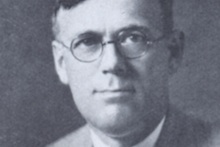 Doug Vincent (HNFAS) penned a touching tribute to Henke Hall,
once the home of CTAHR’s Animal Sciences, Food Science and Human Nutrition, and
Agricultural Biochemistry Departments before their move to the Ag Sci building,
and now slated for demolition to make way for the new Life Sciences building. It’s
named after Louis Albert Henke, an animal scientist who pioneered the use of
agricultural wastes from sugar cane and pineapple as low-cost animal feed. Read
more and see pictures of the building in the UH News story here. Doug Vincent (HNFAS) penned a touching tribute to Henke Hall,
once the home of CTAHR’s Animal Sciences, Food Science and Human Nutrition, and
Agricultural Biochemistry Departments before their move to the Ag Sci building,
and now slated for demolition to make way for the new Life Sciences building. It’s
named after Louis Albert Henke, an animal scientist who pioneered the use of
agricultural wastes from sugar cane and pineapple as low-cost animal feed. Read
more and see pictures of the building in the UH News story here.
|
Heights of Fashion
6/22/2017 Source: Office of Communication Services, CTAHR 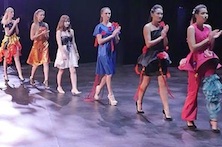 The annual rankings are out from
Fashion-Schools.org, and FDM is rising! In fashion design, it’s now in the top 25% (#32, up from #42) of schools nationally), in the top 25% (#16) nationally among public schools and colleges,
and #6 among schools on the West Coast. In fashion merchandising, it’s #33
nationally and #25 among public schools and colleges, in the top 30% of schools considered in both
categories, and it’s #6 on the West Coast. The annual rankings are out from
Fashion-Schools.org, and FDM is rising! In fashion design, it’s now in the top 25% (#32, up from #42) of schools nationally), in the top 25% (#16) nationally among public schools and colleges,
and #6 among schools on the West Coast. In fashion merchandising, it’s #33
nationally and #25 among public schools and colleges, in the top 30% of schools considered in both
categories, and it’s #6 on the West Coast.
|
PEPS Meets Pasefika
6/22/2017 Source: Office of Communication Services, CTAHR 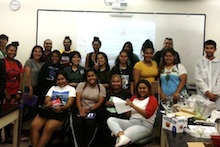 Faculty,
staff, and graduate students from Sustainable Pest Management in PEPS,
including Koon-Hui Wang (left of center), spent an afternoon on June 13 with a group of
9th- to 12th-grade students from the Pasefika summer program, sharing the fun
and rewards of agricultural research. The Pasefika Passion Pipeline (3P), which
is operated by the UHM Office of Multicultural Students Services,
promotes the importance of a college education for non-Native Hawaiian Pacific Islander
students. Faculty,
staff, and graduate students from Sustainable Pest Management in PEPS,
including Koon-Hui Wang (left of center), spent an afternoon on June 13 with a group of
9th- to 12th-grade students from the Pasefika summer program, sharing the fun
and rewards of agricultural research. The Pasefika Passion Pipeline (3P), which
is operated by the UHM Office of Multicultural Students Services,
promotes the importance of a college education for non-Native Hawaiian Pacific Islander
students.
|
Bee Resilient
6/15/2017 Source: Office of Communication Services, CTAHR 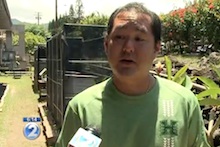 Scott Nikaido of the UH Honeybee Project has been in the news lately; he’s
interviewed on both KITV and KHON concerning the recent pollinator-awareness
event at the Urban Garden Center. He explains that the bee populations in
Hawai‘i are actually doing better than they have been for a number of years; in
fact, Hawai‘i is one of the largest producers of honey per hive in the country!
And this is in large part due to the research and outreach of the Honeybee
Project, which has given beekeepers the knowledge and tools they need to
control the pests that were lowering their numbers. Scott Nikaido of the UH Honeybee Project has been in the news lately; he’s
interviewed on both KITV and KHON concerning the recent pollinator-awareness
event at the Urban Garden Center. He explains that the bee populations in
Hawai‘i are actually doing better than they have been for a number of years; in
fact, Hawai‘i is one of the largest producers of honey per hive in the country!
And this is in large part due to the research and outreach of the Honeybee
Project, which has given beekeepers the knowledge and tools they need to
control the pests that were lowering their numbers.
|
How the Kids Are Doing
6/15/2017 Source: Office of Communication Services, CTAHR 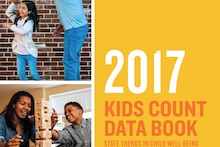 The Annie E. Casey Foundation,
for which the Center on the Family is the state’s designated project
grantee, recently released the annual KIDS COUNT
Data Book for Hawai‘i, which uses 16 indicators to rank the state across
four domains that represent what children need most to thrive. The data show
that economic conditions may finally be improving for Hawai‘i’s children, and
families continue to offer them a strong foundation. The Data Book, which
examines trends in child well-being, found that Hawai‘i now ranks 23rd in child
economic well-being and 17th for child well-being overall. However, despite
some improvements on individual indicators, Hawai‘i is lagging in the area of education,
36th overall. There have been some improvements in reading and math proficiency, but
Hawai‘i’s children are still below national proficiency rates, and more than
half of 3- and 4-year-olds are not enrolled in preschool programs. The
Star-Advertiser also published an article on the Data Book’s findings. The Annie E. Casey Foundation,
for which the Center on the Family is the state’s designated project
grantee, recently released the annual KIDS COUNT
Data Book for Hawai‘i, which uses 16 indicators to rank the state across
four domains that represent what children need most to thrive. The data show
that economic conditions may finally be improving for Hawai‘i’s children, and
families continue to offer them a strong foundation. The Data Book, which
examines trends in child well-being, found that Hawai‘i now ranks 23rd in child
economic well-being and 17th for child well-being overall. However, despite
some improvements on individual indicators, Hawai‘i is lagging in the area of education,
36th overall. There have been some improvements in reading and math proficiency, but
Hawai‘i’s children are still below national proficiency rates, and more than
half of 3- and 4-year-olds are not enrolled in preschool programs. The
Star-Advertiser also published an article on the Data Book’s findings.
|
Corn Knowledge
6/15/2017 Source: Office of Communication Services, CTAHR 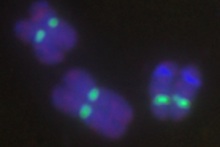 Professor Gernot Presting and two postdoctoral scholars in
his lab, Kevin
Schneider and Thomas Wolfgruber, are contributors to an historic release of a new,
high-quality corn reference genome sequence that shows reasons why corn can be
adapted to such a wide variety of growing conditions. Their findings were
published in the journal Nature. Genome analysis has become an
indispensable tool for plant improvement by breeding. The newly released sequence
fills in ~100,000 gaps left in the initial genome sequence released in 2009.
This additional information leads to a much fuller understanding of the genetic
structure of this culturally and economically important crop. Most
significantly, the findings show that the corn genome is very “flexible,” or
adaptable. This flexibility will have potential benefits in the advent of
climate change. This genome assembly includes high-quality sequence of
many corn centromeres, which have been very difficult to sequence because they
are composed of highly repetitive DNA. Professor Gernot Presting and two postdoctoral scholars in
his lab, Kevin
Schneider and Thomas Wolfgruber, are contributors to an historic release of a new,
high-quality corn reference genome sequence that shows reasons why corn can be
adapted to such a wide variety of growing conditions. Their findings were
published in the journal Nature. Genome analysis has become an
indispensable tool for plant improvement by breeding. The newly released sequence
fills in ~100,000 gaps left in the initial genome sequence released in 2009.
This additional information leads to a much fuller understanding of the genetic
structure of this culturally and economically important crop. Most
significantly, the findings show that the corn genome is very “flexible,” or
adaptable. This flexibility will have potential benefits in the advent of
climate change. This genome assembly includes high-quality sequence of
many corn centromeres, which have been very difficult to sequence because they
are composed of highly repetitive DNA.
|
The Bee’s Knees
6/7/2017 Source: Office of Communication Services, CTAHR  Scott Nikaido (PEPS) is featured in a UH News story about
the importance of pollinators to Hawai‘i crops and the things people in the
community can do to support pollinator health. It’s best to use fewer
insecticides, Scott explains, and to plant more pollinator-friendly plants.
It’s also helpful for beekeepers when people buy their locally produced honey. In
fact, honey production in Hawai’i is the highest in the nation, according to
the USDA, so let’s keep it that way! The story also highlights the Bee Hui, a
volunteer group trained by the UH Honeybee Project and based at the Urban
Garden Center—check out some pictures of their work here! For more
pollinator-themed activities, remember to check out the Second Saturday event
hosted by the Bee Hui at the UGC this Saturday, June 10, from 8:30 to 11:30 a.m. Scott Nikaido (PEPS) is featured in a UH News story about
the importance of pollinators to Hawai‘i crops and the things people in the
community can do to support pollinator health. It’s best to use fewer
insecticides, Scott explains, and to plant more pollinator-friendly plants.
It’s also helpful for beekeepers when people buy their locally produced honey. In
fact, honey production in Hawai’i is the highest in the nation, according to
the USDA, so let’s keep it that way! The story also highlights the Bee Hui, a
volunteer group trained by the UH Honeybee Project and based at the Urban
Garden Center—check out some pictures of their work here! For more
pollinator-themed activities, remember to check out the Second Saturday event
hosted by the Bee Hui at the UGC this Saturday, June 10, from 8:30 to 11:30 a.m.
|
May
Full of Options for a Fulbright
5/31/2017 Source: Office of Communication Services, CTAHR  Applications are being accepted for about 800
lecturer/research awards in over 125 countries through the Fulbright U.S. Scholar Program. Opportunities are available for college
and university faculty and administrators, artists, journalists, scientists, independent
scholars, and many others. Fulbright awards are normally granted for periods
ranging from three to twelve months, but Flex Awards
allow grantees to complete a grant in two or three shorter segments. Fulbright also
offers opportunities for multi-country grants through enhanced global and regional
awards, including the Fulbright Global Scholar Award.
The Fulbright Core Scholars Award is
a prestigious recognition of faculty accomplishment and potential for
international impact. The application deadline for most awards is August 1.
The financial support provided varies, so awardees
should work closely with their department chair and dean to develop a plan that
fits their particular situations. Call (202) 686-7877 or email apprequest@cies.iie.org for more
information. Applications are being accepted for about 800
lecturer/research awards in over 125 countries through the Fulbright U.S. Scholar Program. Opportunities are available for college
and university faculty and administrators, artists, journalists, scientists, independent
scholars, and many others. Fulbright awards are normally granted for periods
ranging from three to twelve months, but Flex Awards
allow grantees to complete a grant in two or three shorter segments. Fulbright also
offers opportunities for multi-country grants through enhanced global and regional
awards, including the Fulbright Global Scholar Award.
The Fulbright Core Scholars Award is
a prestigious recognition of faculty accomplishment and potential for
international impact. The application deadline for most awards is August 1.
The financial support provided varies, so awardees
should work closely with their department chair and dean to develop a plan that
fits their particular situations. Call (202) 686-7877 or email apprequest@cies.iie.org for more
information.
|
Pacific Islands Environmentalists
5/31/2017 Source: Office of Communication Services, CTAHR  The U.S. Department of State Bureau of East Asia Pacific Affairs
is accepting applications from organizations for a series of small
environmental awards to support local and regional small-scale environmental
projects in eligible Pacific Island countries, at up to $24,999 per award, via
the Regional Environmental Office in Suva. Projects should address one or more
of the following environmental areas of focus: food security; sustainable
economic development; adaptation to changing environmental conditions; waste
management, including marine litter; air quality; maintaining biodiversity and
healthy ecosystems; creation and/or management of marine protected areas; environment-
or health-related education; capacity building for scientific research on
environmental issues; and use of new technology for application to
environmental issues. Projects may propose activities targeted in the following
countries: Fiji, Kiribati, Marshall Islands, the Federated States of Micronesia,
Nauru, Palau, Samoa, Solomon Islands, Tonga, Tuvalu, or Vanuatu. Proposals for
$25,000 or over will not be considered. Please contact Aloysius Peckham at 679-331-4466 or PeckhamAT@state.gov with any questions. The U.S. Department of State Bureau of East Asia Pacific Affairs
is accepting applications from organizations for a series of small
environmental awards to support local and regional small-scale environmental
projects in eligible Pacific Island countries, at up to $24,999 per award, via
the Regional Environmental Office in Suva. Projects should address one or more
of the following environmental areas of focus: food security; sustainable
economic development; adaptation to changing environmental conditions; waste
management, including marine litter; air quality; maintaining biodiversity and
healthy ecosystems; creation and/or management of marine protected areas; environment-
or health-related education; capacity building for scientific research on
environmental issues; and use of new technology for application to
environmental issues. Projects may propose activities targeted in the following
countries: Fiji, Kiribati, Marshall Islands, the Federated States of Micronesia,
Nauru, Palau, Samoa, Solomon Islands, Tonga, Tuvalu, or Vanuatu. Proposals for
$25,000 or over will not be considered. Please contact Aloysius Peckham at 679-331-4466 or PeckhamAT@state.gov with any questions.
|
Borlaug International Agricultural Science and Technology Fellowship
5/31/2017 Source: Office of Communication Services, CTAHR 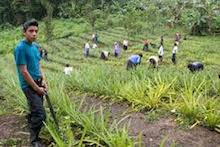 The USDA Foreign
Agricultural Service (FAS) has announced the availability of funding through
cost-reimbursable agreements for the Scientific Cooperation Research Program
(SCRP). The objective of SCRP is to reduce global poverty and hunger by
supporting applied scientific research, Extension, or education projects that
address challenges faced by small farmers in emerging economies. For the
purposes of this announcement, small farmers are those who own or lease less
than 124 acres of land. This land must be used to support subsistence or cash-crop
farming. The selected countries are Bangladesh, Ghana, Guatemala, Kenya, and countries
that are part of the East African Community Region and the Central America
Region. The deadline is June 4, so hurry! The USDA Foreign
Agricultural Service (FAS) has announced the availability of funding through
cost-reimbursable agreements for the Scientific Cooperation Research Program
(SCRP). The objective of SCRP is to reduce global poverty and hunger by
supporting applied scientific research, Extension, or education projects that
address challenges faced by small farmers in emerging economies. For the
purposes of this announcement, small farmers are those who own or lease less
than 124 acres of land. This land must be used to support subsistence or cash-crop
farming. The selected countries are Bangladesh, Ghana, Guatemala, Kenya, and countries
that are part of the East African Community Region and the Central America
Region. The deadline is June 4, so hurry!
|
Getting Them Prepared
5/17/2017 Source: Office of Communication Services, CTAHR 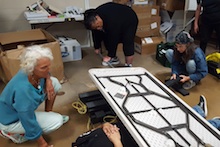 Three 4-H agents were among the eight adult instructors who completed
a comprehensive certification and training workshop for the Hawaii Youth Preparedness
Initiative, or MyPI Hawaii program last month on Maui. Hawai‘i is
the second state to undergo training under the national project pilot, developed
at Mississippi State University. 4-H agent Nancy Ooki will be the MyPI Hawaii State
Program Coordinator. Over the next two years, MyPI Hawaii will be offering an innovative
youth-preparedness program to approximately 125 teens across the state in which
trained adults instruct teenagers to complete the U.S. Department of Homeland Security/Federal
Emergency Management Agency-certified Teen CERT training, including CPR and AED
usage. They will also learn to use ham radio, NOAA weather radio, and smart phone
apps and social media for emergency preparedness. The teens then undertake a family
and community service project in which each they help to develop emergency supply
kits and emergency communication plans for their family, as well as for additional
families or households. Nancy says, “The applied knowledge, community service, and
leadership components make it an excellent connection to the 4-H program. I am excited
to share this with Maui County youth and across the state of Hawaii.” 4-H agents
Becky Settlage and Laura Kawamura will also offer the training on the Big
Island and Kaua‘i. Three 4-H agents were among the eight adult instructors who completed
a comprehensive certification and training workshop for the Hawaii Youth Preparedness
Initiative, or MyPI Hawaii program last month on Maui. Hawai‘i is
the second state to undergo training under the national project pilot, developed
at Mississippi State University. 4-H agent Nancy Ooki will be the MyPI Hawaii State
Program Coordinator. Over the next two years, MyPI Hawaii will be offering an innovative
youth-preparedness program to approximately 125 teens across the state in which
trained adults instruct teenagers to complete the U.S. Department of Homeland Security/Federal
Emergency Management Agency-certified Teen CERT training, including CPR and AED
usage. They will also learn to use ham radio, NOAA weather radio, and smart phone
apps and social media for emergency preparedness. The teens then undertake a family
and community service project in which each they help to develop emergency supply
kits and emergency communication plans for their family, as well as for additional
families or households. Nancy says, “The applied knowledge, community service, and
leadership components make it an excellent connection to the 4-H program. I am excited
to share this with Maui County youth and across the state of Hawaii.” 4-H agents
Becky Settlage and Laura Kawamura will also offer the training on the Big
Island and Kaua‘i.
|
CBB on the Web
5/11/2017 Source: Office of Communication Services, CTAHR 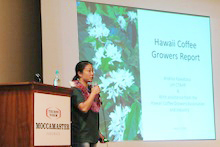 Congratulations to Extension agent Andrea Kawabata, who has
been selected by the Hawai‘i Association of County Agricultural Agents (HACAA)
as their candidate for the national organization (NACAA)’s Communications Award
in the Website category. Andrea serves as a key member of the multiagency team
working to halt the spread of CBB across the Hawaiian islands and help farmers
deal with this damaging coffee pest. As part of that outreach, she has created a
website which serves as a valuable educational resource to growers, researchers,
Extension faculty, students, and the general public. Congratulations to Extension agent Andrea Kawabata, who has
been selected by the Hawai‘i Association of County Agricultural Agents (HACAA)
as their candidate for the national organization (NACAA)’s Communications Award
in the Website category. Andrea serves as a key member of the multiagency team
working to halt the spread of CBB across the Hawaiian islands and help farmers
deal with this damaging coffee pest. As part of that outreach, she has created a
website which serves as a valuable educational resource to growers, researchers,
Extension faculty, students, and the general public.
|
Highlights of Glory
5/11/2017 Source: Office of Communication Services, CTAHR  If you’ve got a fever and the only cure is more 3MEP, you’re
in luck, because the highlights video for this inaugural competition—first aired
at the recent CTAHR Awards Banquet—has now been posted. Let it inspire you to get
involved with the competition next year, whether as a participant, judge, or
enthusiastic audience member. Check it out! If you’ve got a fever and the only cure is more 3MEP, you’re
in luck, because the highlights video for this inaugural competition—first aired
at the recent CTAHR Awards Banquet—has now been posted. Let it inspire you to get
involved with the competition next year, whether as a participant, judge, or
enthusiastic audience member. Check it out!
|
Herbavore
5/4/2017 Source: Office of Communication Services, CTAHR  BS and MS
alumnus Robert Saito (TPSS) is founder and CEO of Herbavore, a company that designs
and sells horticultural hand tools that can be tailored to the user and are of higher
quality than what’s presently on the market. He and his company recently got a
boost through the XLR8UH competition, when Herbavore was one of the eight teams
selected for the accelerator startup investment program. Congrats, Robert! BS and MS
alumnus Robert Saito (TPSS) is founder and CEO of Herbavore, a company that designs
and sells horticultural hand tools that can be tailored to the user and are of higher
quality than what’s presently on the market. He and his company recently got a
boost through the XLR8UH competition, when Herbavore was one of the eight teams
selected for the accelerator startup investment program. Congrats, Robert!
|
CTAHR at the Science Fair
5/4/2017 Source: Office of Communication Services, CTAHR 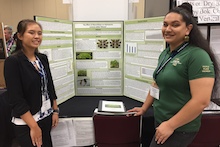 More than a
dozen CTAHR faculty, staff, and grad students volunteered as judges in the 60th
Hawaii State Science and Engineering Fair recently held at the Convention Center.
The volunteers were wowed by the accomplishments of Hawai‘i’s best and brightest
middle- and high-school students. Special thanks are due to those who mentored the
next generation of local scientists and engineers! With funding from USDA-NIFA,
and on behalf of all campuses in the UH system, CTAHR presented a $500 award to
Sunny Sakai, a twelfth-grader at Hilo High School (pictured here with CTAHR Alumni
Association president and TPSS grad student Kauahi Perez), for her excellent research
project, “The Effect of Mycorrhizae on Hydroponic Lactuca sativa ‘Manoa’.” Sunny’s
research showed increased yield in lettuce grown hydroponically when it is treated
with mycorrhizae, fungi that are usually associated with root–soil interactions.
They weren’t thought to be important in soilless agriculture, but her research clearly
showed that even here mycorrhizae play a critical role in the nutrient absorption
by roots. Sunny did her research under the mentorship of Hilo High School
teacher Nyra Dee and UH Hilo’s Dr. William Sakai, long-time CTAHR colleague and
former TPSS graduate faculty—and, coincidentally, Sunny’s grandfather! More than a
dozen CTAHR faculty, staff, and grad students volunteered as judges in the 60th
Hawaii State Science and Engineering Fair recently held at the Convention Center.
The volunteers were wowed by the accomplishments of Hawai‘i’s best and brightest
middle- and high-school students. Special thanks are due to those who mentored the
next generation of local scientists and engineers! With funding from USDA-NIFA,
and on behalf of all campuses in the UH system, CTAHR presented a $500 award to
Sunny Sakai, a twelfth-grader at Hilo High School (pictured here with CTAHR Alumni
Association president and TPSS grad student Kauahi Perez), for her excellent research
project, “The Effect of Mycorrhizae on Hydroponic Lactuca sativa ‘Manoa’.” Sunny’s
research showed increased yield in lettuce grown hydroponically when it is treated
with mycorrhizae, fungi that are usually associated with root–soil interactions.
They weren’t thought to be important in soilless agriculture, but her research clearly
showed that even here mycorrhizae play a critical role in the nutrient absorption
by roots. Sunny did her research under the mentorship of Hilo High School
teacher Nyra Dee and UH Hilo’s Dr. William Sakai, long-time CTAHR colleague and
former TPSS graduate faculty—and, coincidentally, Sunny’s grandfather!
|
Probiotics Pros
5/4/2017 Source: Office of Communication Services, CTAHR 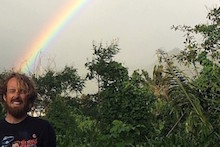 CTAHR
loves fermentation! An article in the Star-Advertiser is focused on the local
pickle and kimchee company Counter Culture and its co-founder Rob Barreca (pictured),
triumphantly successful graduate of the college’s GoFarm and Ag Incubator programs.
The article also quotes HNFAS MS student Surely Wallace about the care and
feeding of probiotic cultures and the important role they play in gut health.
Surely is the winner of this year’s CTAHR Student Research Symposium Best MS Student
Poster Presentation and CTAHR’s inaugural Three-Minute Elevator Pitch MS Student
Presentation. CTAHR
loves fermentation! An article in the Star-Advertiser is focused on the local
pickle and kimchee company Counter Culture and its co-founder Rob Barreca (pictured),
triumphantly successful graduate of the college’s GoFarm and Ag Incubator programs.
The article also quotes HNFAS MS student Surely Wallace about the care and
feeding of probiotic cultures and the important role they play in gut health.
Surely is the winner of this year’s CTAHR Student Research Symposium Best MS Student
Poster Presentation and CTAHR’s inaugural Three-Minute Elevator Pitch MS Student
Presentation.
|
Are You Secure?
5/4/2017 Source: Office of Communication Services, CTAHR  The Animal
Science/Nutritional Sciences graduate course in Food Systems (ANSC/FSHN 601) chose
food insecurity on campus as their class project. Understanding that fixing food
insecurity is not easy and would require University support, they decided to reach
out to other students to help get adequate information so the administration could
develop the right plan. They collected more that 800 student signatures on a petition
that suggested creating a survey and also made a video for President Lassner regarding
the #FeedtheDegree campaign. This project was a follow-up to a 2006 food-insecurity
study conducted by Pia Chaparro for her MS project, for which Joannie Dobbs
(HNFAS) was on the committee. Based on USDA’s criteria, at that time 24% of students
were found to be marginally food secure and 21% to be food insecure (15% had low
food security and 6% very low food security). However, there were only 408 responses
to this study, too few to develop a plan. Other universities and colleges nationwide
are now determining the food-security needs of their campuses, and four senators,
including Elizabeth Warren, have requested a study of food insecurity at American
colleges and universities. The Animal
Science/Nutritional Sciences graduate course in Food Systems (ANSC/FSHN 601) chose
food insecurity on campus as their class project. Understanding that fixing food
insecurity is not easy and would require University support, they decided to reach
out to other students to help get adequate information so the administration could
develop the right plan. They collected more that 800 student signatures on a petition
that suggested creating a survey and also made a video for President Lassner regarding
the #FeedtheDegree campaign. This project was a follow-up to a 2006 food-insecurity
study conducted by Pia Chaparro for her MS project, for which Joannie Dobbs
(HNFAS) was on the committee. Based on USDA’s criteria, at that time 24% of students
were found to be marginally food secure and 21% to be food insecure (15% had low
food security and 6% very low food security). However, there were only 408 responses
to this study, too few to develop a plan. Other universities and colleges nationwide
are now determining the food-security needs of their campuses, and four senators,
including Elizabeth Warren, have requested a study of food insecurity at American
colleges and universities.
|
Prevent the Parasite
5/4/2017 Source: Office of Communication Services, CTAHR 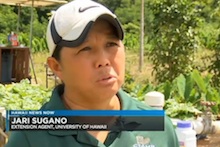 In the
wake of new cases of rat lungworm that have been discovered in the Islands,
Extension agent Jari Sugano was featured on Hawaii News Now offering some tips on
reducing the risk of the disease. Control the rats that carry the parasite with
traps and baits; control slugs and snails using beer, salt, or commercial
molluscicides; don’t eat produce that looks like it’s been eaten by snails; and
carefully rinse the produce you do eat. The Waimanalo Research Station also
offered a field day for backyard gardeners this past Saturday on things they
can do to stop the spread of the disease, and the Manoa Minute radio spots will
provide common-sense tips for the garden and the kitchen. In the
wake of new cases of rat lungworm that have been discovered in the Islands,
Extension agent Jari Sugano was featured on Hawaii News Now offering some tips on
reducing the risk of the disease. Control the rats that carry the parasite with
traps and baits; control slugs and snails using beer, salt, or commercial
molluscicides; don’t eat produce that looks like it’s been eaten by snails; and
carefully rinse the produce you do eat. The Waimanalo Research Station also
offered a field day for backyard gardeners this past Saturday on things they
can do to stop the spread of the disease, and the Manoa Minute radio spots will
provide common-sense tips for the garden and the kitchen.
|
April Showers
5/4/2017 Source: Office of Communication Services, CTAHR 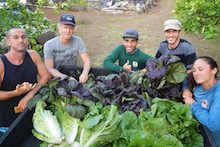 The beginning
farmer-training program GoFarm Hawai‘i has been showered with financial support
this month, receiving grants from the Hawai‘i Department of Agriculture, Hawai‘i
Department of Labor and Industrial Relations, and Kamehameha Schools. The funding
totals $377,680 in all—wow! And you know this highly successful and effective program
will make good use of the grants to keep creating new farmers for Hawai‘i! The beginning
farmer-training program GoFarm Hawai‘i has been showered with financial support
this month, receiving grants from the Hawai‘i Department of Agriculture, Hawai‘i
Department of Labor and Industrial Relations, and Kamehameha Schools. The funding
totals $377,680 in all—wow! And you know this highly successful and effective program
will make good use of the grants to keep creating new farmers for Hawai‘i!
|
Giving Good Advice
5/3/2017 Source: Office of Communication Services, CTAHR 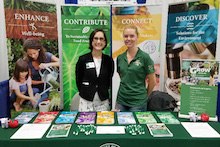 CTAHR’s academic
advisors engaged prospective students across the state during college fairs organized
by Hawaii Association for College Admission Counseling. They made new connections
with students at Kealakehe High School, Hawaii Preparatory Academy, Kamehameha Schools
Hawaii Campus, and Maui High School. High school outreach concluded at the National
Association for College Admission Counseling’s National College Fair at the Hawaii
Convention Center. Advisor Irene Morrow, peer advisor Hailey Pederson, and student
ambassador Kimber Troumbley greeted 5,000 prospective students at the CTAHR information
booth. They were also busy with transfer student recruitment efforts at UH Maui
College, Leeward Community College, and Windward Community College. CTAHR ASAO looks
forward to seeing a new crop of bright and talented students in the years to come! CTAHR’s academic
advisors engaged prospective students across the state during college fairs organized
by Hawaii Association for College Admission Counseling. They made new connections
with students at Kealakehe High School, Hawaii Preparatory Academy, Kamehameha Schools
Hawaii Campus, and Maui High School. High school outreach concluded at the National
Association for College Admission Counseling’s National College Fair at the Hawaii
Convention Center. Advisor Irene Morrow, peer advisor Hailey Pederson, and student
ambassador Kimber Troumbley greeted 5,000 prospective students at the CTAHR information
booth. They were also busy with transfer student recruitment efforts at UH Maui
College, Leeward Community College, and Windward Community College. CTAHR ASAO looks
forward to seeing a new crop of bright and talented students in the years to come!
|
Engineering a Great Program
5/3/2017 Source: Office of Communication Services, CTAHR 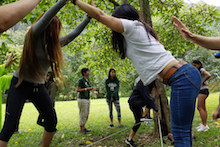 Twenty biological
engineering (BE) students and six faculty and staff from the BE program, along
with CTAHR’s ASAO, braved foreboding weather at the BE Undergraduate Team-Building
Event on Saturday, April 29. The group toured Kualoa Ranch in a rustic WWII-model
bus, learning the rich history and heritage of the Ranch. The group also took part
in challenging activities that honed teamwork, communication, and problem-solving
skills, followed by lunch and a facilitated evaluation of the BE academic program.
The students offered very insightful feedback on what they liked about the program
as well as possible ways to improve it. The Kualoa activity was successful and fun
in every respect, demonstrating that BE students are, indeed, among the best problem
solvers at the university and shattering the stereotype of engineers as reclusive
and sedentary! Mahalos go to the ASAO and USDA-NIFA for supporting the team-building
event and to Ryan Kurasaki for planning it, and to the BE students for their great
energy and engagement! Check out the pix’n’videos here. Twenty biological
engineering (BE) students and six faculty and staff from the BE program, along
with CTAHR’s ASAO, braved foreboding weather at the BE Undergraduate Team-Building
Event on Saturday, April 29. The group toured Kualoa Ranch in a rustic WWII-model
bus, learning the rich history and heritage of the Ranch. The group also took part
in challenging activities that honed teamwork, communication, and problem-solving
skills, followed by lunch and a facilitated evaluation of the BE academic program.
The students offered very insightful feedback on what they liked about the program
as well as possible ways to improve it. The Kualoa activity was successful and fun
in every respect, demonstrating that BE students are, indeed, among the best problem
solvers at the university and shattering the stereotype of engineers as reclusive
and sedentary! Mahalos go to the ASAO and USDA-NIFA for supporting the team-building
event and to Ryan Kurasaki for planning it, and to the BE students for their great
energy and engagement! Check out the pix’n’videos here.
|
April
Telling the Sophomores How It Is
4/26/2017 Source: Office of Communication Services, CTAHR 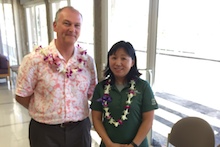 Extension veterinarian Jenee Odani (HNFAS) and Brent Sipes, professor in PEPS, shared their
undergraduate and faculty experiences with students during “Fraps with Faculty,”
an event sponsored by the Manoa
Sophomore Experience (MSE). MSE helps transitioning freshmen and sophomores
navigate academic requirements and campus life so they become engaged with our
campus community and invested in their college experience. Extension veterinarian Jenee Odani (HNFAS) and Brent Sipes, professor in PEPS, shared their
undergraduate and faculty experiences with students during “Fraps with Faculty,”
an event sponsored by the Manoa
Sophomore Experience (MSE). MSE helps transitioning freshmen and sophomores
navigate academic requirements and campus life so they become engaged with our
campus community and invested in their college experience.
|
“Paint Your Pet”
4/26/2017 Source: Office of Communication Services, CTAHR 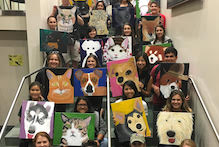 Last Friday, 30 current and potential ANSC
undergraduates and faculty participated in a focus group session to discuss possible
means of effective recruitment and retention in the Animal Sciences program.
The planning committee included Extension veterinarian Jenee Odani, Pre-Vet
Club adviser Douglas Vincent, and ANSC undergraduates Megan Williams and Tally
Nakamura. An art instructor from Honolulu’s Wine & Design led a painting
class with the participants, which resulted in these amazing portraits of a
wide variety of animals! This event was sponsored by the Office of Academic and
Student Affairs. Last Friday, 30 current and potential ANSC
undergraduates and faculty participated in a focus group session to discuss possible
means of effective recruitment and retention in the Animal Sciences program.
The planning committee included Extension veterinarian Jenee Odani, Pre-Vet
Club adviser Douglas Vincent, and ANSC undergraduates Megan Williams and Tally
Nakamura. An art instructor from Honolulu’s Wine & Design led a painting
class with the participants, which resulted in these amazing portraits of a
wide variety of animals! This event was sponsored by the Office of Academic and
Student Affairs.
|
Can-Do at Purdue!
4/26/2017 Source: Office of Communication Services, CTAHR 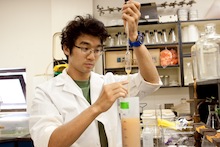 Dietetics alumnus Jordan
Oshiro, who’s now earning a PhD in food science at Purdue University, has been honored
with a graduate student award at the Experimental Biology meetings. He received
a Neolife/GNLD Phenolic Student
Research Award from the Plant Phenolics and Human Health Research Interest
Group, for his work on the “Impact of Piceatannol and Resveratrol on the
Proteomic Profile of Caenorhabditis
elegans.” Congratulations, Jordan! Dietetics alumnus Jordan
Oshiro, who’s now earning a PhD in food science at Purdue University, has been honored
with a graduate student award at the Experimental Biology meetings. He received
a Neolife/GNLD Phenolic Student
Research Award from the Plant Phenolics and Human Health Research Interest
Group, for his work on the “Impact of Piceatannol and Resveratrol on the
Proteomic Profile of Caenorhabditis
elegans.” Congratulations, Jordan!
|
Jeepers Peepers!
4/19/2017 Source: Office of Communication Services, CTAHR 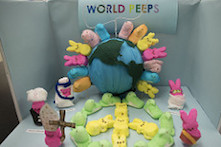 PEPS’ annual Peeps Diorama Competition drew eight creative
entries, using marshmallow characters to illustrate events and pop-cultural concepts from “Pokemon
Peeps” and “Wild Peepachu” to the viral visions of a HNFAS cat lady. Winner of
the juried competition was an OCS/ASAO team effort, “Hokuleia Visits Easter
Island.” Second place was awarded to a Korean Peninsula nuclear meltdown titled
“I Have One, You Have One, Let’s Play Together,” while Honorable Mention went
to the evolutionary “Peep Queen Hypothesis.” The online audience-choice voting
weighed in with hopeful views of the future: the run-away lead (we won’t ask
about voter fraud) went to the PEPS department office’s entry, “World Peeps,”
with “Peeps March on Washington” coming in second. View the entries here,
and start planning your 2018 entry! PEPS’ annual Peeps Diorama Competition drew eight creative
entries, using marshmallow characters to illustrate events and pop-cultural concepts from “Pokemon
Peeps” and “Wild Peepachu” to the viral visions of a HNFAS cat lady. Winner of
the juried competition was an OCS/ASAO team effort, “Hokuleia Visits Easter
Island.” Second place was awarded to a Korean Peninsula nuclear meltdown titled
“I Have One, You Have One, Let’s Play Together,” while Honorable Mention went
to the evolutionary “Peep Queen Hypothesis.” The online audience-choice voting
weighed in with hopeful views of the future: the run-away lead (we won’t ask
about voter fraud) went to the PEPS department office’s entry, “World Peeps,”
with “Peeps March on Washington” coming in second. View the entries here,
and start planning your 2018 entry!
|
Science for All
4/6/2017 Source: Office of Communication Services, CTAHR  UH Manoa’s faculty, students, and staff will be participating
in the International March for Science on Earth Day, April 22. This
event is a celebration of the tremendous impact that science has had and continues
to have in terms of enriching and preserving life, sustaining our communities,
and protecting our environment. As one of the nation’s premier public research
universities, and as a land-grant, sea-grant, space-grant, and sun-grant
university, the University of Hawai’i at Manoa is uniquely positioned to
lead, and anyone who wishes to participate in the events of the day is invited
to do so. UH Manoa’s faculty, students, and staff will be participating
in the International March for Science on Earth Day, April 22. This
event is a celebration of the tremendous impact that science has had and continues
to have in terms of enriching and preserving life, sustaining our communities,
and protecting our environment. As one of the nation’s premier public research
universities, and as a land-grant, sea-grant, space-grant, and sun-grant
university, the University of Hawai’i at Manoa is uniquely positioned to
lead, and anyone who wishes to participate in the events of the day is invited
to do so.
|
March
Diving for Success
3/29/2017 Source: Office of Communication Services, CTAHR  Associate Dean Ken Grace had a “Deep Dive Conversation” onstage
with Meli James, XLR8UH program director, at the InnovateUH Showcase at the UH
Cancer Center last week, at which he talked about big needs and hot trends in
agriculture, food systems, and natural resource management, and the amazing
work of CTAHR's faculty. At the Showcase, UH inventors and entrepreneurs had an
opportunity to pitch their latest discoveries to an appreciative crowd of
investors and fellow scientists at the event. The XLR8UH program is open to UH
faculty, staff, students, and alumni with an interest in commercializing their
innovative ideas—get more information and apply here! Associate Dean Ken Grace had a “Deep Dive Conversation” onstage
with Meli James, XLR8UH program director, at the InnovateUH Showcase at the UH
Cancer Center last week, at which he talked about big needs and hot trends in
agriculture, food systems, and natural resource management, and the amazing
work of CTAHR's faculty. At the Showcase, UH inventors and entrepreneurs had an
opportunity to pitch their latest discoveries to an appreciative crowd of
investors and fellow scientists at the event. The XLR8UH program is open to UH
faculty, staff, students, and alumni with an interest in commercializing their
innovative ideas—get more information and apply here!
|
Fight the Itch
3/29/2017 Source: Office of Communication Services, CTAHR 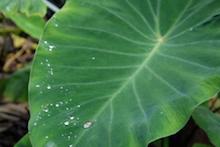 Alan Titchenal and Joannie Dobbs (both HNFAS) gave a
shout-out to colleague Bob Paull (TPSS) in their Health Options column in the Sunday
Star-Advertiser. The article, “Varied Diet Offsets Harm From Natural Toxins,”
corrects a longstanding misapprehension about why taro can’t be eaten raw,
explaining, “Anyone who has tried it will describe the dreaded ‘taro itch’ that
feels like something is really wrong in the back of your mouth and throat. For
a long time people thought this was caused by microscopic spiky-looking calcium
oxalate crystals in the plant. However, cooking does not change these much, and
based on research by Dr. Robert Paull and colleagues at the University of
Hawaii at Manoa, the ‘itch’ is caused by an offending protein that, unlike the
oxalate crystals, is altered in cooking.” Good to know! Alan Titchenal and Joannie Dobbs (both HNFAS) gave a
shout-out to colleague Bob Paull (TPSS) in their Health Options column in the Sunday
Star-Advertiser. The article, “Varied Diet Offsets Harm From Natural Toxins,”
corrects a longstanding misapprehension about why taro can’t be eaten raw,
explaining, “Anyone who has tried it will describe the dreaded ‘taro itch’ that
feels like something is really wrong in the back of your mouth and throat. For
a long time people thought this was caused by microscopic spiky-looking calcium
oxalate crystals in the plant. However, cooking does not change these much, and
based on research by Dr. Robert Paull and colleagues at the University of
Hawaii at Manoa, the ‘itch’ is caused by an offending protein that, unlike the
oxalate crystals, is altered in cooking.” Good to know!
|
Vaya a Mexico
3/29/2017 Source: Office of Communication Services, CTAHR 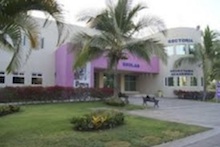 The
General Coordination for Cooperation and Internationalization (GCCI) at the
University of Guadalajara (UDG) is offering a Summer Spanish-Language Program for
both undergraduate and graduate students at schools that are members of the Association of Public
Land-grant Universities (APLU), as UH is. The program, which runs June
23–July 28, consists
of 5 weeks of Spanish instruction, 20 hours of Mexican History and Culture, 20
hours of a mix of reading and oral expression workshops, and ample 1-on-1
conversation activities with local students. It will take place on two
university campuses, the University Campus of Economic and Managerial Science
and the University Campus of the Coast at UDG. The program fee is $2,500 USD, covering
tuition, room, board, and transportation to and from the airport in Guadalajara,
but UDG is offering
50% scholarships to the first 100 students. With this
scholarship, the cost would be $1,250. The contact person for the program at the
UDG is Alonso Ramírez Ruíz (alonsor@cgci.udg.mx or [52] (33) 3630 9890
ext. 12905). The
General Coordination for Cooperation and Internationalization (GCCI) at the
University of Guadalajara (UDG) is offering a Summer Spanish-Language Program for
both undergraduate and graduate students at schools that are members of the Association of Public
Land-grant Universities (APLU), as UH is. The program, which runs June
23–July 28, consists
of 5 weeks of Spanish instruction, 20 hours of Mexican History and Culture, 20
hours of a mix of reading and oral expression workshops, and ample 1-on-1
conversation activities with local students. It will take place on two
university campuses, the University Campus of Economic and Managerial Science
and the University Campus of the Coast at UDG. The program fee is $2,500 USD, covering
tuition, room, board, and transportation to and from the airport in Guadalajara,
but UDG is offering
50% scholarships to the first 100 students. With this
scholarship, the cost would be $1,250. The contact person for the program at the
UDG is Alonso Ramírez Ruíz (alonsor@cgci.udg.mx or [52] (33) 3630 9890
ext. 12905).
|
It’s a Maize, Maize World
3/23/2017 Source: Office of Communication Services, CTAHR 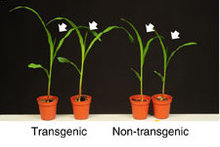 Michael Muszynski (TPSS) is a co-author of a paper on maize
genetics recently published in Nature Communications. Mike’s lab, including his
graduate student Aimee Uyehara, studies the basic molecular mechanisms
regulating growth in plants, and they use maize (corn) as the model system as
it has many genetic and genomics tools. They collaborate with a maize group led
by Dirk Inze and Hilde Nelissen at the VIB in Ghent Belgium, who led the study.
Their work has characterized a maize gene that significantly increases plant
growth and seed yield in maize. Mike’s lab led the growth and yield studies in
the U.S., and they continue to work with this group to understand growth-control
mechanisms, identify genes affecting growth and yield, and test these genes to
see if they improve agronomic performance. This type of research is important, since
crop growth and yield decline under extremes in weather, which are becoming
more common due to climate change. Michael Muszynski (TPSS) is a co-author of a paper on maize
genetics recently published in Nature Communications. Mike’s lab, including his
graduate student Aimee Uyehara, studies the basic molecular mechanisms
regulating growth in plants, and they use maize (corn) as the model system as
it has many genetic and genomics tools. They collaborate with a maize group led
by Dirk Inze and Hilde Nelissen at the VIB in Ghent Belgium, who led the study.
Their work has characterized a maize gene that significantly increases plant
growth and seed yield in maize. Mike’s lab led the growth and yield studies in
the U.S., and they continue to work with this group to understand growth-control
mechanisms, identify genes affecting growth and yield, and test these genes to
see if they improve agronomic performance. This type of research is important, since
crop growth and yield decline under extremes in weather, which are becoming
more common due to climate change.
|
On-Campus Circles of Life
3/23/2017 Source: Office of Communication Services, CTAHR 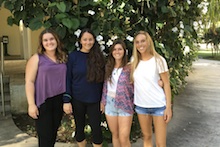 The TPSS 491 Special Topics in Sustainability students have
been awarded $5000 for a project to compost food and green waste on campus to
grow veggies for dining halls under President Lassner’s Green Initiative. Brian
Turano will be their faculty advisor. Pictured left to right are Mahealani
Wilson, Shaina Epstein, Laura Biles, and Madeleine Gumbrecht; not pictured, but
part of the team, is Tyler Jewel. The Student Organic Farm Training
(SOFT) program has also been awarded a Green Project Implementation
Award of $10,000 from the Johnson Controls
for their “Sustainable Food Production” project, a sustainable food
system on the UHM campus that repurposes food waste for food production.
Congratulations—and mahalo—to both groups! The TPSS 491 Special Topics in Sustainability students have
been awarded $5000 for a project to compost food and green waste on campus to
grow veggies for dining halls under President Lassner’s Green Initiative. Brian
Turano will be their faculty advisor. Pictured left to right are Mahealani
Wilson, Shaina Epstein, Laura Biles, and Madeleine Gumbrecht; not pictured, but
part of the team, is Tyler Jewel. The Student Organic Farm Training
(SOFT) program has also been awarded a Green Project Implementation
Award of $10,000 from the Johnson Controls
for their “Sustainable Food Production” project, a sustainable food
system on the UHM campus that repurposes food waste for food production.
Congratulations—and mahalo—to both groups!
|
Getting Ready for the Season
3/23/2017 Source: Office of Communication Services, CTAHR 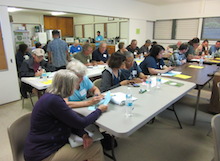 From January to
March, Andrea Kawabata hosted 11 (!!!) CBB Integrated Pest Management workshops
on Maui and the Big Island to prepare coffee growers for controlling CBB for
the new season. Presentations were given by representatives from CTAHR, HDOA,
SHAC, and USDA PBARC. The workshops included updates on CBB research and the
CBB IPM recommendations as well as information on current Beauveria subsidy programs that are available to growers. Farmers
were also able to practice a little math and make their spray decision skills
during the workshop’s sampling exercise (pictured). Each farm was provided a
take-home CBB recordkeeping binder to use as a resource towards better
understanding CBB activity on their farm throughout this season and into the
next. From January to
March, Andrea Kawabata hosted 11 (!!!) CBB Integrated Pest Management workshops
on Maui and the Big Island to prepare coffee growers for controlling CBB for
the new season. Presentations were given by representatives from CTAHR, HDOA,
SHAC, and USDA PBARC. The workshops included updates on CBB research and the
CBB IPM recommendations as well as information on current Beauveria subsidy programs that are available to growers. Farmers
were also able to practice a little math and make their spray decision skills
during the workshop’s sampling exercise (pictured). Each farm was provided a
take-home CBB recordkeeping binder to use as a resource towards better
understanding CBB activity on their farm throughout this season and into the
next.
|
Engaging Dads
3/23/2017 Source: Office of Communication Services, CTAHR  Selva
Lewin-Bizan (FCS), in collaboration with Maui Family Support Services, is
inaugurating a new project to deliver parenting ideas and support for
low-income fathers via text-messaging. Single, never-married, noncustodial
fathers face all sorts of barriers to positive emotional bonding and long-term
involvement in their children’s lives, and while there are programs that
promote the participation of fathers in the lives of their children, these
fathers are unlikely to participate in traditional interventions due to
competing demands on their time and resources. Selva has developed a 12-week
text-messaging intervention curriculum offering information about child
development, tips about ways fathers can become engaged with their children,
and encouragement of men in their roles as fathers, as well as pre- and
post-program assessments, focus groups, and brief questionnaires. The study is
funded by the Fatherhood Research and Practice Network. Selva
Lewin-Bizan (FCS), in collaboration with Maui Family Support Services, is
inaugurating a new project to deliver parenting ideas and support for
low-income fathers via text-messaging. Single, never-married, noncustodial
fathers face all sorts of barriers to positive emotional bonding and long-term
involvement in their children’s lives, and while there are programs that
promote the participation of fathers in the lives of their children, these
fathers are unlikely to participate in traditional interventions due to
competing demands on their time and resources. Selva has developed a 12-week
text-messaging intervention curriculum offering information about child
development, tips about ways fathers can become engaged with their children,
and encouragement of men in their roles as fathers, as well as pre- and
post-program assessments, focus groups, and brief questionnaires. The study is
funded by the Fatherhood Research and Practice Network.
|
Nutrition for the Body and the ‘Aina
3/23/2017 Source: Office of Communication Services, CTAHR 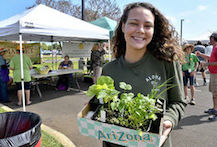 CTAHR Master
Gardeners and Extension agents are highlighted in a recent article in the
Garden Island. March is National Nutrition Month,
and CTAHR is helping to make sure it’s a month of fun and education. The MGs
set up a booth at the Kauai Community Market this past weekend, offering help
to home gardeners with plant-related questions; they will also be
hosting a presentation given by Extension agent Laura Kawamura and HDOA’s
Rachelle Bachran entitled “What in the World Is That Produce?” on Saturday,
March 23, at 10 a.m. and 11 a.m. at the Kauai Community Market at Kauai CC.
They’ll also be participating in the Garden Fair at KCC on April 8. And junior
Extension agent Joshua Silva and Kaua‘i MG Samantha Henriques will give another
presentation, “Garden with Soil, Plant-derived Pots,” on April 22, which will
show how to make garden pots using soil, compost, and peat moss. This is
nutrition the fun way! CTAHR Master
Gardeners and Extension agents are highlighted in a recent article in the
Garden Island. March is National Nutrition Month,
and CTAHR is helping to make sure it’s a month of fun and education. The MGs
set up a booth at the Kauai Community Market this past weekend, offering help
to home gardeners with plant-related questions; they will also be
hosting a presentation given by Extension agent Laura Kawamura and HDOA’s
Rachelle Bachran entitled “What in the World Is That Produce?” on Saturday,
March 23, at 10 a.m. and 11 a.m. at the Kauai Community Market at Kauai CC.
They’ll also be participating in the Garden Fair at KCC on April 8. And junior
Extension agent Joshua Silva and Kaua‘i MG Samantha Henriques will give another
presentation, “Garden with Soil, Plant-derived Pots,” on April 22, which will
show how to make garden pots using soil, compost, and peat moss. This is
nutrition the fun way!
|
Have Maize, Will Travel
3/22/2017 Source: Office of Communication Services, CTAHR 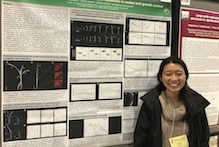 Grad student Aimee Uyehara (MS, TPSS), mentored by Michael
Muszynski, was awarded a MaGNET (Maize
Genetics Network Enhancement
via Travel) Award to
attend the 59th Maize Genetics Conference
held in St. Louis, Missouri, from March 9 to 12. This support allowed Aimee to
travel to her first professional
research conference, where she presented both a poster on her MS thesis
research and a short talk summarizing the entire lab’s research progress at a “pre-meeting”
for researchers focused on maize developmental genetics. Both her short-talk
and poster were well received by the conference researchers, and she made many
new professional connections with maize research faculty at top-ranked
universities. Not to mention, Aimee experienced a real Midwest snowfall for the
first time! Grad student Aimee Uyehara (MS, TPSS), mentored by Michael
Muszynski, was awarded a MaGNET (Maize
Genetics Network Enhancement
via Travel) Award to
attend the 59th Maize Genetics Conference
held in St. Louis, Missouri, from March 9 to 12. This support allowed Aimee to
travel to her first professional
research conference, where she presented both a poster on her MS thesis
research and a short talk summarizing the entire lab’s research progress at a “pre-meeting”
for researchers focused on maize developmental genetics. Both her short-talk
and poster were well received by the conference researchers, and she made many
new professional connections with maize research faculty at top-ranked
universities. Not to mention, Aimee experienced a real Midwest snowfall for the
first time!
|
Teaching Sustainability
3/22/2017 Source: Office of Communication Services, CTAHR 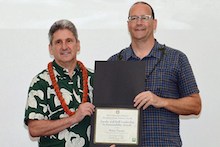 Brian Turano (TPSS) has been given a President’s Leadership in Sustainability
Award, which is given to staff and faculty who demonstrate leadership in
sustainability-related activities. He is honored for pioneering the development
of a sustainability curriculum, one which will extend the ideal of sustainability and the practical tools to bring it to life, to the next generation. Brian Turano (TPSS) has been given a President’s Leadership in Sustainability
Award, which is given to staff and faculty who demonstrate leadership in
sustainability-related activities. He is honored for pioneering the development
of a sustainability curriculum, one which will extend the ideal of sustainability and the practical tools to bring it to life, to the next generation.
|
Help Where It’s Needed
3/22/2017 Source: Office of Communication Services, CTAHR 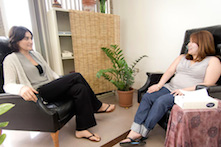 Feeling overwhelmed, or just want someone to talk to? The Counseling
and Student Development Center (CSDC) at QLC 312 offers mental health and
wellness services for all UHM students. They offer personal counseling, couples
and group counseling, assessment-based career counseling, peer fellow support services,
psychiatric consultation, and emergency/crisis response, helping students meet
their emotional, academic, career, and personal goals. They also have therapy
groups: Healthy Relationships Group, Multicultural Women’s, Grad/Older than Traditional
Age Students Co-ed, Mindfulness-Based Cognitive Therapy, and Pride Process
(LGBTQI+). They also offer drop-in workshops on Guided Mindfulness, Meditation,
and Anxiety/Stress Management. Students are encouraged to call 956-7927 to
schedule an appointment or for more information on programs and services, but
the CSDC also welcomes walk-ins. You don’t have to do it alone! Feeling overwhelmed, or just want someone to talk to? The Counseling
and Student Development Center (CSDC) at QLC 312 offers mental health and
wellness services for all UHM students. They offer personal counseling, couples
and group counseling, assessment-based career counseling, peer fellow support services,
psychiatric consultation, and emergency/crisis response, helping students meet
their emotional, academic, career, and personal goals. They also have therapy
groups: Healthy Relationships Group, Multicultural Women’s, Grad/Older than Traditional
Age Students Co-ed, Mindfulness-Based Cognitive Therapy, and Pride Process
(LGBTQI+). They also offer drop-in workshops on Guided Mindfulness, Meditation,
and Anxiety/Stress Management. Students are encouraged to call 956-7927 to
schedule an appointment or for more information on programs and services, but
the CSDC also welcomes walk-ins. You don’t have to do it alone!
|
Hospitality on the Garden Isle
3/22/2017 Source: Office of Communication Services, CTAHR 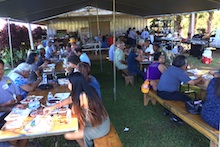 Russell Messing, Joshua Silva, and the Kaua‘i
Agricultural Research Center hosted the spring general membership meeting of
the Kauai County Farm Bureau last weekend. About 50 local farmers gathered to
talk story, compare notes, and discuss upcoming events and agriculture-related
bills pending at the State Legislature (including funding for CTAHR Extension
agents!). Attendees enjoyed grilled beef donated by Makaweli Ranch, java from
Moloa'a Bay Coffee, and a variety of Kaua‘i-grown vegetables from local farms.
Many people commented on the fine upkeep of the research station. CTAHR
continues to play a central role in the tight agricultural community on Kaua‘i! Russell Messing, Joshua Silva, and the Kaua‘i
Agricultural Research Center hosted the spring general membership meeting of
the Kauai County Farm Bureau last weekend. About 50 local farmers gathered to
talk story, compare notes, and discuss upcoming events and agriculture-related
bills pending at the State Legislature (including funding for CTAHR Extension
agents!). Attendees enjoyed grilled beef donated by Makaweli Ranch, java from
Moloa'a Bay Coffee, and a variety of Kaua‘i-grown vegetables from local farms.
Many people commented on the fine upkeep of the research station. CTAHR
continues to play a central role in the tight agricultural community on Kaua‘i!
|
Professional Grade
3/15/2017 Source: Office of Communication Services, CTAHR 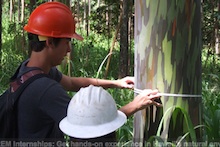 NREM’s got options
for everyone, and now it’s got the degree titles to prove it! The department is
altering the name of one of its master’s degrees to reflect its professional
focus: the Plan B Master of Science in Natural Resources and Environmental
Management—the professional, non-thesis option—will now be a Master of
Environmental Management (MEM). In keeping with its professional focus, this
degree requires a practicum or internship providing real-world experience. Plan
A, the academic option, which requires students to do research and present
their findings in a thesis, will remain an MS in Natural Resources and
Environmental Management, as will Plan C, which incorporates exceptional
incoming students’ previous professional experience. Proponents of the
alteration believe that this name change will not only make graduates more
competitive in the job market, by providing them with a degree title that
clearly describes their preparation as professional in environmental
management; it will also attract more students who are looking for precisely
that focus. NREM’s got options
for everyone, and now it’s got the degree titles to prove it! The department is
altering the name of one of its master’s degrees to reflect its professional
focus: the Plan B Master of Science in Natural Resources and Environmental
Management—the professional, non-thesis option—will now be a Master of
Environmental Management (MEM). In keeping with its professional focus, this
degree requires a practicum or internship providing real-world experience. Plan
A, the academic option, which requires students to do research and present
their findings in a thesis, will remain an MS in Natural Resources and
Environmental Management, as will Plan C, which incorporates exceptional
incoming students’ previous professional experience. Proponents of the
alteration believe that this name change will not only make graduates more
competitive in the job market, by providing them with a degree title that
clearly describes their preparation as professional in environmental
management; it will also attract more students who are looking for precisely
that focus.
|
Connecting the Dots in DC
3/15/2017 Source: Office of Communication Services, CTAHR 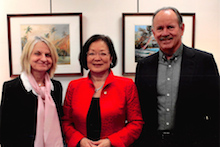 Dean Novotny and
Hawai‘i CARET delegate John Morgan, the president of Kualoa Ranch, visited with
Senator Mazie Hirono while attending the 35th Anniversary CARET/AHS meeting.
This year's theme was Connecting the Dots by Helping Others Tell Our Food and
Ag Story. The meeting was held in early March and brought together CARET/AHS
members to Washington, DC, to carry the 2018 budget recommendations of the
Board on Agriculture Assembly along with CTAHR's initiatives to the First
Session of the 115th Congress. In addition to Senator Hirono's office, they
visited Senator Schatz's office and the offices of Representatives Tulsi Gabbard
and Colleen Hanabusa. Dean Novotny and
Hawai‘i CARET delegate John Morgan, the president of Kualoa Ranch, visited with
Senator Mazie Hirono while attending the 35th Anniversary CARET/AHS meeting.
This year's theme was Connecting the Dots by Helping Others Tell Our Food and
Ag Story. The meeting was held in early March and brought together CARET/AHS
members to Washington, DC, to carry the 2018 budget recommendations of the
Board on Agriculture Assembly along with CTAHR's initiatives to the First
Session of the 115th Congress. In addition to Senator Hirono's office, they
visited Senator Schatz's office and the offices of Representatives Tulsi Gabbard
and Colleen Hanabusa.
|
Fertile Ground
3/15/2017 Source: Office of Communication Services, CTAHR 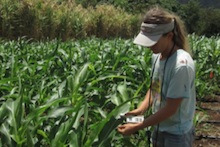 The
Radovich lab, including grad student Tia Silvasy and her corn (pictured),
was featured in Western SARE's 2016 annual report. The article notes that the
Western SARE conference held in Hawai‘i highlighted the importance of using
local inputs to create fertilizers rather than relying on imports, leading Ted
Radovich to research them in greater depth. He explains in the story that
commercial green-waste composts, rendered animal products, and invasive algae
from coral reefs are possibilities. He created a project to test a variety of
locally sourced inputs and discovered that they can increase crop yield and
quality and also that some former problems that were keeping local fertilizers
from being widely used are being solved. The
Radovich lab, including grad student Tia Silvasy and her corn (pictured),
was featured in Western SARE's 2016 annual report. The article notes that the
Western SARE conference held in Hawai‘i highlighted the importance of using
local inputs to create fertilizers rather than relying on imports, leading Ted
Radovich to research them in greater depth. He explains in the story that
commercial green-waste composts, rendered animal products, and invasive algae
from coral reefs are possibilities. He created a project to test a variety of
locally sourced inputs and discovered that they can increase crop yield and
quality and also that some former problems that were keeping local fertilizers
from being widely used are being solved.
|
How Not to Get Invaded
3/15/2017 Source: Office of Communication Services, CTAHR  Associate Dean Ken Grace represented the college at the governor’s proclamation of
Invasive Species Week and the Hawaii Invasive Species Council’s awards
ceremony, pictured here with a (not-so-) Little Fire Ant
and a Coconut Rhinoceros Beetle. As one way of raising awareness of the
potentially devastating impact of invasive species, the Council has sponsored a
series of videos, Line in the Sand,
about particularly damaging pests, to which CTAHR faculty and alumni have also
contributed. Mike Melzer (PEPS) lends his expertise to the video on Coconut
Rhinoceros Beetle, as does HDOA biocontrol expert—and former PEPS Entomology
APT and grad student—Darcy Oishi. Extension forester JB Friday (NREM) discusses
Rapid ‘Ohi‘a Death, and CTAHR alumnus Neil Reimer, now retired from HDOA, gives
information on the Little Fire Ant. Check them out! Associate Dean Ken Grace represented the college at the governor’s proclamation of
Invasive Species Week and the Hawaii Invasive Species Council’s awards
ceremony, pictured here with a (not-so-) Little Fire Ant
and a Coconut Rhinoceros Beetle. As one way of raising awareness of the
potentially devastating impact of invasive species, the Council has sponsored a
series of videos, Line in the Sand,
about particularly damaging pests, to which CTAHR faculty and alumni have also
contributed. Mike Melzer (PEPS) lends his expertise to the video on Coconut
Rhinoceros Beetle, as does HDOA biocontrol expert—and former PEPS Entomology
APT and grad student—Darcy Oishi. Extension forester JB Friday (NREM) discusses
Rapid ‘Ohi‘a Death, and CTAHR alumnus Neil Reimer, now retired from HDOA, gives
information on the Little Fire Ant. Check them out!
|
Wearable History
3/9/2017 Source: Office of Communication Services, CTAHR 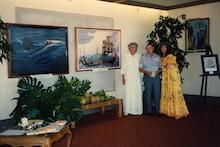 The
Costume Collection has received a donation of some historical as well as
elegant garments: Linda Sanford provided several of
her mother’s dresses, including a holoku and a qi pao that she had worn to a
party hosted by Doris Duke—plus photos from the event taken by a Time-Life photographer. Sanford characterizes
the clothing as examples of extraordinary work by Japanese dressmakers in
Honolulu from the 1930s through the 1950s. Also donated were garments worn when
she worked in Gov. Ariyoshi’s office between 1974 and 1986. Contact Shu Hwa Lin (FCS) at shulin@hawaii.edu to schedule a visit to the Collection to check them out—along with so many more of
Hawai‘i’s sartorial glories! The
Costume Collection has received a donation of some historical as well as
elegant garments: Linda Sanford provided several of
her mother’s dresses, including a holoku and a qi pao that she had worn to a
party hosted by Doris Duke—plus photos from the event taken by a Time-Life photographer. Sanford characterizes
the clothing as examples of extraordinary work by Japanese dressmakers in
Honolulu from the 1930s through the 1950s. Also donated were garments worn when
she worked in Gov. Ariyoshi’s office between 1974 and 1986. Contact Shu Hwa Lin (FCS) at shulin@hawaii.edu to schedule a visit to the Collection to check them out—along with so many more of
Hawai‘i’s sartorial glories!
|
February
ARCS Loves CTAHR
2/15/2017 Source: Office of Communication Services, CTAHR 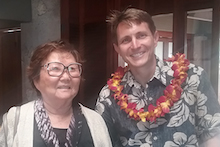 CTAHR
alumnus Will Haines was the featured speaker at the ARCS Foundation Honolulu
Chapter’s annual Heart of Gold Luncheon. Since launching the Pulelehua Project,
Will has established the Department of Land and Natural Resources
insect-breeding program at Kawainui Marsh to boost populations of rare and
endangered endemic arthropods, including the Kamehameha butterfly. In keeping
with the Valentine’s Day theme, his description of the state insects’ life
cycle included mating behavior (they get frisky in the evening). He also
described efforts to ensure survival of the Orangeblack Hawaiian damselfly,
which was designated as an endangered species last year. Will received the
Maybelle C. Roth ARCS Scholar Award in Conservation Biology in 2006 while
pursuing his PhD in PEPS. In the audience for his talk was Caroline Uehara,
pictured here with Will, whose husband, CTAHR soil scientist Goro Uehara, was
named an ARCS Scientist of the Year in 1983. CTAHR
alumnus Will Haines was the featured speaker at the ARCS Foundation Honolulu
Chapter’s annual Heart of Gold Luncheon. Since launching the Pulelehua Project,
Will has established the Department of Land and Natural Resources
insect-breeding program at Kawainui Marsh to boost populations of rare and
endangered endemic arthropods, including the Kamehameha butterfly. In keeping
with the Valentine’s Day theme, his description of the state insects’ life
cycle included mating behavior (they get frisky in the evening). He also
described efforts to ensure survival of the Orangeblack Hawaiian damselfly,
which was designated as an endangered species last year. Will received the
Maybelle C. Roth ARCS Scholar Award in Conservation Biology in 2006 while
pursuing his PhD in PEPS. In the audience for his talk was Caroline Uehara,
pictured here with Will, whose husband, CTAHR soil scientist Goro Uehara, was
named an ARCS Scientist of the Year in 1983.
|
Nature Index Loves UH
2/15/2017 Source: Office of Communication Services, CTAHR 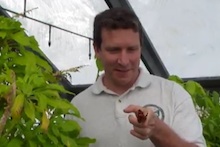 UH has
been ranked 12th
in earth and environmental sciences internationally among universities
according to Nature
Index, which rates institutions based on the number of research papers
published in Nature and other prestigious journals. Publications by NREM and MBBE researchers in the prestigious
Proceedings of the National Academy of Sciences (PNAS) contributed
to that ranking! The
UH video celebrating this achievement also mentions CTAHR as one of the units
contributing to this achievement and shows footage of Dan Rubinoff (PEPS)
working with Kamehameha butterflies and J.B. Friday (NREM) surveying forests
affected by Rapid ‘Ohi‘a Death. Check it out! UH has
been ranked 12th
in earth and environmental sciences internationally among universities
according to Nature
Index, which rates institutions based on the number of research papers
published in Nature and other prestigious journals. Publications by NREM and MBBE researchers in the prestigious
Proceedings of the National Academy of Sciences (PNAS) contributed
to that ranking! The
UH video celebrating this achievement also mentions CTAHR as one of the units
contributing to this achievement and shows footage of Dan Rubinoff (PEPS)
working with Kamehameha butterflies and J.B. Friday (NREM) surveying forests
affected by Rapid ‘Ohi‘a Death. Check it out!
|
Hearts of Gold, or Yellow, or Orange and Black…
2/8/2017 Source: Office of Communication Services, CTAHR 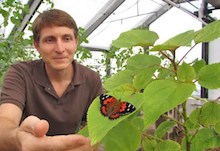 Will Haines (PEPS) will be the featured
speaker at ARCS Foundation Honolulu Chapter's annual Valentine’s Day Hearts of
Gold luncheon on Feb. 14. ARCS supports UHM graduate students in STEM fields,
and Will was a 2006 ARCS Scholar himself! He manages the captive breeding
program for rare and endangered Hawaiian insects for the Department of Land and
Natural Resources and continues to work with CTAHR’s Pulelehua Project. He will
talk about conservation work to protect the Kamehameha butterfly, the
orange-black Hawaiian damselfly, and yellow-faced bees. Check out the ARCS website
for more information. Will Haines (PEPS) will be the featured
speaker at ARCS Foundation Honolulu Chapter's annual Valentine’s Day Hearts of
Gold luncheon on Feb. 14. ARCS supports UHM graduate students in STEM fields,
and Will was a 2006 ARCS Scholar himself! He manages the captive breeding
program for rare and endangered Hawaiian insects for the Department of Land and
Natural Resources and continues to work with CTAHR’s Pulelehua Project. He will
talk about conservation work to protect the Kamehameha butterfly, the
orange-black Hawaiian damselfly, and yellow-faced bees. Check out the ARCS website
for more information.
|
Everyone Loves a Carnival
2/8/2017 Source: Office of Communication Services, CTAHR 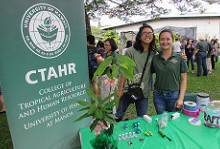 CTAHR held its fifth annual
carnival-themed Spring Event last Friday, when over 200 students, faculty, and
staff came out for free food, fun, and games. This year’s booths featured a Bug
Hunt, Fishbowl Toss, Ring Toss, and Rainbow Roulette Trivia, and the dunk booth
tradition triumphantly carried on, thanks to intrepid dunkees Lisa
Kitagawa-Akagi (ASAO), Jenee Odani (HNFAS), Dan Jenkins (MBBE), Mark Wright
(PEPS), and Interim Associate Dean Ania Wieczorek. Donations totaling more than
$150 supported CTAHR’s Biological Engineering Student Association! Mahalo to
Ryan Kurasaki for assisting with food arrangements, and special thanks to Janice
Uchida (TPSS) for donating potted plants for prizes. Mahalo goes to the Spring
Event student committee, scholarship recipient and student ambassador
volunteers, and ASAO for their time and dedication in making this a smooth and
successful event. Lastly, thanks go to everyone who attended and donated to
this year’s cause and made this year’s carnival another memorable CTAHR event! CTAHR held its fifth annual
carnival-themed Spring Event last Friday, when over 200 students, faculty, and
staff came out for free food, fun, and games. This year’s booths featured a Bug
Hunt, Fishbowl Toss, Ring Toss, and Rainbow Roulette Trivia, and the dunk booth
tradition triumphantly carried on, thanks to intrepid dunkees Lisa
Kitagawa-Akagi (ASAO), Jenee Odani (HNFAS), Dan Jenkins (MBBE), Mark Wright
(PEPS), and Interim Associate Dean Ania Wieczorek. Donations totaling more than
$150 supported CTAHR’s Biological Engineering Student Association! Mahalo to
Ryan Kurasaki for assisting with food arrangements, and special thanks to Janice
Uchida (TPSS) for donating potted plants for prizes. Mahalo goes to the Spring
Event student committee, scholarship recipient and student ambassador
volunteers, and ASAO for their time and dedication in making this a smooth and
successful event. Lastly, thanks go to everyone who attended and donated to
this year’s cause and made this year’s carnival another memorable CTAHR event!
|
Get the Arsenic Out
2/6/2017 Source: Office of Communication Services, CTAHR  CTAHR alumnus Liangjie Dong (MS MBBE ‘06), previous winner
of PACE’s Business Plan Competition, is in the news for his new invention, the
NanoNose Pitcher Filter System. Dong is now CEO of Mesofilter Inc., which has
just unveiled the first ceramic filter that reduces arsenic in water to at or
below levels recommended by the EPA and the World Health Organization (WHO). Dong first began working on
the technology that led to this breakthrough filtration system while at CTAHR. According
to the WHO, more than 200 million people globally are at risk of being
chronically exposed to arsenic in drinking water, which can lead to chronic
arsenic poisoning and some cancers. Way to go! CTAHR alumnus Liangjie Dong (MS MBBE ‘06), previous winner
of PACE’s Business Plan Competition, is in the news for his new invention, the
NanoNose Pitcher Filter System. Dong is now CEO of Mesofilter Inc., which has
just unveiled the first ceramic filter that reduces arsenic in water to at or
below levels recommended by the EPA and the World Health Organization (WHO). Dong first began working on
the technology that led to this breakthrough filtration system while at CTAHR. According
to the WHO, more than 200 million people globally are at risk of being
chronically exposed to arsenic in drinking water, which can lead to chronic
arsenic poisoning and some cancers. Way to go!
|
Sustaining Info
2/6/2017 Source: Office of Communication Services, CTAHR 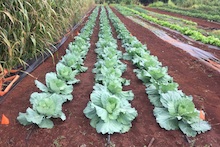 The latest issue of Hanai‘Ai, the newsletter of the SOAP
program, is out, offering lots of great news you can use about Extension variety
trials of flat-head cabbage (pictured), control of cabbage webworm on daikon, DIY
screenhouses for insect management, and cover crops and solarization
for nematode control. As always, the newsletter also includes a profile on a
local grower to provide tips and inspiration, and notice of events of interest
to the organic and sustainable growing community. Check it out today! The latest issue of Hanai‘Ai, the newsletter of the SOAP
program, is out, offering lots of great news you can use about Extension variety
trials of flat-head cabbage (pictured), control of cabbage webworm on daikon, DIY
screenhouses for insect management, and cover crops and solarization
for nematode control. As always, the newsletter also includes a profile on a
local grower to provide tips and inspiration, and notice of events of interest
to the organic and sustainable growing community. Check it out today!
|
Real Meal on the Table
2/6/2017 Source: Office of Communication Services, CTAHR  Jinan Banna, along with co-authors Lora Beth Brown and Rickelle Richards from BYU, recently published a paper in the Journal of Nutrition
Education and Behavior discussing the concept of a “real meal” and how it
can be deployed to help college students to eat more healthily. The paper, “College Students' Perceived Differences
Between the Terms Real Meal, Meal, and Snack,” explained the
results of a survey that was given to college students: the students considered
a
“real meal” something that was
nutritious and healthy and that met dietary recommendations, while a “meal” was
considered anything to eat. Telling students that they should be eating more
“real meals,” therefore, may be an easily understandable way of conveying nutrition
information and recommendations to them. Ingenious! Jinan Banna, along with co-authors Lora Beth Brown and Rickelle Richards from BYU, recently published a paper in the Journal of Nutrition
Education and Behavior discussing the concept of a “real meal” and how it
can be deployed to help college students to eat more healthily. The paper, “College Students' Perceived Differences
Between the Terms Real Meal, Meal, and Snack,” explained the
results of a survey that was given to college students: the students considered
a
“real meal” something that was
nutritious and healthy and that met dietary recommendations, while a “meal” was
considered anything to eat. Telling students that they should be eating more
“real meals,” therefore, may be an easily understandable way of conveying nutrition
information and recommendations to them. Ingenious!
|
January
This Summer, Just CHL
1/25/2017 Source: Office of Communication Services, CTAHR 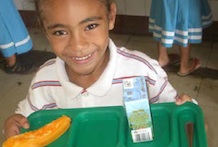 A preview
of courses offered through the Children’s Healthy Living (CHL) Summer Institute
is now available! Do you want to learn more about nutrition and child health, or
perhaps how to measure and evaluate child growth? Have you ever wondered why
nutrition needs vary across the lifespan, or how to prevent child obesity? Are
you interested in becoming a more culturally grounded health professional or
looking to develop your professional and technology tool kit? If so, check out
the courses offered in Summer Session 1 and 2! All are available online, providing
you the greatest flexibility in completing your coursework, and a majority of
the courses also meet UHM general education requirements. They’re open to anyone from within
or outside of the UH system. There are $1200 Merit
Scholarships available for freshman and sophomores, and over $500,000 in summer
2017 financial aid available for those who qualify. Find complete
details and applications for scholarships and
financial aid here. A preview
of courses offered through the Children’s Healthy Living (CHL) Summer Institute
is now available! Do you want to learn more about nutrition and child health, or
perhaps how to measure and evaluate child growth? Have you ever wondered why
nutrition needs vary across the lifespan, or how to prevent child obesity? Are
you interested in becoming a more culturally grounded health professional or
looking to develop your professional and technology tool kit? If so, check out
the courses offered in Summer Session 1 and 2! All are available online, providing
you the greatest flexibility in completing your coursework, and a majority of
the courses also meet UHM general education requirements. They’re open to anyone from within
or outside of the UH system. There are $1200 Merit
Scholarships available for freshman and sophomores, and over $500,000 in summer
2017 financial aid available for those who qualify. Find complete
details and applications for scholarships and
financial aid here.
|
A Great Opportunity in Child Health
1/4/2017 Source: Office of Communication Services, CTAHR  The
Child Health Assessment in the Pacific (CHAP) Undergraduate Summer Fellowship
Program is looking for undergraduate applicants from
UHM to participate in a summer training opportunity. Students enrolled in
programs such as nutrition, nursing, early childhood education, public health
and other degrees are encouraged to apply by February
15. The program will run from mid-May through mid-August. Fellows will receive
a $2,100 stipend, plus all travel, meal, and housing expenses for a 7-day
training opportunity, plus a scholarship to cover tuition and fees for 4
credits of coursework through the UH Outreach College, and the resources and
support to complete a mentored field experience related to diet or
anthropometry field assessment techniques for children. Check out this video and then see what previous fellows have done
on the CHAP YouTube Channel.
For more information, see CHAP’s Facebook page or email chapac@hawaii.edu. The
Child Health Assessment in the Pacific (CHAP) Undergraduate Summer Fellowship
Program is looking for undergraduate applicants from
UHM to participate in a summer training opportunity. Students enrolled in
programs such as nutrition, nursing, early childhood education, public health
and other degrees are encouraged to apply by February
15. The program will run from mid-May through mid-August. Fellows will receive
a $2,100 stipend, plus all travel, meal, and housing expenses for a 7-day
training opportunity, plus a scholarship to cover tuition and fees for 4
credits of coursework through the UH Outreach College, and the resources and
support to complete a mentored field experience related to diet or
anthropometry field assessment techniques for children. Check out this video and then see what previous fellows have done
on the CHAP YouTube Channel.
For more information, see CHAP’s Facebook page or email chapac@hawaii.edu.
|